








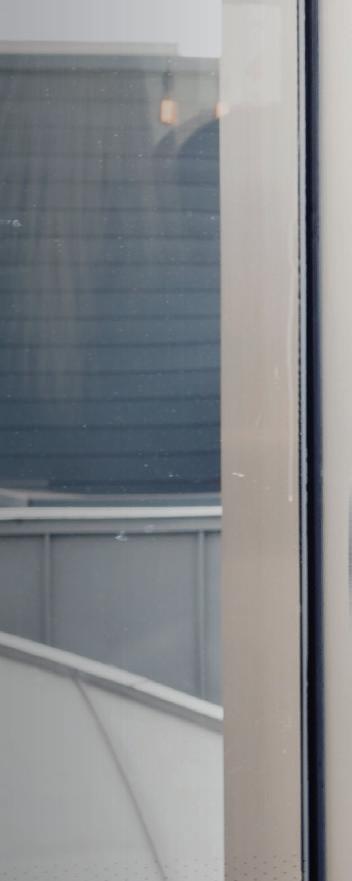








Confused about
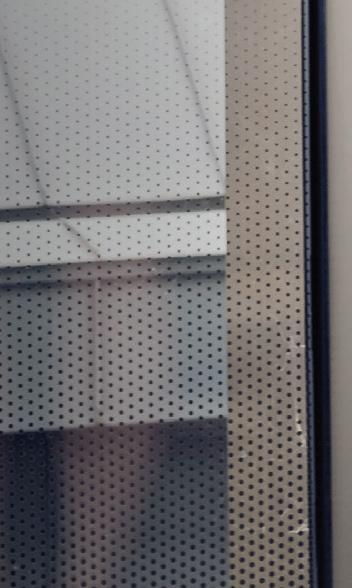


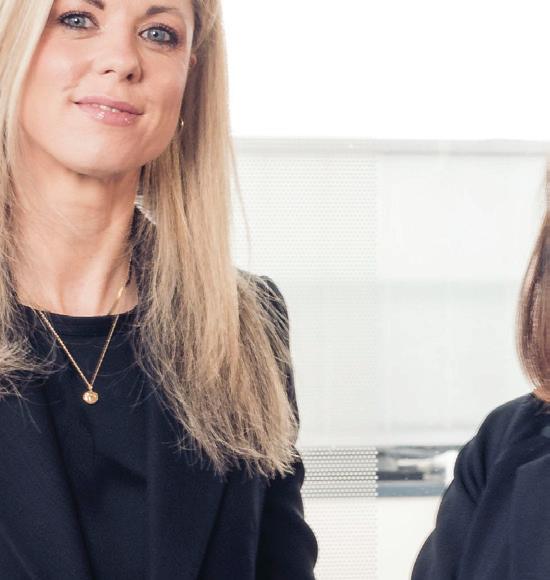




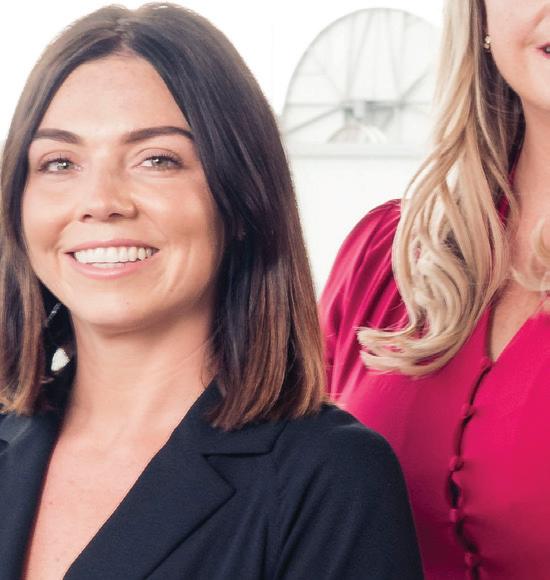

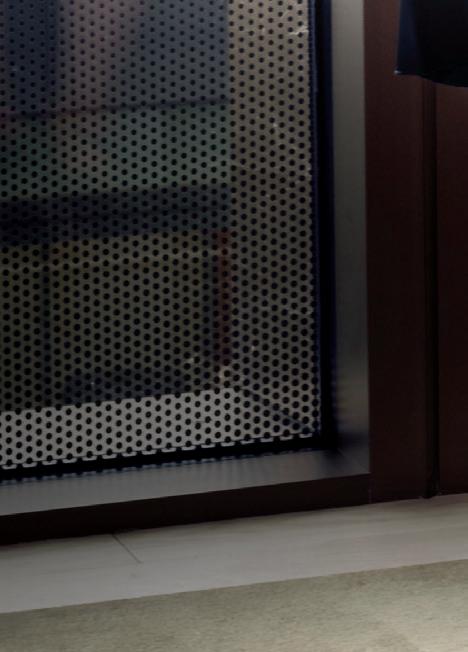





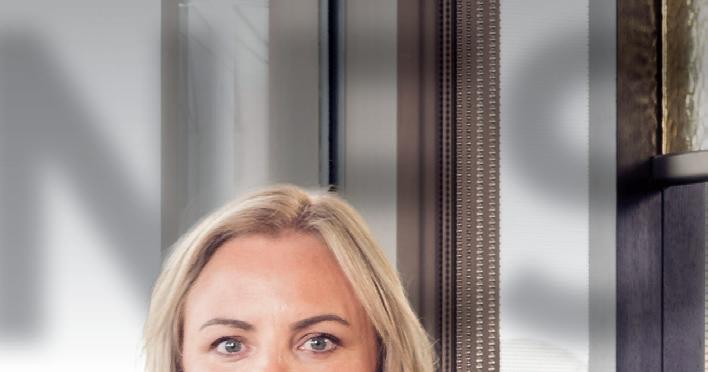

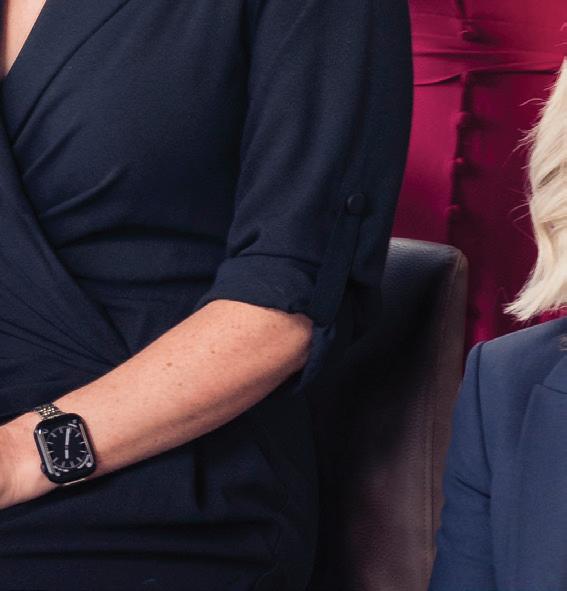









SMOOTH OPERATOR



AINE KENNEDY on the power of social media to make or break a brand

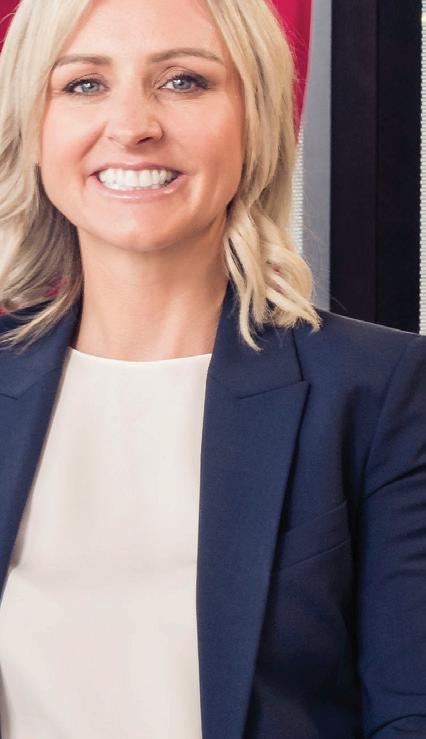


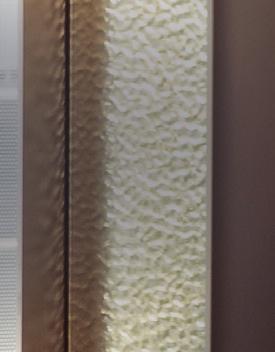




















Confused about































AINE KENNEDY on the power of social media to make or break a brand













































Editor: Denise Maguire
Creative Director: Jane Matthews
Editorial Assistant: Daniel Traynor (Chambers Ireland)
Designer: Lenny Rooney
Photography: iStock Photo
Infographics: www.flaticon.com
Production Executive: Nicole Ennis
Sales Director: Diarmaid Lennon
Managing Director: Gerry Tynan
Chairman: Diarmaid Lennon










Published by:
Ashville Media Group, Unit 55 Park West Road, Park West Industrial Park, D12 X9F9
Tel: +353 1 432 2200
Email: info@ashville.com
Web: www.ashville.com
On behalf of: Chambers Ireland, 11 St. Stephen’s Green, Dublin 2, D02 FY84
Tel: +353 1 400 4300
Email: info@chambers.ie Web: www.chambers.ie
All articles © Ashville Media Group 2025. No part of this publication may be reproduced, stored in a retrieval system or transmitted in any form or by any means without written permission from the publisher. Opinion and comments expressed herein are not necessarily those of Ashville Media or Chambers Ireland. ISSN 20093934















Start-up Central How it all started with Sean Armstrong, Construction Director at Energyfix








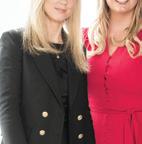











The consulting team at Grant Thornton Ireland is changing how leadership is defined



Aine Kennedy has created a product that helps her customer’s day run more smoothly





















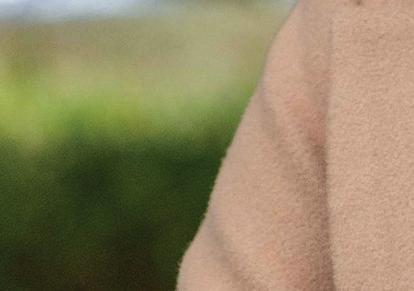















































































“We don’t provide o -theshelf solutions – they are built in a bespoke way to dig down and address our client’s requirements. Plus, they’re delivered by people who really care about making sure they provide what the client needs.”





































underpaid for the work that







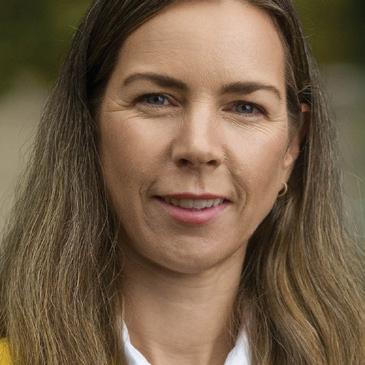






A new survey from SD Worx Ireland has revealed that one in five (21%) employees confess to misusing leave policies and taking absences without a valid reason. Almost half feel they are underpaid for the work that they do, 48% expect their team to face worsening talent shortages and 44% are currently looking for a new job.





















people strategies and provide employees with the support, development opportunities and

Eimear Byrne, Country Leader, SD Worx Ireland, said: “With 39% of respondents saying their manager struggles with e ective leadership, it’s clear that many employees feel they’re lacking valuable guidance and mentorship. As a result, we are now seeing a knock-on e ect with more people actively seeking to change jobs and widespread concerns about sta shortages, as well as underpayment. Now is the time to invest in people strategies and provide employees with the support, development opportunities and workplace culture they need to thrive.”

American approval
More than 95% of US multinationals have a positive view of Ireland as an investment location, according to a survey of American Chamber of Commerce Ireland members.


A survey by the Compliance Institute has shown that one in three organisations in Ireland’s financial services sector expect to encounter challenges when meeting digital content rules laid down by the new media regulator.
LEAD Network launched its first ever LEAD Network Ireland Chapter People of the Year Awards recently. The awards, which are open to all companies in the retail and consumer goods industry for nominations, will celebrate industry leaders who champion gender equality and equity in the workplace and include three categories – LEAD Network Ally of the Year, LEAD Network Mentor of the Year and LEAD Network Leader of the Year. Nominations are now open via LEAD Network Ireland Chapter’s LinkedIn page where peers can nominate a colleague, friend or any of their peers in the industry by answering a number of relevant questions. Winners will be announced at an event in September.
Bank of Ireland has launched a bespoke account opening service to support individuals relocating to Ireland for work, study or to return home. The new “Coming to Ireland” service aims to make the financial transition easier with a bank account that is set up and ready to use from the moment they arrive.
Key features of the ‘Coming to Ireland’ service include:
• Early application access – Customers can apply for their account up to 45 days before arriving in Ireland, allowing them to manage their finances from day one.
• Dedicated case manager – Each applicant is assigned a personal case manager who will contact them within 48 hours of submitting their application to guide them through the process.
The initiative also supports HR departments and recruitment agencies working with multinational companies, as well as third-level institutions welcoming international students.
A DataSolutions survey reveals that while 78% of tech companies have plans to achieve carbon neutrality, 65% have not yet measured their carbon footprint.
More than nine in 10 Irish businesses are using AI. That’s according to research from Gallagher in Ireland, which found that firms are using AI to improve customer service and to help detect fraudulent activity.


The Higher Education Authority (HEA) has opened its 2025 programme of higher education courses for applicants wishing to upskill or reskill in areas where job opportunities are growing. A total of 7,719 places are available across 249 courses delivered by 37 higher education institutes nationwide.
Last year funding into female-founded start-ups surged 120% to reach a record €230m, according to a TechIreland report published to coincide with International Women’s Day.
A record high in optimism levels amongst SMEs has dropped back to more average levels as high US tari announcements – and subsequent pauses – drive more uncertainty, according to a new survey by Linked Finance.
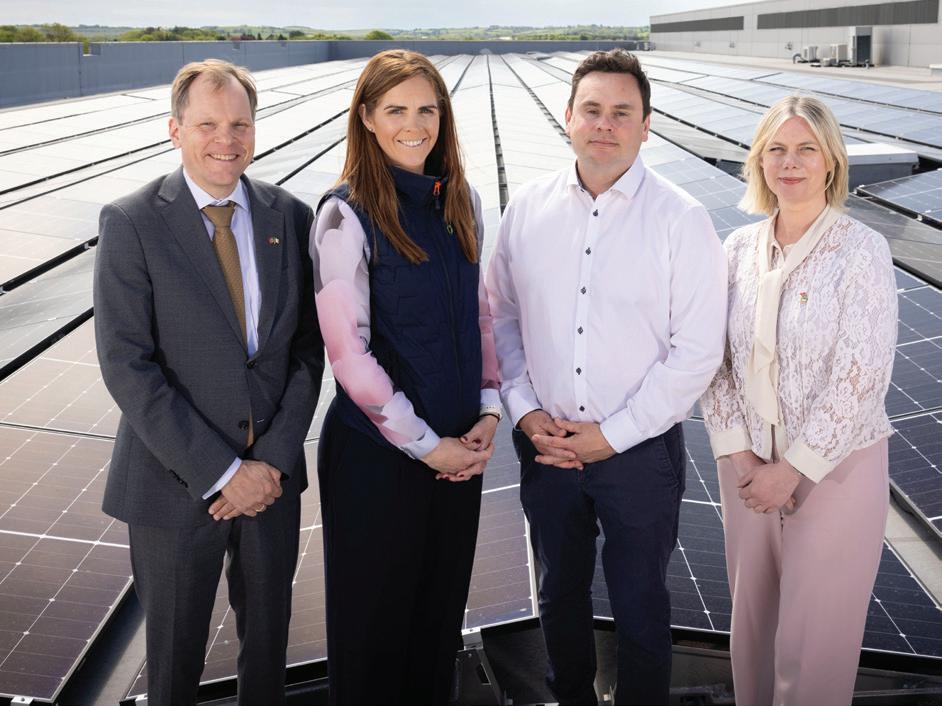
(l
New data published by Comreg has revealed that fibre-to-the-premises technology in the Irish market is now on a par with cable broadband subscribers for the first time.
Data from SurveyMonkey shows that a fifth of Irish businesses have faced the consequences of a GDPR-related fine or penalty and 19% have experienced an o icial warning or investigation by a Data Protection Authority.
Renewable energy provider MarVal Power has completed a major solar energy project for TINE Ireland Ltd, the Irish division of Norwegian dairy giant TINE, at its commercial premises in Mogeely, Co, Cork. The project will reduce the company’s carbon footprint by over 4,344 tons across the next two decades – the equivalent of planting 2,150 trees or avoiding 370 roundtrips from Cork to Oslo every year. Brian Glynn, General Manager at TINE’s Irish site, said the project would provide enormous benefits for the company, both now and in the future. “This investment demonstrates our long-term commitment to environmental responsibility here in Ireland. MarVal Power delivered a first-class installation that meets the needs of a complex, live site – and we’re already seeing the benefits.”

Climb Channel Solutions Ireland has opened a new HQ in Dublin, intended to support the wider group’s plans for Europe and Ireland. The distributor is also eyeing up expansion into new markets such as Asia-Pacific and considering further acquisitions. Located in the South County Business Park beside Leopardstown Racecourse, the newly renovated Dublin HQ allows for potential future team growth and will also be used for partner and vendor events. The distributor is also launching ‘The Skyward Project: Climb’s AI Partner Programme’, an initiative to help partners capitalise on the opportunities associated with AI. The new programme includes the Climb AI Academy to help partners gain a foothold in the booming market.
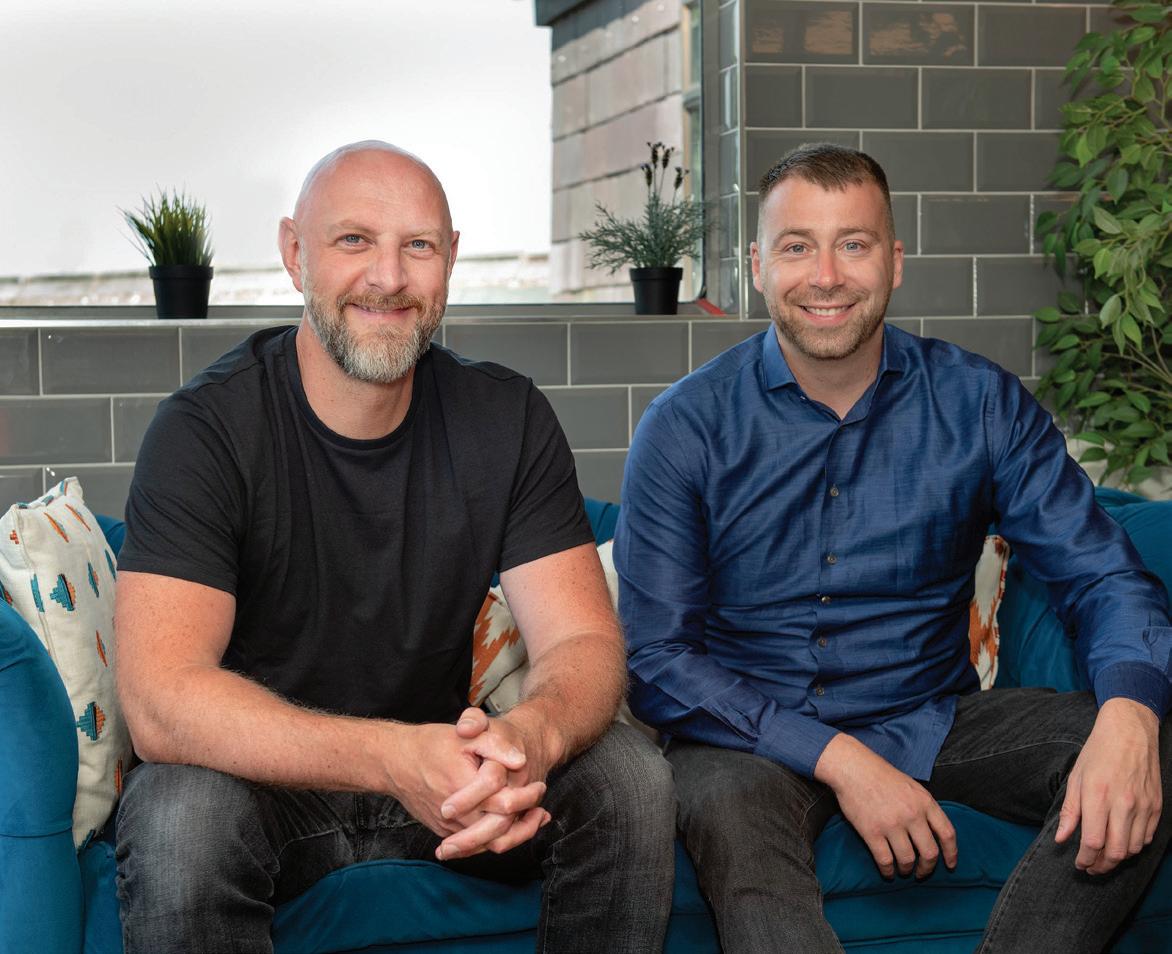

About 40% of large enterprises have experienced employee resignations due to recent changes to their DEI policies. That’s according to a survey by Expleo, which found that while 49% said they are increasing their commitment to DEI – and 56% said it is fundamental to the success of their organisation – 42% believe there is too much focus on it. Since November 2024, 40% of Irish organisations have already eliminated, or have planned to eliminate, DEI targets completely. Almost half who have operations in the US are removing references to DEI that may get them into difficulty Stateside. Phil Codd, Managing Director for Ireland, Expleo, said: “Committing to DEI is not easy. But if we abandon targets, we stop holding ourselves to account. However, we do have reason to be optimistic. A significant proportion of enterprise leaders said they are increasing their commitment to DEI in Ireland. These are the businesses who are making choices that are not only principled, but commercially smart. In doing so, they are positioning themselves as true leaders who are capable of attracting top talent in an employee market where DEI matters more than ever.”
Security-first managed service provider Ekco has announced the acquisition of Predatech, a Manchester-based cyber security consultancy specialising in penetration testing and assurance services. The move expands Ekco’s cyber security capabilities in the UK and establishes a new office for the firm in the North-West. As part of the integration, Predatech will operate as a dedicated security unit within Ekco’s MSSP division. Lee Driver, VP of Managed Security Services at Ekco, said: “Predatech’s expertise in penetration testing and compliance services is a perfect addition to Ekco’s MSSP offering. This acquisition not only strengthens our security capabilities but also gives us presence in Manchester and the North-West, an important hub for innovation and cyber security talent. We look forward to working with the Predatech team to deliver best-in-class security solutions to our clients.”
Delivered by NovaUCD and CeADAR, the nine start-ups selected to participate in the second six-month AI Ecosystem Accelerator Programme have been announced. The participating start-ups are Ailtir, Leapifai, NestiFi, PacSana, Reactable AI, Run Audit, TrojanTrack, UniDoodle and UnitMode. The focus of the programme is to support entrepreneurs who are developing disruptive AI solutions in sectors like advertising, construction, content creation, cybersecurity, education, finance, healthcare and sportstech, for a global market.
Pictured (l-r): Donagh Ó’Buachalla, Co-Founder, Ailtir; Dr Beibei Flynn, Founder, Leapifai; Feargal Duignan, Founder, PacSana. Photo: Paul Sharp/Sharppix

Authored by economist Jim Power, ‘Ireland’s Economic Relationship with the Arab World’ shows that Ireland needs to reduce its dependence on the US and prioritise growth markets, particularly in the Arab world. According to the report, the Arab region is set to be one of the strongest growing areas in the coming years, largely driven by growing populations and its reliance on imports. It’s also easier to conduct business with the Arab world; Ireland’s connectivity with the region has increased, with a significant number of direct flights to Arab destinations. The international reputation for Irish products is also strong. Irish agricultural produce is regarded as of a high quality while for technology and pharmaceutical products, Ireland is recognised as a highly regulated and high-quality production environment. The decision by
the UK to leave the EU has also improved the attractiveness of Ireland as a source of imports in the Arab World.
It takes time to build up any trading relationship, particularly with markets that have a very different culture, so it’s essential to understand it and behave accordingly. To do business successfully in the Arab World, businesses should be cognisant of a few different factors:
» For many Arab countries, the work week doesn’t include Friday
» Face to face engagement and meetings are important to build up trust
» Respect the language
» Be flexible
» Be patient
» Be prepared for hard work and dedication
» Conform to dress code and cultural norms.
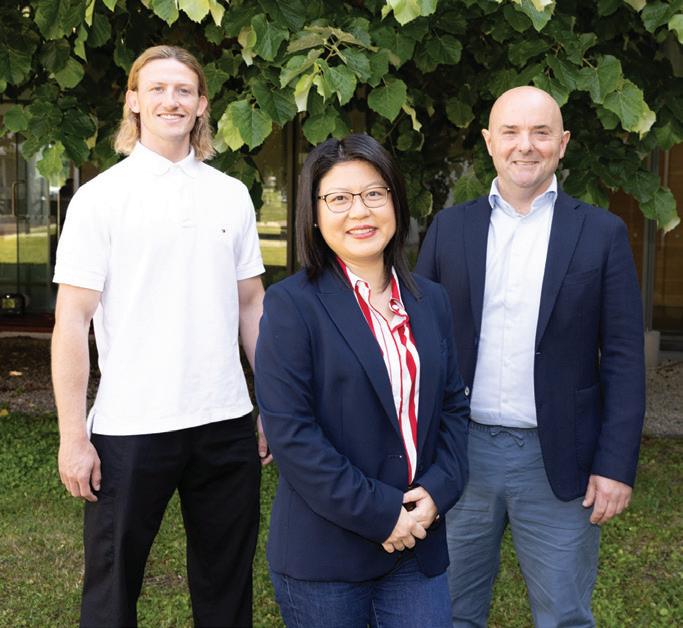
Tracy O’Rourke, Founder and CEO of climate action impact company Vivid Edge, has been presented with a 2025 Impact Award by the Cartier Women’s Initiative. Tracy is one of nine international female entrepreneurs and business leaders and the only Irish entrepreneur to be presented with the award. She was also one of three awardees in the Preserving the Planet category, which recognises innovations advancing climate action and environmental sustainability, aligned with UN SDGs 7, 12, 13, 14 and 15.
“At Vivid Edge we are on a mission to make it easy and financially rewarding for large energy users to decarbonise, bringing energy expertise, delivery capability and capital. We estimate that the projects we have delivered to date for clients have avoided over 36,000 tons of carbon emissions.”
Tracy O’Rourke, Founder and CEO, Vivid Edge

Despite global economic headwinds, Ireland’s recruitment industry continues to show strong underlying momentum. That’s according to the Q1 2025 Labour Market Monitor released by the Employment & Recruitment Federation (ERF).
The quarterly report shows that employment remains close to full capacity, with Ireland’s unemployment rate at 4% in March 2025, up slightly from 3.9% in February but still well below the EU average of 6.2%. Permanent hiring activity remained stable throughout the first quarter, with over 90% of recruitment firms actively placing candidates in long-term roles. Contract and temporary roles saw more fluctuation, reflecting evolving business needs and candidate preferences. Two-thirds of recruitment agencies secured at least one new client in March, although this was a slight dip from January and February levels.















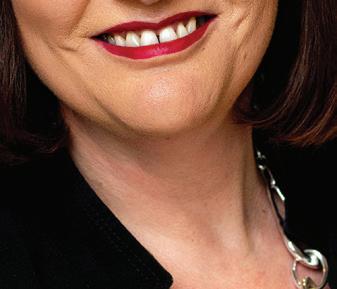

































“What we’re seeing is a dynamic but tight labour market. Recruiters are working diligently to source specialised talent, particularly in sectors like construction, nursing, so ware and engineering but the appetite to hire remains resilient, even as global uncertainties loom. Recruitment is a leading indicator of economic direction. Our latest data con rms that employers are still hiring, but they are becoming more measured in their outlook. Recruiters are working harder than ever to meet demand and source specialised talent in a tightening market.”


Siobhán Kinsella, ERF President, commenting on the organisation’s latest report
Recent figures from the CSO show that female participation rates in the labour market are on the up. The latest data shows that the number of people in employment in Ireland rose by 89,900 in the 12 months to the end of March. Out of that figure, 38,300 were male while 51,600 were female. Minister for Enterprise, Tourism and Employment Peter Burke said that female participation rates in the labour market have been “trending upwards and reached a new historic high.”

















boost skills - boost business




Future-proof your skills with Skills to Advance Micro-Qualifications - short, targeted courses, at little or no cost, in key areas like sustainability, digital business skills, market development, and more.
Stay ahead by contacting your local Education and Training Board or visit skillstoadvance.ie.
Supported
and






€27.6m
The amount invested by Enterprise Ireland in 157 start-ups in 2024, up 15% compared to the amount invested in 2023.
Company Location:
O ices in Cork, Galway and Dublin.
Product or Service:








We provide a complete home energy upgrade service, including grant application, full project management and commercial energy upgrades. We can also provide owners with high end energy e icient windows.
Number of Sta :
Seven full-time and growing. We’re currently looking for Project Managers.
How have you funded the business to date?
Self-funded by the directors and owners of the company.
What’s the best advice you’ve been given?
You need to understand your customer and what they want from their home and how our service can make their home more comfortable and energy e icient. You then need to agree on the journey and work backwards to get them to their destination. We’re building a company that has a Green Heart at its core and we are trying to make homes more energy e icient, reduce carbon and allow the Government to achieve its climate action targets.
What’s the most important lesson you’ve learned starting out?
Adaptability and being nimble when the market moves.
Your biggest make-or-break moment?
Being registered as a One Stop Shop with SEAI has allowed us to grow our service and market.
Is there anything you would change in hindsight? Too early to say!
Ireland recorded its highest number of start-ups since before Covid, with 6,340 new businesses registered in the first quarter of 2025. That marks a 3.9% year-on-year increase, according to a report from business intelligence firm CRIFVision-Net. In the first three months of the year, the highest increases in startups were found in Laois (100%), Meath (25%), Roscommon (24%), Limerick (23%) and Tipperary (15%). “This is the strongest first-quarter performance for start-ups since before the pandemic, proving that Irish entrepreneurship is not only recovering, but thriving. With strong fundamentals in place, Ireland will continue to adapt to the global economic challenges, while maintaining a supportive business environment where companies can thrive – that will be critical as we navigate the months ahead,” said Christine Cullen, Managing Director at CRIFVision-net.
Although start-ups and scale-ups drive innovation, create high-quality jobs, attract investment and reduce strategic dependencies, too many still struggle to take ideas from lab to market or grow at scale within the EU. A new strategy developed by The European Commission addresses these challenges by supporting them throughout their lifecycle and identifying their key needs. It puts forward a set of actions the Commission will undertake in five main areas:
• Fostering an innovation-friendly environment
• Driving better financing
• Supporting market uptake and expansion
• Attracting and retaining top talent
• Facilitating access to infrastructure, networks and services.
For more information, go to https:// commission.europa.eu/

Better Futures, an Irish AI-focused start-up, is among five start-ups from around the world and the only one from Ireland to have been named an award winner of ABB’s 2025 Startup Challenge. At the final, Better Futures pitched that ABB’s engineering RFQ and product configuration process could be up to 80% automated using EVATM, the company’s AI Assistant Platform. Now in its sixth year, the ABB Startup Challenge is an annual competition to develop novel solutions to our most pressing energy challenges. Better Futures won the Distribution Solutions Award category with EVATM (Engineering Verification Assistant), the first AI assistant platform built for engineers that automates up to 80% of the relay configuration and validation process. Anthony Mc Loughlin, CEO and Founder, Better Futures, said: “We are all absolutely thrilled to win and are excited now to partner with ABB over the next six months to bring the use case to market together. I believe this use case has the potential to be a lighthouse, not only for ABB and their customers but for Generative AI in engineering globally, as it has the potential to free thousands of engineers from paperwork so they can focus on innovation and building a better, more sustainable world.”
Kayna, the Cork-based InsurTech, has announced plans to create 13 new high-skilled jobs over the next two years. The news comes as the company accelerates its expansion into the US and UK insurance markets. Kayna’s platform aims to simplify and embed insurance at the point of need, targeting underserved SME sectors such as construction, hospitality and legal services. The model addresses a critical market gap – 40% of small businesses in the US alone currently have no insurance, while a majority of the rest are underinsured. Founded in 2021, Kayna is the third start-up from Paul Prendergast and Peter Bermingham. “The opportunity is huge. Embedded insurance is forecast to account for 15% of the global insurance market, worth $1.5 trillion, within a decade. Kayna’s goal is to lead from the front and to do so from Cork,” said Chief Executive and Co-Founder Paul Prendergast.


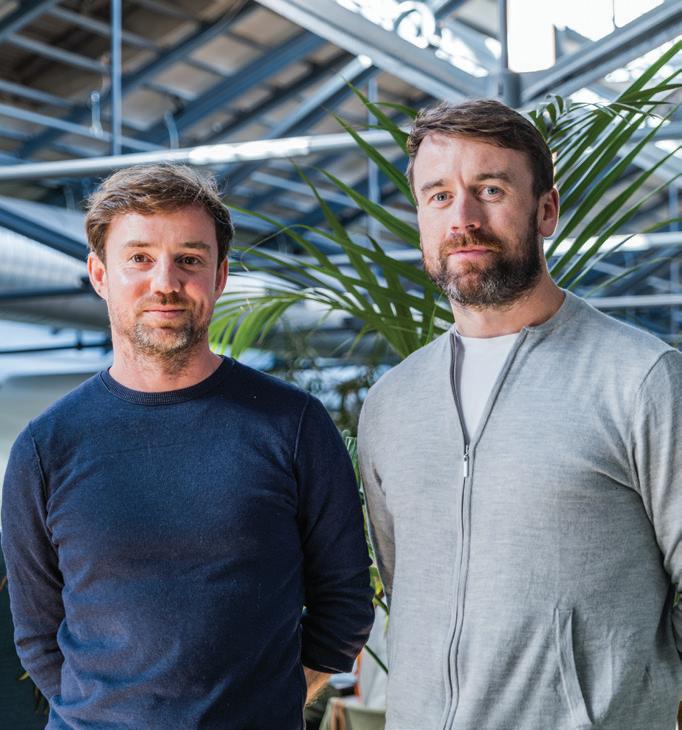
Outmin, an intelligent bookkeeping start-up that automates financial data production and eliminates manual data entry, has announced a €4 million raise led by Praetura Ventures via its Praetura EIS Growth Fund and NPIF II. The company also confirmed the appointment of Feargal O’Rourke, current IDA Chairman and former Managing Partner of PwC Ireland, as Chairman of the Board. The raise will enable Outmin to accelerate engineering hires, deepen AI capabilities and scale delivery for a growing base of accounting firm partners. It’ll also allow the company to further expand its international reach, particularly in the North West of England. “Every accounting firm is facing pressure to do more with less,” said David Kelleher, Co-Founder and Chief Revenue O icer at Outmin. “The future belongs to firms that invest in better systems, not just people. We’re already partnered with forward-thinking firms like Nexio, who are providing valuable insights to help us optimise our product and create something that gives accounting practices a real competitive advantage.”


NEW TITLE: Pre-Sales Director
EMPLOYER: Climb Channel Solutions Ireland
PREVIOUS ROLE: Principal Technical Consultant, DataSolutions
Bringing over two decades of technical expertise and strategic leadership to his new role, Ronnie Hamilton has been appointed to the role of Pre-Sales Director at Climb Channel Solutions Ireland. He will be responsible for leading presales initiatives in Ireland, which will include providing guidance to the pre-sales team and identifying IT solutions which address the evolving needs of partners and their customers.
NEW TITLE: Regional Manager for Asia, Africa and the Middle East
EMPLOYER: Bord Bia
PREVIOUS ROLE: Business Development Manager
Bord Bia has appointed Fiona O’Shaughnessy as the Regional Manager for Asia, Africa and the Middle East. In her role, based at Bord Bia’s Global Hub in Dublin, Fiona will implement Bord Bia’s market diversification strategy in these regions, aiming to drive the commercial success of the Irish food and drink industry. She will also oversee a regional team in Bord Bia o ices across China, Japan, Nigeria, Singapore and UAE.
TWO IN THREE JOB APPLICATIONS


NEW TITLE: Head of Marketing for ROI
EMPLOYER: Bluebird Care
PREVIOUS ROLE: Marketing Director, County Kildare Fáilte
Bluebird Care has appointed Philomena Donnelly to the role of Head of Marketing. Phil will be responsible for supporting the regional homecare operators in market development, sta resourcing and training. With experience at Waterford Crystal and Kildare Tourism, she will play an instrumental role in supporting Bluebird Care’s business operators in communicating the nurse-led consumer care o ering.
NEW TITLE: Chief Executive O icer
EMPLOYER: Insurtech Blink Parametric
PREVIOUS ROLE: Managing Director, BoatyardX
Irish Insurtech Blink Parametric, a B2B SaaS company and part of CPPGroup Plc, has announced the appointment of Brian Barter as Chief Executive O icer. Cork-man Brian will lead the Blink team in accelerating the execution of Blink’s strategy to drive the company’s growth, furthering Blink’s ambition to be the parametric platform of choice for insurers and financial services partners worldwide.
According to the IrishJobs Recruiter & Jobseeker survey, two in three job applications are rejected due to a lack of relevant skills, leading to slower and more resource-intensive hiring for employers. The survey gathered insights from 553 recruiters and 738 jobseekers in Ireland to identify changing attitudes and actions on hiring processes in a fast-evolving labour market. Findings show that 68% of job applications are rejected due to a lack of relevant skills which is impacting the speed and quality of recruitment; as a result, 78% of employers are not satisfied with the quality of job applications received for open positions.




The RDS is not just an exclusive Dublin base for business and pleasure, it is a community of members empowering change in Irish society.
Become a member today and become part of a community that support programmes across the arts, agriculture, equestrianism, enterprise and STEM education.
Other benefits of Membership are:
Access to rugby hospitality prior to all Leinster games and international home games
Complimentary five-day General Admission to the Dublin Horse Show
Complimentary car parking in Ballsbridge for you when using the Members’ facilities or attending events (excluding Dublin Horse Show)
Elegant Meeting Rooms with superb catering and free Wi-Fi
Access to over 50 international Members’ Clubs through our reciprocal partnerships
For further information contact join@rds.ie or 01-2407214















SÍOBHRA RUSH, Partner at Lewis Silkin, on Ireland’s rapidly changing employment laws and why a successful people strategy is the key to success for Irish businesses
COULD YOU GIVE US A BACKGROUND ON YOURSELF AND LEWIS SILKIN?
I’ve been practising employment law for more than 20 years. My career started in the employment law group of a large domestic law rm, where I worked for over 11 years, before moving to a smaller practice on a part-time basis. When Lewis Silkin approached me to open their Dublin o ce, I jumped at the chance and we opened the o ce in April 2018. Lewis Silkin is a law rm that does things di erently. From our focus on what matters most to your business – your ideas and people – to our commitment to being a brilliant place to work, we’ve always followed our own path. With a team of more than 700 working across eight o ces, including our growing presence in both Dublin and Belfast and strategic partnerships around the world, we take pride in our di erence. Personally, I am passionate about helping clients navigate complex legal and business challenges, drawing on both my own experience and the collective expertise of our rm which has been invaluable, given the breadth of knowledge and experience across the o ces.
WHAT SERVICES DOES LEWIS SILKIN PROVIDE?
Our Dublin o ce specialises in Irish and international employment law, business immigration and workplace
data protection compliance. We provide tailored advice to clients on all aspects of employment law, from recruitment to dismissal, as well as support with dayto-day issues and more complex matters. Our team has particular expertise in handling employment claims before the WRC, Labour Court and Civil Courts, collective employment law (including trade union and European Works Council matters), data protection and employee privacy. Our services cover the full spectrum of employment, immigration, intellectual property, technology, data privacy, corporate, dispute resolution and commercial law.
In addition to our core legal services, we also o er HR consultancy through Worksphere, exible resourcing through LS In-house and low-cost, xed fee helpline, tribunal and project support through rockhopper.
HAVE THOSE SERVICES EVOLVED WITH THE CHANGING NEEDS OF BUSINESSES?
We continually evolve our services to meet our clients’ needs. A recent example is that we now o er ‘Legal Design’ services. Some of our clients want to replace traditional looking employment contracts and policies with clear, userfriendly documents that are easier to understand. Restructuring for a logical ow and redra ing legalese into plain
“We provide tailored advice to clients on all aspects of employment law, from recruitment to dismissal, as well as day-to-day issues.”
language improves usability for everyone and means that these documents can be much more ‘on-brand’ for certain organisations. We also provide thought leadership content and hubs such as e Future of Work and e Collective, to help clients look ahead to upcoming regulatory changes and plan for both opportunities and challenges. Our approach is to strategically partner with our clients to solve their most complex challenges and help them thrive.
ARE CLIENTS ACROSS VARIOUS OR SPECIFIC SECTORS?
Our client base is diverse, spanning a wide range of sectors. We are particularly recognised for our expertise across multinational technology and science and we also advise clients in the retail and hospitality sectors. In our wider o ce community, we advise iconic brands, start-ups, fast-growth enterprises and established corporates across the platform economy and beyond.
WHAT ’S COMING DOWN THE TRACKS IN RELATION TO EMPLOYMENT LAW THIS YEAR?
is year, employment law is set to see signi cant developments, both in Ireland and internationally. Key areas include the ongoing evolution of workplace rights, the impact of new technologies on employment relationships and increased regulatory focus on diversity, equity and inclusion (things like the Minimum Wage Directive, the Pay Transparency Directive and the European Works Councils Directive are ones to watch). ere is also greater emphasis on exible working arrangements, parental leave and the global mobility of talent. We are closely monitoring these changes and providing clients with the insight and guidance needed to navigate new obligations and opportunities.
FROM YOUR CONVERSATIONS WITH CLIENTS, WHAT ARE SOME OF THE MOST PRESSING ISSUES THEY’RE DEALING WITH?
Managing workforce transformation, adapting to new regulatory requirements and harnessing technology to drive e ciency and innovation. Clients are also focused on attracting and retaining talent and building resilient and inclusive cultures. e need to balance commercial objectives with responsible business practices is a recurring theme.
IS THERE AN ETHOS AT THE FIRM?
Our ethos is ‘bravery and kindness’. Our people, at every level, are empowered to try new things, take brave decisions and to be ambitious in everything they do. We treat our colleagues and our clients with kindness and empathy and emphasise the importance of enjoying our work in a high trust environment – both between us as colleagues and with our clients.
WHAT ARE THE AMBITIONS AT LEWIS SILKIN?
We want to do the best work with the best clients and are ambitious in our growth to achieve this. We don’t believe in growth for growth’s sake – our ambition is to be the trusted partner of choice for clients seeking to protect and enhance their ideas and people. We are focused on growing through our ‘Ideas and People’ strategy, but in pursuit of excellence rather than numbers. We are continuing to expand our national and international o ering, deepening our expertise in our core sectors and investing in innovation. We are committed to building a rm that is










“Our ethos is ‘bravery and kindness’. Our people, at every level, are empowered to try new things, take brave decisions and to be ambitious in everything they do.”



not only commercially successful but also a brilliant place to work, where diversity, inclusion and social responsibility are at the heart of everything we do.
WHAT DIFFERENTIATES LEWIS SILKIN FROM OTHER LAW FIRMS?
Our model of not doing things the same way as other rms has enabled our people to genuinely thrive. We are ercely independent and our culture –encapsulated by our ethos of bravery and kindness – is key to our identity and distinctiveness. We are non-hierarchical, with ideas and input encouraged from every level of the rm. Our investment in technology, our innovative service models such as rockhopper and LS In-house and our achievements in social mobility and diversity set us apart. In the Dublin o ce, being part of a practice where
employment law is the main focus of our o ering has been a breath of fresh air. While some other international o ces have opened in Dublin since we did, we are the biggest employment law rm in Ireland.
WHAT ADVICE WOULD YOU GIVE A BUSINESS LOOKING TO GROW?
For Irish businesses seeking to grow, a successful people strategy – one that nurtures and retains talent and harnesses good ideas from across your team – is what sets high performing businesses apart. Invest in your people, embrace innovation and be proactive in adapting to regulatory and market changes. Protect your ideas and your brand and seek out trusted advisors who understand your business and can help you navigate both challenges and opportunities.
Deanna O’Connor talks to The Smooth Company's AINE KENNEDY about being a finalist at the EY Entrepreneur of the Year Awards and why creativity is key when it comes to marketing





This year’s group of 24 nalists in the EY Entrepreneur of the Year Awards were revealed in April, competing across three categories – Emerging, Established and International. Collectively, they are generating revenues approaching €1 billion and employing over 4,000 people across sectors including consumer, technology, media, health, life sciences, manufacturing and nancial services. Before the annual gala awards, the cohort will be taking o to Tokyo on a week-long CEO retreat, where they will meet other alumni and a range of world-class entrepreneurs, businesspeople and academics.
One of those nalists in the Emerging category is Aine Kennedy of e Smooth Company, the youngest of the bunch. “It was always on my vision board,” she says. “It's such a big honour; I’ve followed the journeys of so many entrepreneurs who've got onto the programme.”
Although she is now 28, she has had her eye on the beauty business since a Transition Year project turned her on to entrepreneurship – getting out of class to sell candy canes was great, but earning money was a revelation. “I just loved it. at was
"My biggest advice for someone who wants to start a business is try and get as much experience in the industry as you can – that helped me beyond measure."


when I got my rst real interest in business.” Once she turned 16 she got a job in Boots and saw a big gap in the market at the time, from customers looking for quality make-up brushes. However, when Real Techniques launched and lled that gap, she worried she had missed her chance.
However, she kept her eyes open for another area where she could make a di erence, while she went about getting quali cations (a degree in Entrepreneurship from Maynooth University) and gaining experience working rstly as a Trend Team Artist with premium international brand Bene t, followed by stints in beauty marketing with budget brands Essence and Catrice and Irish tanning brand TanOrganic. Seeing all sides of the market has been valuable.
“My biggest advice for someone who wants to start a business is try and get as much experience in the industry as you can – that helped me beyond measure. It saved me a lot of expensive mistakes when I went to start my own business because I've seen stu that's gone wrong, what was worth investing in and what wasn't worth spending money on.”
A er biding her time, the eureka moment nally hit. A hair styling trend for ‘slicked back dos’ – a centre parting and ponytail or bun, characterised by mirror-smooth hair, presented the idea and the opportunity she’d been waiting for. Seeing her peers dipping toothbrushes in gel to tame yaway hairs gave her the inspiration for her rst product, the Smooth Stick. “I've danced for years and I hate putting hair spray and gel on my hair because you have to wash it out,” she explains. It was crucial for her to develop something with natural, powerful ingredients that didn’t leave hair

"I went onto TikTok and started telling people about the business and what I was doing. Off the back of that, we now have 150 million TikTok views and customers in 70 countries around the world."
hard, like gel does. She launched the agship product, the Smooth Stick, a er two years of development and invested all her savings into it.
“De nitely the most challenging part about running the business is nding good manufacturers,” she says. Starting the business was a steep learning curve and even now, she will choose the best manufacturer for the product, rather than keeping all her eggs in one basket. “It just mitigates the risk,” she points out, having seen supply chain issues during the pandemic and when the container ship Ever Given obstructed the Suez Canal for six days in 2021.
“We're very proud that our Smooth Dream [hairstyling cream] is made here in Ireland. And with that comes a high price tag. But we save on shipping costs, so there's pros and cons to everything.” Being young gave her a sense of freedom to throw everything at the business; living at home with her parents and without children, she felt able to take risks.
Indeed her whole family has been heavily involved in supporting the business, with her sister now working in it and Grandad Billy having become a social media sensation on TikTok as well as the inspiration behind the Dapper Stick, a men’s version of the original product, aimed at keeping combovers in place.
e business has seen exponential growth since the rst product launched in 2022, with pro ts increasing 85% in the second year in business. Her rst shipment, a minimum order quantity (MOQ) of 5,000 units, sold out within weeks. A er three months of frantic packing and posting and dealing with the headache of customs forms for




“Because the ful lment centre was sending out so much for so many brands, they had much better shipping rates than we had, both international and domestically.”











before the tari s were raised, which will tide them over for a couple of uncertain months.

Now with over 100,000 online orders and customers in 70 countries, and stocked on 432 Aer Lingus routes, the business has expanded through ful lment centres in Ireland, the UK and the US. Luckily she got a shipment into the US just before the tari s were raised, which will tide them over for a couple of uncertain months.














what was doing. O the back of that, we now have



As a marketer, since she rst began working she’s seen the power of social media to make brands. It has been hugely instrumental in e Smooth Company’s success. “I put all my money into getting the formula right and paying for it and the packaging. So then I literally had no money le to market the brand. I went onto TikTok and started telling people about the business and what I was doing. O the back of that, we now have 150 million TikTok views and customers in 70 countries around the world.”


Social media strategy is a multi-faceted operation: a mix of organic content creation, mentions by celebrities and in uencers and paid promotions. “I think they're all equally as important – obviously it depends on your eld, but speci cally in beauty, I don't think you can do one without the other. In uencers have been so supportive of us from day one and we de nitely wouldn't be where we are without their support.” e accidental social media star, Grandad Billy, was also “a secret weapon”, she laughs.





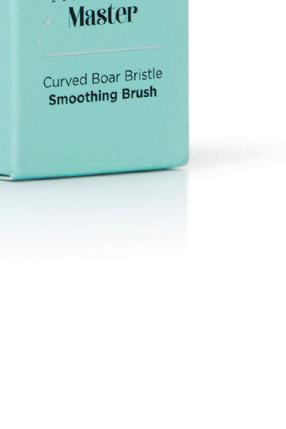
"The reason I called it The Smooth Company is because our products help our customer’s day run more smoothly. So we're keeping it broad."
people in the world, which is so surreal,” she says. “ e likes of L’Oréal and the huge, multi-million-dollar beauty brands
A er holding back on targeting celebrity endorsements until the UK ful lment centre was operational, they’ve now gone “hell for leather” on sending out products to celebrity hairstylists who have given their seal of approval. “All of our products have been used on some of the most famous people in the world, which is so surreal,” she says. “ e likes of L’Oréal and the huge, multi-million-dollar beauty brands have the budgets to pay these people to use their products, where we absolutely don't. So the fact that they're using them just because the products are that good is the best testament to the brand. We have to be savvy how we approach these and we have to nd creative ways of getting our products into
just because the products are that good is the best testament to the brand. We have to be savvy how we approach these and we have to nd creative ways of getting our products into their hands.”











Bijenkorf, in e Netherlands. global expansion and new product

our products help our customer’s day run more smoothly. So we're keeping it broad,” she says.
TikTok shops and a liates linking through TikTok are two areas she predicts will grow even more over the coming months and years. New launches this June included a detangling hairbrush and a heat protectant styling spray, while the brand also entered a new premium department store stockist, de Bijenkorf, in e Netherlands. Future plans include further global expansion and new product launches. “ e reason I called it e Smooth Company is because our products help our customer’s day run more smoothly. So we're broad,” she says.


Pensions on track to be most Pensions on track to be most Pensions on track to be most talked about finance topic of 2025 talked about finance topic of 2025 talked about finance topic of 2025
Mortgages and savings also frequently referenced in analysis of over 100,000 mentions of personal finance topics by Irish social media users in Q1 2025.
Olytico, Ireland’s leading social media analysis agency, have published their Q1 2025 Irish Personal Finance and Wealth Management Report. It highlights how the Irish public are increasingly discussing their personal finances and wealth management on social media platforms. The growth reflects a trend in conversation from 2024, where over 500,000 mentions of the topic from Irish social media users were analysed. The public continue to share their opinions on a range of finance related topics, including anxiety about maximising their pension contributions, mortgage switching options and the implementation of the pension auto-enrolment scheme.
Olytico know what consumers are talking about, and where those conversations are happening. 45% of Irish personal finance and wealth management conversation took place on Reddit in Q1 2025. Irish subreddits are increasingly becoming the place that consumers go to ask questions about improving their finances.
Each week, hundreds of questions are posted asking for advice on a broad range of personal finance topics from loan provider options to investment strategies, car financing information and savings plans. Replies to these questions include recommendations of specific brokers, pension providers, investment advisors and financial institutions.
Olytico’s social media analysis team have over 15 years’ experience helping businesses leverage social insights to drive success. Powered by a suite of best-in-class software, our team of Ireland-based analysts offer bespoke social listening and reporting solutions tailored to your specific use case. Whether you want to gauge public opinion, benchmark social performance versus competitors or receive real-time social alerts, Olytico can create a solution to meet your needs.
Trending Finance Topics Q1 2025
Jennifer McShane about breaking barriers, building solutions and why AI needs more women in the driver’s seat





“Instead of just viewing challenges through a research lens, I now focus directly on clinician and patient problems.”
TELL US ABOUT YOUR CAREER SO FAR
My career has been quite a journey! I started in bioinformatics and chemoinformatics, completing my undergraduate and MPhil in Pakistan in bioinformatics. In 2012, I moved to the UK and completed my PhD in computational chemistry at the University of Cambridge. My research focused on analysing early drug discovery datasets using computational methods. Over the past decade, I’ve developed computational solutions for drug discovery in pharma. In 2016, I moved to Ireland to join Accenture’s Dock Centre for Innovation in Life Sciences. ere, I worked with major pharma clients such as BMS, Astellas, Sano and Merck, helping them tackle early discovery challenges using AI. In 2020, I joined the Novartis AI Innovation Lab as a Solution Director, leading multidisciplinary teams focused on generative chemistry. In 2023, I returned to Accenture to lead the Bioinnovation AI capability team.
WHAT INSPIRED YOUR TRANSITION FROM LIFE SCIENCES TO DIGITAL HEALTH INNOVATION?
I’ve always worked at the intersection of AI and life sciences – whether in early drug discovery or clinical trials. What changed is my focus. Instead of just viewing challenges through a research lens, I now focus directly on clinician and patient problems. is shi enables me to design technology that genuinely improves lives, making a real, human di erence rather than just driving e ciencies.
HOW DO YOU STAY AHEAD IN SUCH FAST-EVOLVING FIELDS?
Staying ahead requires a mix of continuous learning, experimentation and adaptability. I prioritise keeping up with new technologies, understanding their use and identifying their transformative potential. I also make time to attend conferences, webinars and networking events. rough these exchanges, I gather diverse perspectives and fresh ideas, which help fuel innovation.
YOU’VE WORKED CLOSELY WITH DIGIBIO’S HEALTHTECH INNOVATION PROGRAMME. WHAT HAVE YOU LEARNED? e clinical immersions o ered through the programme have been invaluable. Fellows spend 8–12 weeks in clinical settings,



The consulting team at Grant Thornton Ireland is changing how leadership is defined
Everybody knows Grant ornton. ey know it’s one of Ireland’s largest professional services rms and that it provides businesses with the kind of bespoke services that enables them to thrive. What people perhaps don’t know, is that it’s also a company rooted in transformation. In recent years, the leadership structure at Grant ornton Ireland has changed. Today, four women in particular – Amanda Ward, Áine Logan, Janice Daly and Sharon Scanlan – are shaping the vision of the Consulting Team and providing clients with innovative, dynamic solutions amidst an ever-changing, o en complex business environment.
As Co-Head of Consulting at Grant ornton Ireland, Amanda Ward leads the team with Brian O’Dwyer. ey are responsible for growing the team and delivering projects across a range of fast-moving sectors. ose sectors are diverse, ranging from nancial and public services to energy, consumer goods and health and life sciences. Working with clients to provide solutions to their most critical challenges is, says Amanda, the team’s primary goal. “We’ve worked hard to build a strong suite of market-leading solutions, particularly in areas like transformation, people and change, risk, sustainability, digital and economic advisory. We don’t provide o -the-shelf solutions – they’re built in a bespoke way to dig down and address our clients requirements. Plus, they’re delivered by people who really care about making sure they deliver exactly what the client needs.”
“That diversity of experience is a strategic strength, it allows us to challenge conventional ways of working in professional services.”
ose people have been recruited from a variety of diverse professional and personal backgrounds. “I think that’s what’s particularly exciting about Grant ornton Ireland – the culture we have created across the team. We all come from di erent paths, but we operate as one team. at diversity of experience is a strategic strength, it allows us to challenge conventional ways of working in professional services. It sparks innovation and helps build more thoughtful, inclusive solutions for our clients.”
e consulting team at Grant ornton Ireland is de ned by a deep sense of shared accountability and collaboration. “ ere are no silos or egos and that’s allowed us to show up with con dence to our client base. One of the things I’m most proud of is the strength of our female leaders. We’re not just increasing representation, we’re also changing the tone of leadership.”
“Large-scale change and transformation may look di erent across sectors, but the principles for success rarely di er.”



With Amanda, Sharon, Janice and Áine, the focus is on leading with strength and empathy – an ethos that’s perhaps not traditionally associated with professional services rms. “We have set bold ambitions in the market and we are delivering on them with purpose, innovation and care. We are so proud of what we have built so far and we are really excited for the next stage in our journey.”
In Ireland, Grant ornton has a presence in six locations around the country, including Belfast. Áine Logan, a Partner leading the rm’s Transformation Excellence Capability, divides her time between Belfast and Dublin. Working primarily across nancial services and the public sector, she leads multi-disciplinary teams of Subject Matter Experts (SME’s) and delivery specialists to design and deliver bespoke change and transformation programmes. It’s a diverse role across a range of di erent sectors. “Large-scale change and transformation may look di erent across sectors, but the principles for success rarely di er. A clear vision, strong leadership, active stakeholder engagement and disciplined delivery are universal drivers to successfully execute and deliver, regardless of the sector the
client is in. Our clients’ sector-speci c challenges shape how we apply these principles. By getting those fundamentals right, our teams can help clients navigate a range of transformation initiatives with con dence.”
While client requirements across di erent sectors may vary, there are a couple of areas where they converge, namely AI and diversity of teams. “Clients want to know how best to leverage the various arti cial intelligence on the market, but there’s also some hesitancy out there around it. A key message that we work hard to get across is that business will always operate on relationships. While AI can accelerate analysis and surface insights, it cannot replace the judgement, empathy and trust that underpin e ective decisionmaking and relationships. Change succeeds when people connect and inspire; qualities no algorithm can replicate.” Clients are also increasingly looking to source teams outside of Ireland. “Clients want global teams for seamless expertise that crosses borders as easily as their business does.”
Transformation isn’t con ned to just one division at Grant ornton – it spans across all sectors. “Within the consulting team, our teams have the capabilities to unlock opportunities that clients probably haven’t considered or thought of before.”



“Companies that view sustainability as a driver of long-term value are likely to have a competitive advantage.”
Janice Daly is the rst dedicated Partner to lead the Sustainability Advisory Practice in Ireland. She specialises in sustainable nance and climate risk, with a growing focus on international projects. With recent regulatory roll-backs across Europe, sustainability has become an increasingly complex space. However, at its core, sustainability is about creating resilience within your business – ensuring you can adapt, perform and thrive in an uncertain future, she says. “Done well, it’s also a driver of long-term value, unlocking
e ciencies, strengthening brand trust and opening new market opportunities. e reality is that climate change is one of the most de ning challenges of our time and it’s not going away. at’s why at Grant ornton Ireland, our role is to help clients build the structures needed to navigate both the risks and opportunities it presents with con dence and clarity.”
e majority of clients are steadfast in their commitment to sustainability.
“Our clients continue to demonstrate a strong and unwavering commitment to sustainability. For some, it provides a strategic foundation, guiding decisionmaking and shaping long-term organisational direction. For others, the focus is on evaluating and managing the sustainability performance of the businesses with which they engage. In both cases, sustainability is recognised not only as a core principle of responsible business, but also as a means of building resilience, enabling organisations to adapt, respond and thrive amid evolving challenges and
uncertainties. Many clients who have invested heavily in sustainability now nd themselves facing uncertainty. While the current environment is challenging, it also presents opportunities to adapt and strengthen resilience.”
Janice sees sustainability as a crosscutting capability that runs through all areas of consulting and advisory, fostering collaboration across disciplines which “allows us to meet clients where they are, supporting them every step of the way.”
is a key di erentiator in the market.”
Sharon’s team of 100+ sta includes a mix of clinicians, economists, transformation experts, accountants and data analysts.
Sharon’s role is wide-ranging, encompassing everything from large-scale healthcare transformation and digital transformation to improvement programmes across the public and private sectors.
“Our healthcare work varies from gaining e ciencies in theatre and outpatient settings, developing applications to monitor hospital bed usage to analysing emergency care data. From a life science perspective, again extremely variable – from providing pre-merger readiness support, to supporting large technology programmes and supporting organisations to gain access to national grants. No two days are the same.”
At Grant ornton Ireland, providing clients with the best support means thinking outside the box when it comes to expertise. Partner Sharon Scanlan leads the healthcare and life sciences practices at the rm. A former nurse and physiotherapist, her hands-on clinical experience informs her consulting role. “I think having a clinical background is absolutely advantageous when leading a Healthcare and Life Sciences practice. I’m in a position where I can bring those clinical insights to a project to better understand the client and the market. My clinical background, paired with 10 years NHS experience,
Collaboration and empowerment are what de nes Grant ornton Ireland. “I tell my team, never doubt yourselves. I want them to feel fully supported. We want to get the best out of every individual and make sure everyone stays motivated. ere is no hierarchy here and there’s no cap to what we can achieve. at’s something all partners in the consulting team work to reinforce every day.”








“I think having a clinical background is absolutely advantageous when leading a Healthcare and Life Sciences practice. That, paired with 10 years NHS experience, is a key di erentiator in the market.”





























































































































































































Confused about AI? EY Ireland’s BRONAGH RIORDAN chats to INBUSINESS about the technology and how Irish businesses can sort the facts from the jargon
rish businesses have embraced AI and are utilising it to drive innovation, make processes more e cient and detect fraud. at’s according to one report released this year. On the ip side, another report suggests Irish businesses are wary of the technology and concerned about the increased threat of data breaches it could pose, along with its potential to produce misleading information.
So, what’s the real story? Does the truth lie somewhere in between these two reports and more importantly, where can Irish businesses go to access accurate, real information about AI and the bene ts or otherwise that it o ers?
e Arti cial Intelligence (AI) Advisory Council is an excellent
rst start. Set up in 2024, the Council provides expert guidance, insights and recommendations around the technology and works to demystify and promote trustworthy, ethical and person-centred AI. Getting to grips with the technology and harnessing its potential in an informed way comes down to education and literacy, says Bronagh Riordan, AI Advisory Council member and AI & Data Partner at EY Ireland. “Businesses and society are being shared so much information about AI from various places. Knowing where to go to get quali ed, correct information can be tricky and that’s one of the reasons why the Council was established.
“Our most recent report – ‘Helping to Shape Ireland’s AI Future’ – among other
topics, looks at the future of skills and work and why we need proactive policies to manage its impact on employment and skills. It also focuses on the importance of building AI literacy among educators and students, which I think is really key in demystifying the technology.”
AI is changing the way businesses work, in both big ways and small ways. It’s helping companies complete tasks faster, more accurately and more cost effectively. The key, says Bronagh, is about understanding how it pertains to your business specifically. “What are your goals and objectives as an organisation and how do you best leverage AI to support these? For many businesses, automating processes is the first step they’ll take when using AI. The next is often around enhancing decision-making and improving customer experiences. I’ve been in this industry for several years and AI isn’t new – what is new though is the democratisation around it, driven in large part by new Generative AI tools since 2022 in particular. Mass adoption is looming and we’re very much on the brink of a transformative technological era.”
Businesses are using AI to drive innovation, reduce cost, improve profitability and manage risk. The type of AI tools that businesses can harness depends on the business questions they need answered. “There are many types of AI technologies out there today. To identify which one will actually benefit them, it’s important that businesses think about their goals and what they’re trying to achieve. Some of the more common include chatbots and virtual assistants. These tools can talk to customers and answer common questions. Predictive analytics is another key tool which I’ve used throughout my career. It’s about using data to look at past trends and predict what might happen next. Businesses are harnessing it to identify what products will sell better than others. Automation tools are also being used by businesses to perform repetitive tasks like filling out forms or processing invoices. Another common tool is Generative AI, which helps support businesses to create content such as marketing copy, social media posts or even product designs, while video recognition and image recognition are much more regulated tools that would be used by specific industries.”
At EY Ireland, Bronagh helps clients navigate the everchanging world of technology and achieve their business goals through AI. Previously, she was Head of Data & Analytics at Primark. She’s also Chair of the Industry Steering Board at CeADAR Ireland, the country’s national centre for AI and European Digital Innovation Hub for AI.
She advocates for the increased representation of women in STEM and is seeing more women taking up roles within the industry. “To encourage more women to take up STEM, I think we need to be supporting younger generations. It starts in primary schools. Role models are also important; younger people need to see females in these roles, so they understand where the opportunities are and what’s possible. Ireland is brilliant in terms of the role models that we have in the technology sector, both men and women.” When it comes to AI, it’s so important that diversity, equity and inclusion is taken into account, says Bronagh. “With AI, it’s not just about gender, it’s ensuring you’re accounting for all the different diversity inclusion aspects to ensure you’re feeding that into your AI capabilities and managing bias properly.”
With technology evolving at a rapid pace, what’s Bronagh excited about? “I’m excited about lots of things, in particular about responsible AI and how we can leverage the technology in an ethical way for the betterment of society and business.

Riordan, A I & Data Partner
» It may sound obvious, but ensuring alignment with your business goals is key. What is it you’re trying to achieve in your business? What’s your North Star? Aligning your AI needs with your business goals is your next step.
» Prioritise small, manageable projects. Demonstrate quick wins and build momentum. This helps people understand what the technology is and how it can be useful to your industry.
» Focus on value. The best business keeps it simple and questions whether AI will support your KPIs. If it doesn’t, don’t do it.
» For many years, we’ve heard data is the new oil but it’s much more valuable than that – it’s super fuel. Make sure you have good data to feed into your capability and systems and that it’s well governed.
» Focus on your people. Observe your organisation and help them become data literate.
» Bring together a data team, an analytics team and a business team. When everyone is working together towards the one common goal, that’s when the hype becomes a reality.
“I’ve been in this industry for several years and AI isn’t new –what is new though is the democratisation around it, driven in large part by new Generative AI tools since 2022 in particular.”
And I am excited about the positive impacts AI can have in areas such as healthcare, to improve diagnostics and patient care through predictive analytics and personalised treatments, and the education sector, where AI can be used to enhance tailored learning experiences. From an Irish perspective, Ireland has a real opportunity to lead in a couple of different ways. One of those is AI regulatory excellence and another is around the commercialisation of R&D. We have so many fantastic companies situated within Ireland and we have a supportive ecosystem and Government which will enable Ireland to really lead in AI.”


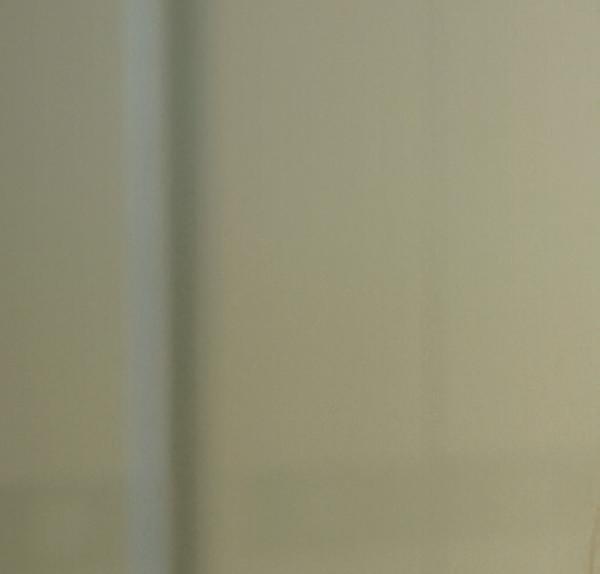

















Over three decades, EVELYN O’TOOLE has grown Complete Laboratory Solutions (CLS) from a one-woman show to a highly respected multinational company. Now, it’s poised for a new era



“I came from an era when you were proud to say you were working. You loved driving into work in the morning because you felt you’d a purpose –there were so many of us on dole queues.”
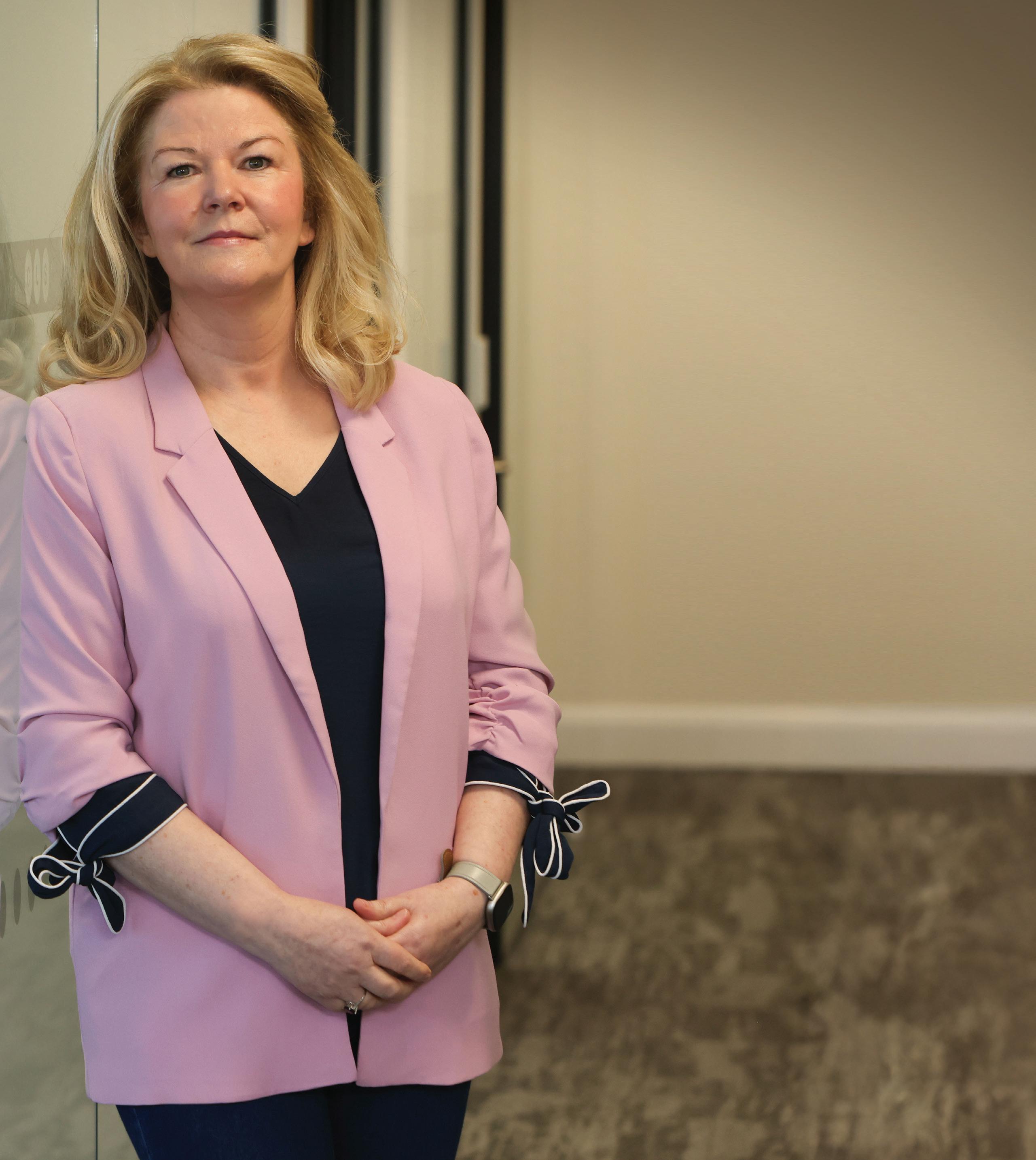
the early days of starting up a business in the wake of redundancy, driving around in a Peugot 205 van to collect samples and doing all the testing herself, Evelyn O’Toole has built a multinational company and a legacy in the West of Ireland.
CLS is the highest-accredited Irishled contract laboratory, which is GMP licensed by the Health Products Regulatory Authority (HPRA) and the US Food and Drug Administration (FDA). The company boasts a blue chip roster of clients who are global leaders in the medical device, pharmaceutical, environmental and food and beverage industries.
“I’d so little to lose and there were so few jobs around,” she recalls of the decision to go out on her own. “I came from an era when you were proud to say you were working. You loved driving into work in the morning because you felt you’d a purpose – there were so many of us on dole queues.”
Coming from a technical background she was on a learning curve, particularly when it came to the financial side of things, but she rightly reflects, “Numbers become very interesting as you develop a business.” She compares finance and accounts to scientific notation: “It’s a very neutral language; it doesn’t have a bias. It’s a very definitive item and it translates across people.”

With both scientific results and financial results, she says: “It gives you a great confidence in sharing information, because you know that this is backed up with a procedure that’s qualified, so you feel very accomplished being able to execute items like that and being able to express the interpretation of that result.”
From three facilities across Ireland – Galway city, Ros Muc and Dublin – CLS offers comprehensive external microbiological and chemical testing services, but it’s poised to do much more. Looking at the business over the years, after the first decade’s learning, she characterises its second decade as growth and scaling, transferring the skillsets within the company and leveraging off the successful baseline business –“pointing your science at different markets so that within those markets, you can bring your team with you to learn new skillsets and develop.”
The third decade was characterised by the maturity of the business, “becoming a reference company on the market” and recognition from blue chip FDI clients. “They’re beginning to identify you as a company that’s good to work with and giving you referrals to other FDI and that’s really the dream,” she says. “It’s about being recognised by your iconic clients and being referred to other iconic clients. For years, I was trying to get into that position with an indigenous company with an unknown brand.”
Those years of hard work paid off and those uncompromising clients began to recognise CLS as “the guys to be with if you want to deliver a project on time, if you want the licences to be all lined up on time,” she says, proud of the reputation the company has earned.
Having sold a 75% stake in the business to Phenna in 2022, O’Toole has stayed on to lead with her strategic vision for a new era of CLS in its fourth decade. “Phenna is a light touch private equity firm that invests in high performing companies that are mature and allows those companies to grow,” she says. This sale of a majority shareholding outside of Ireland has also positioned the company to become a client of IDA Ireland, further supporting its continued growth.
“The advantage for Ireland is that the IDA and Phenna develop a closer relationship, which means that Phenna is more likely to invest more in Ireland,” she explains. “It’s a company that wants to grow through acquisitions and investment in various firms, so it’s very symbiotic.” She chose to remain as CEO because she wants “to grow CLS and the brand to its next phase of being an Irish-led multinational.”
Recently announced plans reveal part of her vision around how that will occur in the next phase of the company’s life. A novel strategy is hinging on a huge investment in staff upskilling. The staff, from scientific backgrounds, have technical expertise, but O’Toole’s plans build on this to leverage that expertise in new ways through data analysis and consulting to boost their client’s productivity.

“We’re like a startup that’s 30 years old. We’ve just hit a horizon and it’s the realisation of the power of CLS in the right place at the right time. Let’s put that legacy to work for our clients and for our country.”
With her broad view over both sector and timespan, she sees a decline in optimum productivity across the sectors she works with. She believes CLS holds the solution to that decline. “Because a lot of Ireland’s industry’s footprints are maturing, they need a refresh. We’re now putting those three decades of skillsets together and doing much bigger business,” she says. “Those new services are sharing out the expertise that we’ve built over 30 years in areas such as quality control, quality assurance and Lean transformations on sites.”
Along her journey over three decades in business, O’Toole has won numerous awards and plaudits, yet what makes her most proud is the impact in her local area. CLS is not only providing quality jobs, allowing people to live and work in the West, but also inspiring local schoolchildren to consider careers in science, with worldclass facilities on their doorstep. Their site in Ros Muc, in the Gaeltacht, is right beside Padraig Pearse’s cottage, juxtaposing Irish history and culture with state-of-the-art technology and creating a new legacy in the West.
“The local school kids think every school has a lab next to them and I think that’s my legacy. We’ve brought something that’s very advanced right into their backyard.” Looking to the future, she says: “The thing I’m most looking forward to is showcasing CLS’s ability. We’re like a start-up that’s 30 years old. We’ve just hit a horizon and it’s the realisation of the power of CLS in the right place at the right time. Let’s put that legacy to work for our clients and for our country.”
The quality of the food comes first for Builín Blasta’s HEATHER CONNOLLY
Canadian born Heather Connolly has spent almost half of her life so far here in Ireland.
“It’s the classic story of travelling and meeting somebody and staying,” she says, “and then establishing a life here and a business.” at business is Builín Blasta, the café she bought as a going concern and then went on to build a thriving gourmet product range, with the moreish Smoked Onion Mayo boosting interest in the brand, which already included some salad dressings and chutneys when she took it over.
Although she started life in the animation business and worked for Cartoon Saloon for a while here in Ireland, Connolly realised food was the industry she wanted to be in and retrained, taking a degree which combined business and culinary arts. “It’s no longer available, but I thought it was a brilliant degree,” she says. Her passion for food shone through and it wasn’t long before she landed a head chef role with e Gourmet Tart Company. “It de nitely catapulted my career in che ng,” she says, “but it was really tough. I wasn’t trained in, I had only worked casually in kitchens. I’d never been responsible for the menu or costing and ordering.”
However, she surrounded herself with trusted colleagues, hiring in people she knew from college. “We had a great time and we created an amazing menu,” she says.
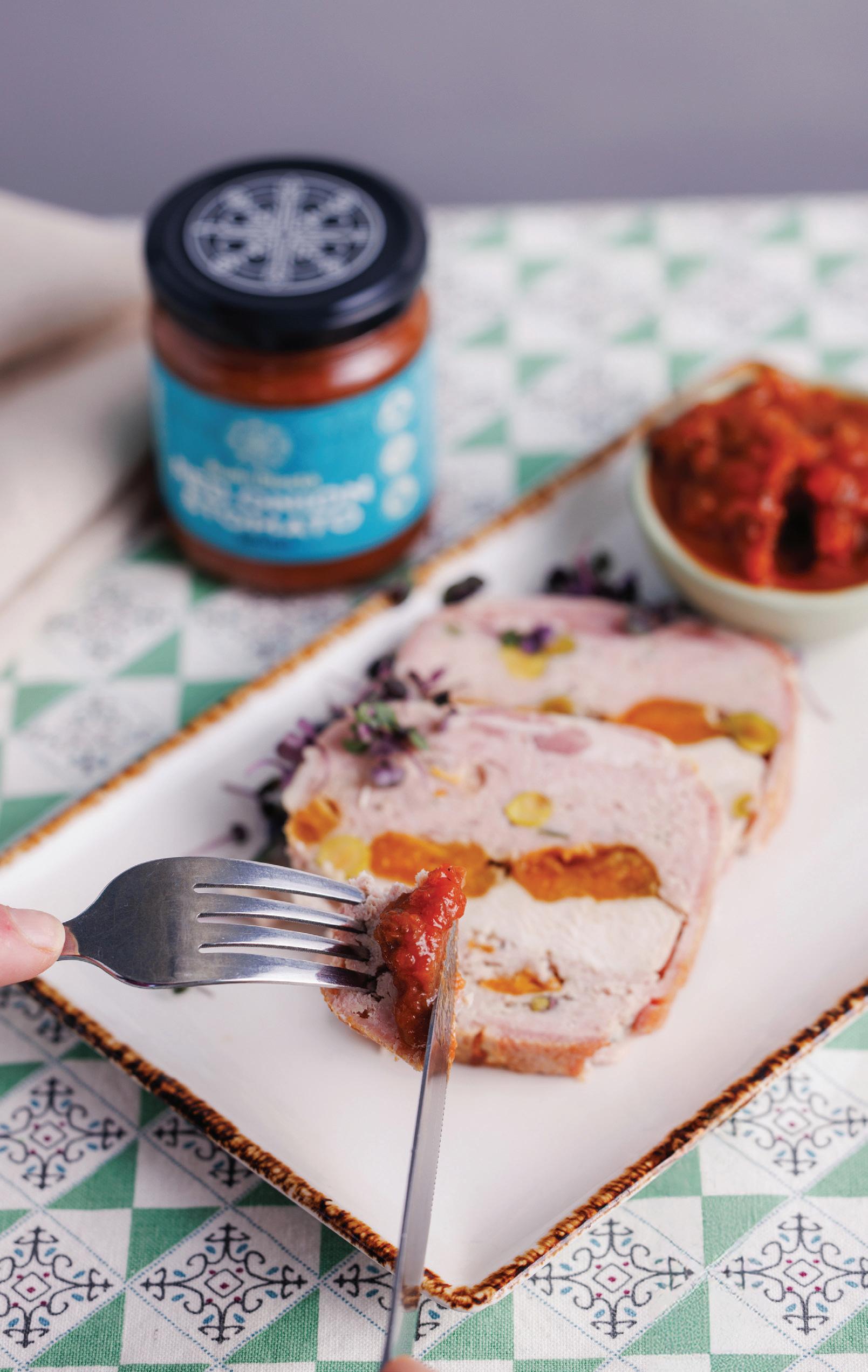

From there a stint at McCambridge’s in Galway deepened her knowledge of small Irish producers – the type of artisan products which she stocks in her own café shop today. She later heard through the grapevine that her boss there always expected she’d strike out on her own. “I was always ambitious. I always wanted to have my own place,” she admits.
Where her entrepreneurial streak comes from, she’s not sure – her father was a civil servant, her mother a nurse – but she says, “I’ve always been driven. I have to work. I don’t do well if I’m not working; I’m thinking about work if I’m not at work.” is nearly led her to burnout in her rst year of business ownership, pulling 70-hour work weeks. “All the clichés,” she laughs. Having the right people around her was again instrumental in building out the vision. She brought a chef with her, o ering a share in the business. “I asked if he wanted a stake, because I knew that you need other people who have a stake in it and who are going to commit to sticking around. And he’s still with me. We’re 10 years in business in August.”
Another partner, Eimear Killian, came on board a few years ago as Operations Manager, to take over the café and catering when the Smoked Onion Mayo took o and Connolly saw an opportunity to focus on that side of the business. “I needed the time to commit to that. In the meantime, I was having babies and we extended the cafe and built a production kitchen. I can’t imagine how I coped with it all.”
e café is busy year-round, with strong local support, workers from industries in
Spiddal and what she calls ‘Super Sundays’ when parents come to visit children in the nearby Gaeltacht summer camps. “Honestly, what we used to consider a Super Sunday is what we do now on a Monday in March.”
While that sounds like business is booming, in today’s restaurant trade, that doesn’t necessarily equate to turning a pro t. “I’ve been doing quite intensive work on our costs. Because we grew, our turnover increased 17% in Q1 this year compared to last year. ere’s just nothing at the end of the line, nothing le at the bottom. We’re doing everything right, but so much of it is out of our control,” she says. “We would place a good bit of the blame at the feet of the Government. I just don’t think they have appreciated the knock-on e ect of all the increases that they’ve passed on to small businesses over the years.”
Record global surges in the price of co ee is yet another obstacle for the hospitality industry – a plethora of factors including, but not limited to, climate change, supply chain disruptions and rising demand that have sent prices through the roof. Traditionally, co ee was something restaurateurs could rely on to make high pro t margins. Not anymore. “Our co ee cost this month rose 25%,” she reveals.
Connolly had already been looking at creative strategies to make the business run more e ciently, including changing the service model from table service to order-at-counter. “I wanted to change it for a long time,” she says. “But anytime you make a change, you have to bring your customers along with you.” When

the pandemic created the conditions for change, they maintained the new system a erwards. She reckons the change has removed about half the points of contact – greeting, seating, bringing water and so on. “ ose touch points with the customer are reduced so theoretically, it should help save sta costs.”
Diversi cation is, of course, another solid strategy and currently, the business turnover split is about 70% café and 30% products. Since the Smoked Onion Mayo took o , with a little social media help from a shoutout by e Gastro Gays who had tasted it in McCambridge’s, the product range has been listed in all the major supermarket retailers, as well as in the likes of Avoca and Donnybrook Fair and a host of independent retailers. Distribution is dealt with by Taste the View, a supplier that specialises in artisan food products. With that job taken o her hands, Connolly is constantly exploring new avenues for growth, from catering supply size buckets (already happening) to a potential smoked onion crisp avouring (not yet a reality, but it does sound delicious).
e throughline, of course, is taste. “People want quality food,” she says. “One thing that I try and maintain across what I do is this – the quality of the food is always high. As a customer myself, I only want to go to restaurants where I know that the quality is going to be good. If I’m making a conscious choice to go somewhere or to bring my family to spend time and money, you want to know that it’s better than what you’re going to make at home.”
If you’re buying the business as a going concern, you have to measure what the strengths and weaknesses are and then decide which weaknesses you want to tackle – you won’t be able to tackle everything all at once.
Stick to the strengths, because if you’re buying a business as a going concern, you’re also buying brand loyalty. If you change too much, you could turn away the customer base that’s already there.
On taking on a business partner: “You have to be very open and honest about everything. You have to maintain respect and you have to park your ego. There isn’t only one way to do something so if you’re ego driven, then having a business partner probably won’t work.”
There are challenges, conflicts and economic threats, but the very essence of what Chambers do – unite people, collaborate, network and inspire – keeps us focused on the big picture.”

In a powerful call to action for community pride and economic resilience, Mayor of Waterford Cllr Jason Murphy, alongside Waterford Chamber President Kevin Doolin, Dungarvan & West Waterford Chamber President Oren Byrne and a host of business owners, have officially launched the Think Waterford First Accreditation initiative. This new programme is designed to recognise and celebrate individuals, businesses and organisations who actively promote Waterford, at home and abroad. The initiative is rooted in inclusivity and pride. Applicants are invited to reflect on how they contribute to Waterford’s community spirit, through local sourcing, cultural support, volunteering, regional advocacy and more. Participants complete a simple self-assessment to highlight their Waterford-focused efforts and depending on their level of engagement, they may receive official accreditation acknowledging their contribution. Mayor Jason Murphy described the campaign as “a vital step in recognising the quiet champions who put Waterford on the map every day, whether by supporting local jobs, speaking proudly of our county abroad or simply choosing Waterford first in their daily lives. Together let’s put Waterford where it belongs, first.”
A Leaders Lunch with Dana Daneshvari, VP and General Manager at the Biotherapeutics site at Johnson & Johnson Innovative Medicine Ireland, took place in May at the Maryborough Hotel. Cork Chamber was delighted to officially welcome new sponsor, Irish Life, for this exclusive event series, bringing together senior business leaders for conversations on leadership, innovation and impact. Dana shared insights from his own background and current role in Johnson & Johnson Innovative Medicine Ireland, highlighting the importance of adaptation, employee wellbeing and talent in the evolving role of manufacturing in advancing global healthcare. CHAMBER COMMENT

Drogheda and Barbados – which share a bond stretching back to the 17th century – are forging a new business and community relationship, following the official visit of Ambassador Cleviston Haynes and First Secretary, Natasha Mayers, to the Chamber offices. The town and Barbados have links to an era of rebellion and conflict when Oliver Cromwell laid siege to the town and transported people from Drogheda to Barbados.
“Today, it’s a new world, of opportunity and friendship. There are challenges, conflicts and economic threats, but the very essence of what Chambers do – unite people, collaborate, network and inspire –keeps us focused on the big picture,” Drogheda Chamber CEO, Hubert Murphy, stated. “I can certainly say the journey of discovering new friends and bonds with Barbados is well and truly underway.” Ambassador Haynes expressed the hope that Drogheda and the island can build a relationship through the Chamber membership. “We are looking at creating opportunities,” he said.

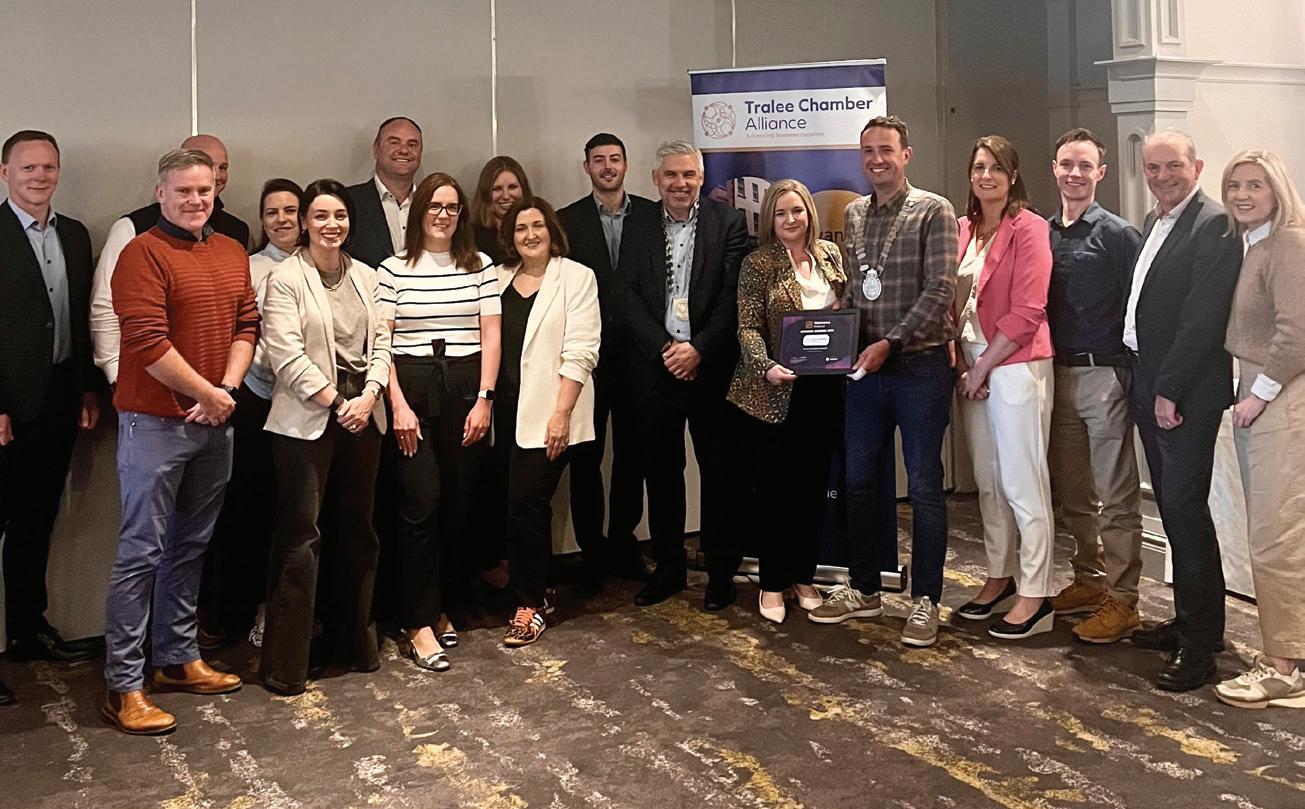
Thanks to a visionary project led by Tralee Chamber blending heritage conservation with community-led urban renewal, Tralee’s Castle Street is undergoing a powerful transformation. “Castle Street – Looking to the Past for the Future” reimagines one of the town’s most historic streets, preserving its architectural charm while creating a vibrant, people-focused space for civic life, storytelling and local pride. At the heart of the project is a deep respect for Tralee’s heritage, brought to life through collaboration between key community figures and experts, including Kerry County Council’s conservation team, Tralee Tidy Towns, local historians and the Chamber’s vibrant Tralee Sub Group. Supported by The Heritage Council and Kerry County Council, the initiative is reshaping Castle Street into a liveable, inclusive urban environment that fosters connection and economic vitality. Colette O’Connor, CEO of Tralee Chamber, describes the project as a symbol of what’s possible when communities and local authorities work together with shared purpose. The revitalisation of Castle Street aligns with Tralee’s broader goal to become a thriving, destination town –where heritage and modern life are in harmony. More than a facelift, the project is laying the groundwork for a stronger sense of place, enhanced footfall and a bright, community-driven future.
The latest Dublin Chamber Business Outlook Survey has revealed a strong and sustained commitment among Dublin businesses to Equality, Diversity and Inclusion (EDI), even amid a challenging and evolving business landscape. Based on feedback from 200 firms across the Dublin region, the findings reveal that EDI remains a strategic priority for the majority of businesses, led by engaged leadership and a values-driven culture. According to the survey, 60% of companies have either maintained or increased their EDI budgets over the past year. While 31% of respondents reported having no dedicated EDI budget, many highlighted that inclusive practices are embedded in daily operations and company culture.
Commenting on the findings, Mary Rose Burke, Chief Executive, said: “EDI is not simply a box ticking exercise, it is a reflection of the values that guide the business community in Dublin. Business leaders are committed to providing equal opportunities and maximising the potential of all employees. Strong leadership is essential to this progress.”
County Wexford Chamber has welcomed Colm Neville and the team from the Riverside Park Hotel, Enniscorthy, as its newest Corporate Partner. As a leading figure in the local hospitality sector, Colm’s portfolio extends well beyond the Riverside Park Hotel to include the vibrant Crown Quarter in Wexford town and most recently, the acquisition of Newtown Park Hotel, also in Wexford town. Each of these establishments is celebrated for its quality food, comfortable accommodation, dynamic entertainment offerings and most importantly, its commitment to customer care. Hospitality can be a demanding and fast-evolving industry, so County Wexford Chamber is particularly pleased to strengthen this partnership. The Chamber looks forward to working with Colm to better understand and represent the needs of the sector and appreciates his strong support for fellow hospitality providers across the county.


In May, Dublin Chamber’s annual Golf Day returned at Kileen Castle Golf Course, kindly sponsored by BearingPoint. It was a fantastic day of friendly competition, networking and sunshine. This year saw an incredible turnout, with 30 teams battling it out for the title of 2025 champions.

Shannon Chamber was honoured to witness the conferring of an Honorary Doctorate of Engineering on Michael Guinee, former CEO of Ei Electronics, by the University of Limerick. Chief Executive Helen Downes, who attended the conferring ceremony, said she watched with pride as this fitting tribute was paid to one of the founding chairs of Shannon Chamber and such an inspirational leader and advocate for Shannon. Under his leadership of over 35 years, Ei Electronics has become one of Ireland’s largest and most successful indigenous manufacturing and exporting companies. One of the largest employers in the Mid-West, Ei continues to buck the trend and has built a reputation for delivering market-leading innovations on a world stage.
As part of European Maritime Day (EMD) In My Country 2025, ‘Coastal Success Through Ocean Knowledge’ brought together marine experts, business leaders, policymakers and students for an evening of discussion, creativity and connection. Organised in partnership with EurOcean, JPI Oceans, EuroGOOS, EMSEA, the Marine Institute, Cobh and Harbour Chamber and the Port of Cork, the event opened with a welcome from Toddy Stafford, President of the Cobh & Harbour Chamber, followed by an introduction from Ruth Higgins of the European Centre for Information on Marine Science and Technology. Keynote speaker Majbritt Bolton-Warberg, Blue Economy Programme Manager at the Marine Institute, shared insights on the business benefits of sustainable ocean practices. Meanwhile, TY students took part in a zine-making workshop, using art and storytelling to reflect on Cobh’s coastal identity, ocean literacy and sustainability. The evening concluded with a Networking Bingo session at the quays, sparking lively exchanges between local entrepreneurs, marine professionals and civic leaders.


The Dungarvan & West Waterford Chamber has officially opened its new office at The Courthouse, Bridge Street, Dungarvan, strengthening its presence at the heart of the town’s business district. The historic premises, owned by Waterford City & County Council, offers the Chamber a central, visible and accessible base to continue its work representing and supporting businesses across the region. With strong backing from Waterford City & County Council, this relocation marks a significant milestone for the Chamber, enabling it to maintain momentum in driving initiatives like the Chamber Shopping Voucher Scheme, business advocacy campaigns, member supports and strategic collaborations. The Courthouse offers the Chamber not just a new premises but a renewed platform for growth, leadership and engagement – well-positioned to serve as a hub for the evolving business needs of West Waterford.
In association with the Cross Border Partnership Employment Services, Dundalk Chamber of Commerce held a free Business Seminar on Employment Incentives and Supports available for SMEs in the Cross Border Region in May in the Fairways Hotel. The event was a huge success with over 100 in attendance and gave employers in the border areas information on how they can be assisted with their recruitment needs. There were several speakers at the lunch including the Department of Social Protection, Cross Border Partnership Employment Services, the Department for Communities, Intertrade Ireland and the Local Enterprise Office Louth. The purpose of the event was to help increase awareness of what supports are out there for SMEs in the Cross Border Region. For more on how the Cross Border Partnership Employment Services can assist you, go to www.cbpes.com
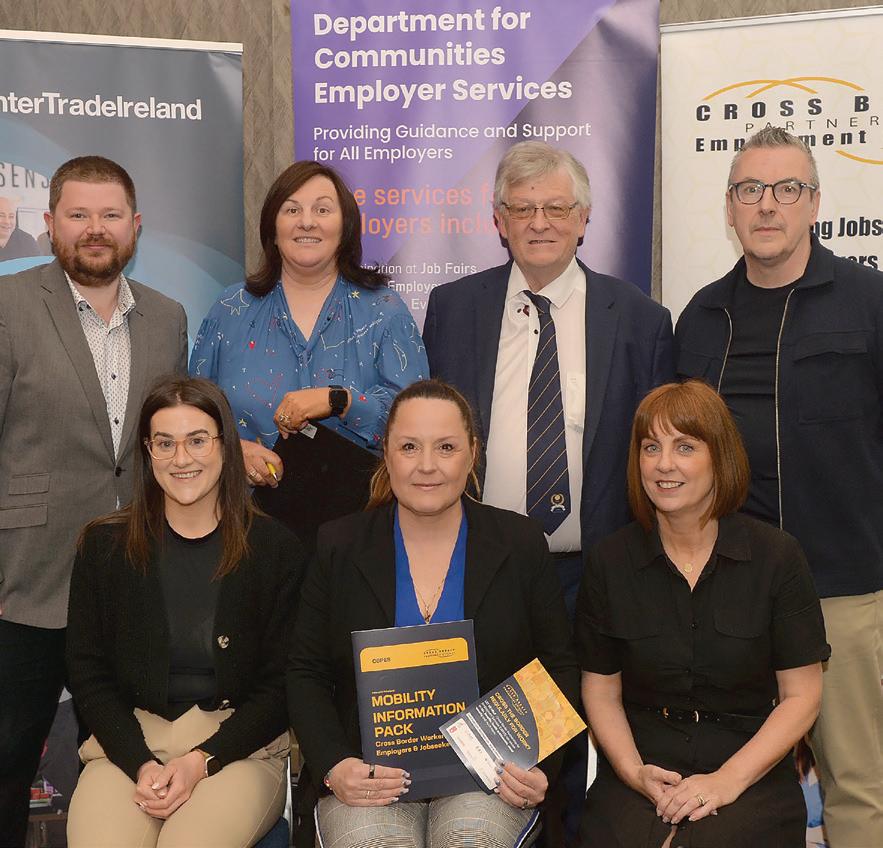
From a ‘nice to have’ to a strategic advantage, workplace wellbeing initiatives help businesses build resilience, boost retention and drive results, writes Gillian Bane
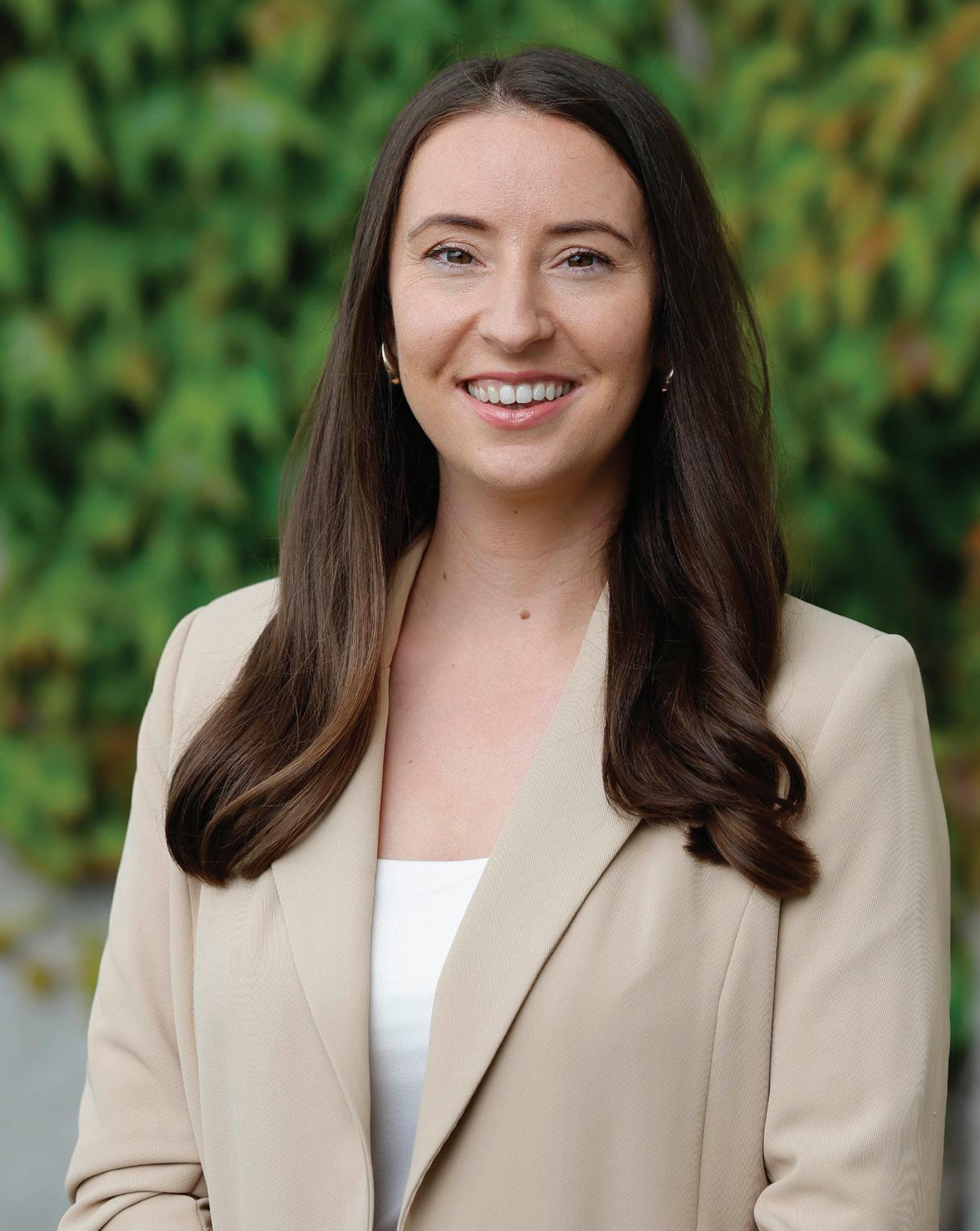
"True workplace wellbeing encompasses strategies, policies and practices that proactively support the physical, mental and social health of employees."
Workplace health and wellbeing has shi ed from a box-ticking exercise to a key driver of business performance.
No longer just a fruit bowl or yoga class, it is now a core strategy linked to better retention, lower absenteeism and higher productivity.
To unlock these bene ts – especially for small and medium-sized enterprises (SMEs) – we must go beyond surface-level perks and take a more comprehensive approach.
Traditionally, workplace wellbeing focused on supporting individual health through tools like Employee Assistance Programmes (EAPs), step challenges or once-o wellbeing webinars. While certainly useful, they o en overlook the wider work environment that shapes employee health.
True workplace wellbeing encompasses strategies, policies and practices that
proactively support the physical, mental and social health of employees. It is embedded in how people work and interact each day – from work design and team dynamics to leadership decisions and organisational culture.
Post-pandemic, stress and burnout have surged, with work cited as a key contributor.
In 2024, CIPD reported that over half of Irish organisations identi ed excessive workload and poor management support as key drivers of mental health issues. Addressing these can reduce absence and turnover – especially as Deloitte estimates the average annual cost of poor mental health at £5,379 per employee in the nancial services sector. It is clear this isn’t just a wellbeing issue – it’s a business issue and it’s impacting the bottom line.
The business case: ROI and VOI
While inaction carries a cost, investment delivers a strong return. Deloitte found that for every £1 invested in employee mental health, employers gained an average return of
£4.702 – thanks to reduced absenteeism, sta turnover and healthcare costs. Interventions focused on culture change and raising mental health awareness yielded the highest ROI, up to £6.30 per £1 invested.
However, the bene ts go beyond nancial returns as the value on investment (VOI) should also be considered. is is the broader, less tangible outcomes such as improved morale, higher engagement and a more adaptable workforce. In today’s uncertain economic climate, a wellbeing culture is crucial for resilience and can also support business priorities like employer branding and ESG goals.
To maximise both ROI and VOI, organisations that take a proactive, strategic and culture-driven approach see the biggest impact. Equipping leaders and managers with wellbeing intelligence is also essential – one study found that manager mental health training reduced sickness absence, yielding £9.98 for every £1 invested.
The importance of strategy and culture
Making wellbeing work takes more than good intentions – it requires a clear, structured approach. Yet in Ireland, uptake remains low. At the launch of the Healthy Workplace Framework in 2021, Healthy Ireland reported that only 32% of companies had a formal wellbeing strategy in place. at’s exactly what the framework aims to change. is national initiative provides a free, practical roadmap to help businesses embed wellbeing into strategy, operations and culture. It guides employers through steps like leadership buy-in, needs assessment and targeted action – creating a path that is achievable for all businesses. However, even the best strategy will struggle without the right culture behind it. As Peter Drucker famously said, “culture eats strategy for breakfast.” is is especially true for wellbeing, where well-designed initiatives, like mental health training, quickly lose impact if employees are too busy to attend. Culture de nes how people behave, what is valued and what is accepted. Since workplace behaviour is o en modelled from the top, leaders and managers play a critical role. ey need training and support to lead by example – without it, even well-meaning actions can unintentionally harm employee wellbeing.
Organisations realise that the health of their workforce is productivity, innovation and business growth. The range of workplace health and wellbeing policies programmes operating in Ireland has grown. However, limited intelligence on the quality and reach of these programmes, and limited structures in place to support their development and evaluation. It is not clear to what degree expansion of programmes may be contributing to better health and to addressing health inequalities. A government-led strategic framework is now essential to guide activity so that health and wellbeing initiatives in the develop in an effective way. The development of Framework has been led by the Department of Health support of the Department of Enterprise, Trade and Employment.
Ireland Strategic Action Plan
2021–202513 the importance of a settings-based approach to sets out the high level objectives for the Healthy Framework from 2021-2023.
"To bridge the gap, Chambers Ireland has partnered with Healthy Ireland to create a dedicated Healthy Workplace Co-ordinator role."
Supporting SMEs to close the gap
Despite the clear case for action, many SMEs struggle to engage with workplace wellbeing in a meaningful way. A 2023 research report from Chambers Ireland found that SMEs o en face barriers such as lack of awareness and resource and cost restraints. Yet these are also the businesses that stand to gain the most from strategic wellbeing investment –through improved retention, productivity and resilience.
To bridge the gap, Chambers Ireland has partnered with Healthy Ireland to create a dedicated Healthy Workplace Co-ordinator role. is initiative is designed to support SMEs with free and practical guidance on how to implement the Healthy Workplace Framework. Over the next few years, Chambers Ireland will work directly with the network o ering training, toolkits and expert advice to help businesses take con dent steps forward.
Workplace wellbeing has evolved from a perk to a strategic priority – with clear bene ts for both people and performance. With targeted support and tools like the Healthy Workplace Framework, businesses can build resilience, boost retention and drive results. Ultimately, wellbeing is not a standalone HR initiative – it is a lens through which we lead, manage and grow our businesses.
Gillian Bane is Healthy Workplace Co-ordinator at Chambers Ireland
Workplaces in Ireland
32%
have a formal health & wellbeing strategy
84% reported an employee assistance programme
45% have mental health support
44% have onsite wellbeing initiatives
There is no database of workplaces engaged in health and wellbeing programmes in Ireland. The HR Practices in Ireland 2020 survey carried out by the Chartered Institute of Personnel
(CIPD) found that 32% of workplaces have a
Development
County Wexford is an exceptional place to live, work and do business, says CEO Paula Roche
How long have you held the role of CEO at County Wexford Chamber?
I’ve had the privilege of leading County Wexford Chamber as CEO since March 2024. Coming from the corporate sector, I brought a strong understanding of the challenges facing multinationals. Engaging with solopreneurs and SMEs was newer to me, but it’s been an incredibly rewarding journey. The support, ambition and sense of community among Wexford’s businesses is genuinely impressive – and it’s a real honour to work alongside them, supported by such a dedicated Chamber team and an engaged, forward-thinking Board.
How is business in the region?
Overall, there’s a strong sense of momentum across County Wexford right now. We’re seeing growth in medtech, manufacturing and professional services, while continuing to build on our strengths in agri and food production. Rosslare Europort – our vital gateway to Europe – has experienced significant growth postBrexit and is fast becoming a key strategic asset, particularly with its plans to develop an Offshore Renewable Energy hub. It’s also great to see much of our hospitality sector now in local ownership.
How important is the agreement between Wexford County Council and the Chamber of Commerce?
Our collaboration with Wexford County Council, formalised through the Heads of Agreement, is hugely significant. It cements a shared commitment to supporting enterprise, driving economic development and ensuring the business voice is reflected in local decision-making. With the support of Chief Executive Eddie Taaffe and his team, this partnership enables more joined-up thinking and improved access to practical supports that can make a real difference for businesses across the county.

How does the Chamber respond to the needs of its members?
Since unifying four regional chambers into one, maintaining strong local representation has been key. Our team remains active in Wexford, New Ross, Gorey and Enniscorthy districts, offering on-the-ground support and local insight. Through events, surveys, one-toone meetings and policy-led forums, we stay in tune with what matters most to our members.
What are the main challenges facing businesses in Wexford?
Rising operational costs remain the biggest concern – particularly for SMEs, indigenous businesses and hospitality, where pressure on margins is persistent. Challenges around infrastructure, housing and transport connectivity continue to hold us back from realising our full economic potential. We’re proactive in advocating for solutions on behalf of the business community. We lobby for targeted Government investment to support regional growth and also push for action on practical issues – like the taxi shortage, which is directly impacting the night-time economy.
As Chief Executive, what are your ambitions?
After 20 years in the corporate world, I’ll admit I had tunnel vision – I wasn’t fully aware of the incredible businesses thriving around me. Becoming CEO of County Wexford Chamber changed that completely. I now have the privilege of engaging with businesses across the county and using my platform to champion County Wexford as an exceptional place to live, work and do business. My ambition is to position County Wexford Chamber as a dynamic, forward-thinking organisation that shapes a thriving, inclusive business environment where companies of all sizes feel supported and empowered. The Offshore Renewable Energy hub at Rosslare Europort, the new Trinity Wharf business district development and the new SETU Wexford Campus, all have the potential to transform our region. Our members see that potential – my goal is to ensure the rest of the country, and beyond, does too.









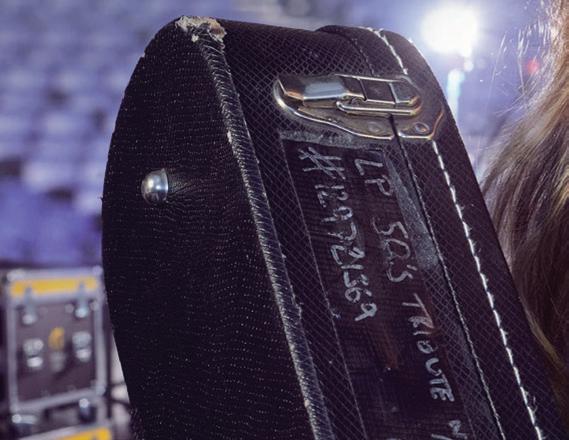







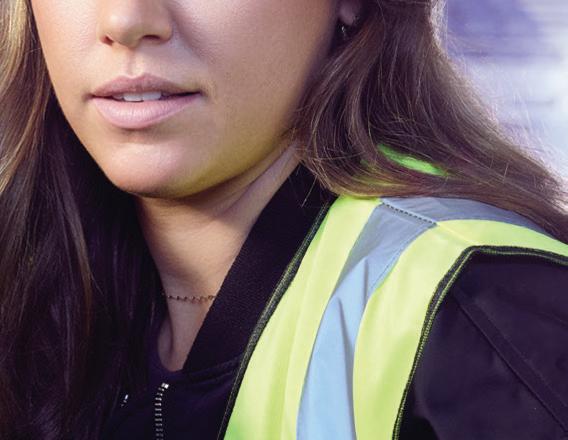

















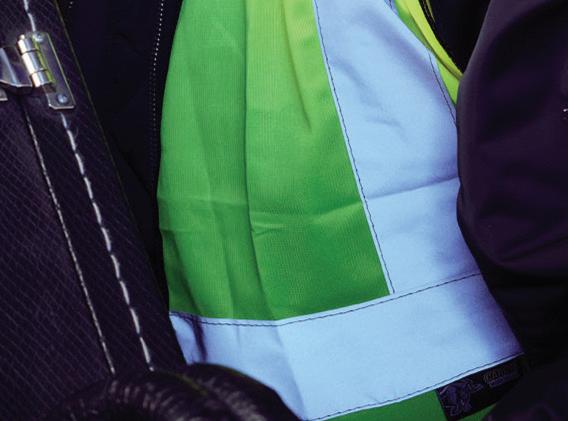

→ 0818 47 88 33 Monday to Friday 9am - 5pm Our flexible loans help you realise the future you want for your business. Talk to us today.













Siofra McGuinness McGuinness Trucking





Ciara Ryan, Head of Wealth at AIB, on why financial planning matters for every business owner
Behind every small business lies a vision. One often fuelled by resilience, creativity and an unwavering belief in building something of lasting value. For Ireland’s female entrepreneurs, these qualities are unmistakable. These women are leading companies, creating jobs and driving economic growth. Yet beneath the ambition and energy, many are carrying a quiet burden – a lack of financial security.
New research conducted by AIB reveals just how widespread this challenge is among female business owners. Over half of respondents said they do not feel financially secure. Fewer than one in three believed their business could survive a financial shock. Almost 30% said that if they, as the owner, were suddenly unable to work, they would have no choice but to shut their doors entirely.
While the study focused on women, these issues are not unique to female entrepreneurs. Many small business owners across Ireland, regardless of gender, share the same concerns. Running a business comes with immense day-to-day pressures and financial planning often falls to the bottom of the list. But as this research shows, the cost of putting it off can be significant.
At AIB, we have long supported Irish businesses through every stage of their journey. What this research brings into sharper focus is that planning for the future isn’t just about protecting the bottom line. It’s about building confidence. Confidence to grow, to invest, to retire well and to protect everything that’s been worked for.
The findings uncovered a disconnect between personal and business financial planning. While 73% of the female respondents had a personal pension in place, just 30% had a pension through their business. An overwhelming 81% did not feel prepared for retirement and 62% said they would welcome

help, but many cited times, complexity or simply not knowing where to start as key barriers.
"While the study focused on women, these issues are not unique to female entrepreneurs. Many small business owners across Ireland, regardless of gender, share the same concerns."
That lack of preparation is not a result of disinterest. In fact, the research shows there is strong appetite to take action. Over a third of respondents want to plan more effectively for retirement and more than half expressed a desire to become financially secure. Nearly half are actively exploring investment or funding opportunities to grow their business. This signals real intent, but it also points to a need for greater access to practical, personalised advice that supports these ambitions. Wealth planning is often perceived as something only relevant to large or well-established businesses. But this misconception can prevent small business owners from accessing support that could make a meaningful difference. A striking 40% of female business owners surveyed had no wealth products in place through their business. Among those who didn’t, the main reason cited was cost (48%), followed by a belief that their business was too small (43%). Others pointed to a lack of time (32%) or confusion about what products were appropriate (26%).
However, when asked what would motivate them to engage, the answers were clear: 56% said tax incentives would encourage them, 38% wanted a better understanding of how wealth
products could support their business and 30% would take action if the advice they received was tailored to their situation. These responses show that the interest is there and that the right kind of support could unlock real progress.
“Financial confidence goes beyond numbers,” explains Ciara Ryan, Head of Wealth at AIB. “It’s about feeling secure, supported and understood. When you’re running a small business and watching every cent, the idea of long-term planning can feel out of reach. But it doesn’t have to be that way. With tailored advice and a clear roadmap, business owners can take meaningful steps to protect their future.”
That sentiment is echoed by leading voices in the entrepreneurship space. “At Awaken Hub, we consistently see women building exciting, high-impact businesses,” says cofounder Sinéad Crowley. “But there is still a gap in confidence when it comes to owning and planning for financial success. It’s not just about access to advice, it’s about relevance. Women need solutions that reflect their realities and the confidence to know they belong in these conversations.”
Amy O’Sullivan, President of Network Ireland, agrees. “Despite the incredible work being done by women across every industry, financial security remains a recurring concern. These findings highlight a systemic issue, not just a personal one. Through initiatives like this research and our collaboration with AIB, we are working to break down barriers, shift mindsets and equip women with the tools they need to take control of their financial future.”
It’s clear that many entrepreneurs are
building strong businesses without the financial safety nets that could provide stability and open new doors. That’s where financial planning becomes more than a service – it becomes a strategy for long-term growth, protection and peace of mind.
At AIB, we work closely with business owners to develop financial strategies that reflect the reality of their work. That might mean helping them establish a company pension plan, protect against unforeseen risks or extract profits from their business in a taxefficient way. It could also involve reviewing their succession planning or investment options to ensure their business is working just as hard for their personal goals as it is for their commercial ones.
Your business is an incredibly important asset, but so are you. It’s time to protect both. Because when business owners feel financially secure, they have the freedom to innovate, expand and lead with confidence.
For guidance tailored to your unique business and personal needs, contact us at 01 771 5867 to schedule a chat with an AIB Financial Advisor. Whether in-person at an AIB Branch or virtually, our advisors are ready to support you on your journey towards financial security and succession success.
Allied Irish Banks, p.l.c. is tied to AIB life for life and pensions business. Allied Irish Banks, p.l.c. is regulated by the Central Bank of Ireland. Saol Assurance d.a.c., trading as AIB life is regulated by the Central Bank of Ireland. Allied Irish Banks, p.l.c. has a 50% holding in Saol Assurance d.a.c.

"With
tailored advice and a clear roadmap, business owners can take meaningful steps to protect their future.”

CHRISTINE CRAWFORD explains how Uisce Éireann is helping businesses of all sizes future-proof their operations, reduce costs and lead on sustainability
"As Irish businesses navigate rising operational pressures, climate change and regulatory shifts, one critical area is coming into sharper focus – water."
In today’s fast-evolving business landscape, sustainability is no longer a ‘nice to have’, it’s a core part of long-term success. As Irish businesses navigate rising operational pressures, climate change and regulatory shifts, one critical area is coming into sharper focus – water.
Often underestimated due to its relatively low direct cost, water is a hidden lever of competitive advantage. From energy use to operational resilience, water touches nearly every part of a business. That’s why Uisce Éireann is proud to offer the Business Water Stewardship Programme, a national initiative designed to support organisations
of all sizes to use water more efficiently, reduce costs, and prepare for a more sustainable future.
Whether you’re a small café or a large pharmaceutical plant, our programme provides fully funded, practical supports tailored to your needs and it’s already delivering impact across the country.
Why Now? The Strategic Case for Business Water Stewardship
Ireland is at a pivotal point. Infrastructure demands are intensifying due to housing growth, economic expansion and climate impacts. At the same time, water-related risks from drought to flooding are becoming more frequent. Add to this the evolving reporting and regulatory landscape and it’s clear that businesses must now treat water with the same seriousness as energy or carbon.
As part of our THRIVE strategy, Uisce Éireann is committed to supporting a low-carbon, climate-
resilient economy. That includes helping businesses adapt and lead. By offering free water stewardship supports, we’re helping organisations strengthen their resilience, unlock cost savings and boost their ESG performance, all while contributing to national climate and water resilience goals.
We believe that every business, regardless of size or sector, should have access to expert support. That’s why our Water Stewardship Programme offers a range of learning and support tools, from short online courses to hands-on workshops – all fully funded in partnership with the Sustainable Enterprise Skillnet.
» SME Programme – A 60-minute online course packed with simple, actionable tips. Designed with time-pressed small businesses in mind
» Certified Water Stewardship Programme – An 8-week accredited course for medium to large businesses looking to embed sustainability at a deeper level
» Accelerator Programme – A hands-on, funded support initiative for large industrial users, covering audits, regulation readiness, and funding advice
» Annual Health Check – A yearly refresh for programme graduates, helping them track KPIs, stay on top of water performance, and go even further.
We’ve also developed bespoke guides for key industries including retail, hospitality, food and drink, manufacturing and more – all available for free at www.water.ie/stewardship. To date, we’ve supported over 1,000 companies, enabled more than 2,000 water-saving projects and seen an average 25% water reduction among businesses completing our Health Check. In fact, 96% of participating businesses now track water KPIs, a key step toward future compliance and resilience.
This year, we launched a new tier of support –the Advanced Water Stewardship Programme, created specifically for high-volume water users and businesses regulated under Trade Effluent licences. This innovative programme includes drainage mapping, audits and support to create Water Charters aligned with best practice. It’s designed to help companies not only improve their water efficiency but actively contribute to better water quality outcomes, a growing regulatory and reputational priority.
To find out more and to register, please visit: water.ie/advancedws
Uisce Éireann’s Water Stewardship Programme has been recognised by leading business bodies including Chambers Ireland IBEC, IDA Ireland and Enterprise Ireland. Participation is increasingly seen as a badge of honour on a business’s sustainability journey, offering reputational value alongside practical benefit. Our goal is to position water stewardship as a shared national effort, where every business, big or small, has a part to play in securing Ireland’s water future. With pressures on supply growing, particularly in highstress areas, action from the business community is more important than ever.
Running a business is tough. Between rising costs, compliance requirements and shifting customer expectations, time and resources are tight. That’s why our programme is free, tailored and designed around real business needs. We understand the pressures you face and we’re here to help. With expert support, practical tools and sector-specific guidance, water stewardship can be one of the easiest, most rewarding sustainability steps your business takes.
To get started or learn more, visit www.water.ie/stewardship
Christine Crawford is Water Stewardship Programme Manager at Uisce Éireann
"We understand the pressures you face and we’re here to help. With expert support, practical tools and sectorspecific guidance, water stewardship can be one of the easiest, most rewarding sustainability steps your business takes."

CHAMBER FEATURE

House of Waterford’s esteemed factory is the beating heart of Waterford’s crystal manufacture and is where our most intricate and masterful crystal pieces come to life. The factory is located in the heart of Waterford City, a Viking city built in 914 AD, surrounded by a cluster of museums that detail the proud history of this great city. Explore the intricate process of crystal manufacturing through our guided factory tour which allows visitors to experience the exceptional skill of our elite master blowers, cutters, sculptors and engravers, some of whom have been honing their skills for over 45 years.
Witness how our crystal masterpieces are crafted using centuries-old techniques, transforming molten crystal into glistening works of art. Inside the retail store, you can explore Waterford’s full catalogue of products, including the Lismore pattern which has been a staple of Waterford’s since 1952. The trophy display gives visitors the opportunity to experience the beauty of some of the world’s most recognisable sporting trophies like the Irish Open Trophy and the Aer Lingus College Football Classic trophy. The Waterford Café offers a welcoming space
Crafted since 1783, Waterford continues to be at the forefront of exquisitely designed and expertly crafted crystal creations

"Witness how our crystal masterpieces are crafted using centuries-old techniques, transforming molten crystal into glistening works of art."

to unwind and savour delicious local produce, served on the finest Wedgwood China –including our elegant afternoon tea experience. Guests can also enjoy a cocktail or a glass of champagne at the Waterford Bar.
Factory tours run daily until 4:15 pm. Book your experience online at www.houseofwaterford.com
For Chambers across the country, a trip to Edinburgh reinforced their commitment to meeting Ireland’s climate targets, writes Abbie Brennan
How can we grow our economy while also leading the way on renewable energy? That was the guiding question behind a recent two-day fact-finding mission to Edinburgh, led by Chambers Ireland. Chief Executives from across the Irish Chamber Network travelled to learn from best practices in energy policy, university-industry collaboration and economic development.
To start off, we visited Edinburgh Innovations, the University of Edinburgh’s commercialisation service, which plays a key role in turning academic research into real-world impact. The delegation was welcomed by Andrew Aveyard, Energy Sector lead, who provided an overview of his work across several key areas – supporting academic spinouts, building a skilled workforce to meet the demands of a growing energy sector and advancing cutting-edge research in offshore and renewable energy.
One of the most unique facilities for marine energy research at EI is the FloWave Research facility. The delegation toured the facility and witnessed firsthand how it has been used to support cutting-edge projects, namely by simulating complex ocean conditions with exceptional precision. This enables them to test the performance and durability of tidal and wave energy devices in realistic, repeatable environments.
The Consulate of Ireland in Edinburgh plays an important role fostering economic, cultural and diplomatic
connections between both countries.
The delegation met with Consul General Jerry O’Donovan, who spoke about deepening collaboration in trade and the shared ambition for a greener economy. Later, the Edinburgh Chamber of Commerce presented its “Call to Action” framework. This is a practical initiative aimed at driving inclusive economic growth by supporting local businesses, upskilling the workforce and addressing regional inequalities. This stimulated conversations around how similar strategies could be adapted to support balanced growth in Irish regions.
The visit concluded at the Port of Leith, Scotland’s largest renewable energy hub. Significant investment has transformed the port into a vital marshalling base for offshore wind projects, including the 2.9 GW Morven Offshore Wind Farm, which is expected to power over three million homes upon completion. The port represents a key strategic pillar in the Scottish
economy; alongside its role in facilitating renewable energy, considerable employment is projected to arise from this investment.
Reflecting on the visit, we returned from Edinburgh with an overarching acknowledgment that more can and should be done to meet our climate targets. As we strive to meet those targets and bridge the remaining gap, Chambers across the country remain committed to playing a proactive role in delivering a just and timely green transition across our regions and ensuring that businesses are not only part of the solution, but leaders in shaping it.
Abbie Brennan is Policy and Research Associate at Chambers Ireland.
"One of the most unique facilities for marine energy research at EI is the FloWave Research facility. The delegation toured the facility and witnessed firsthand how it has been used to support cutting-edge projects, namely by simulating complex ocean conditions with exceptional precision."


While other countries scramble, Irish businesses have a secret weapon in the fight for talent.
August 2025 finds Irish companies traversing a changed talent landscape with unexpected benefits. Ireland’s embrace of hybrid working (with 59% of professionals now working hybrid models) has positioned Irish employers ahead of global competitors still wrestling with remote work policies. And this is unlikely to change, with 92% of Irish workers likely to change jobs if flexibility isn’t offered, making flexible arrangements non-negotiable for keeping your top talent.
Yet Ireland faces the same demographic reality as its neighbours: 42% of organisations now have over half their workforce operating hybrid models, while an aging workforce exits faster than young talent enters. The Baby Boomer retirement wave, combined with evolving expectations from digital-native workers, creates both talent gaps and opportunity.
The skills shortage impacts every sector
Businesses across tech, construction, healthcare, and retail report longer hiring cycles, higher training costs, and risks to digital transformation goals. And traditional HR systems often fail to meet younger employees’ expectations for learning, wellbeing, and career growth.






The country’s progressive approach to hybrid working has created a blueprint for attracting talent from across Europe and retaining homegrown expertise. Companies offering genuine flexibility, supported by efficient HR systems, consistently outperform those clinging to outdated models.
BrightHR helps you grow and attract top talent by streamlining absence management and freeing HR teams to focus on skills development, career planning, and employee engagement. Our platform supports flexible working, tracks training opportunities, maps skills progression, and drives wellbeing initiatives that keep talent loyal.
See how BrightHR’s intelligent platform turns your progressive approach into measurable results. Scan the QR code to book your free demo and discover why forward-thinking Irish employers choose BrightHR.


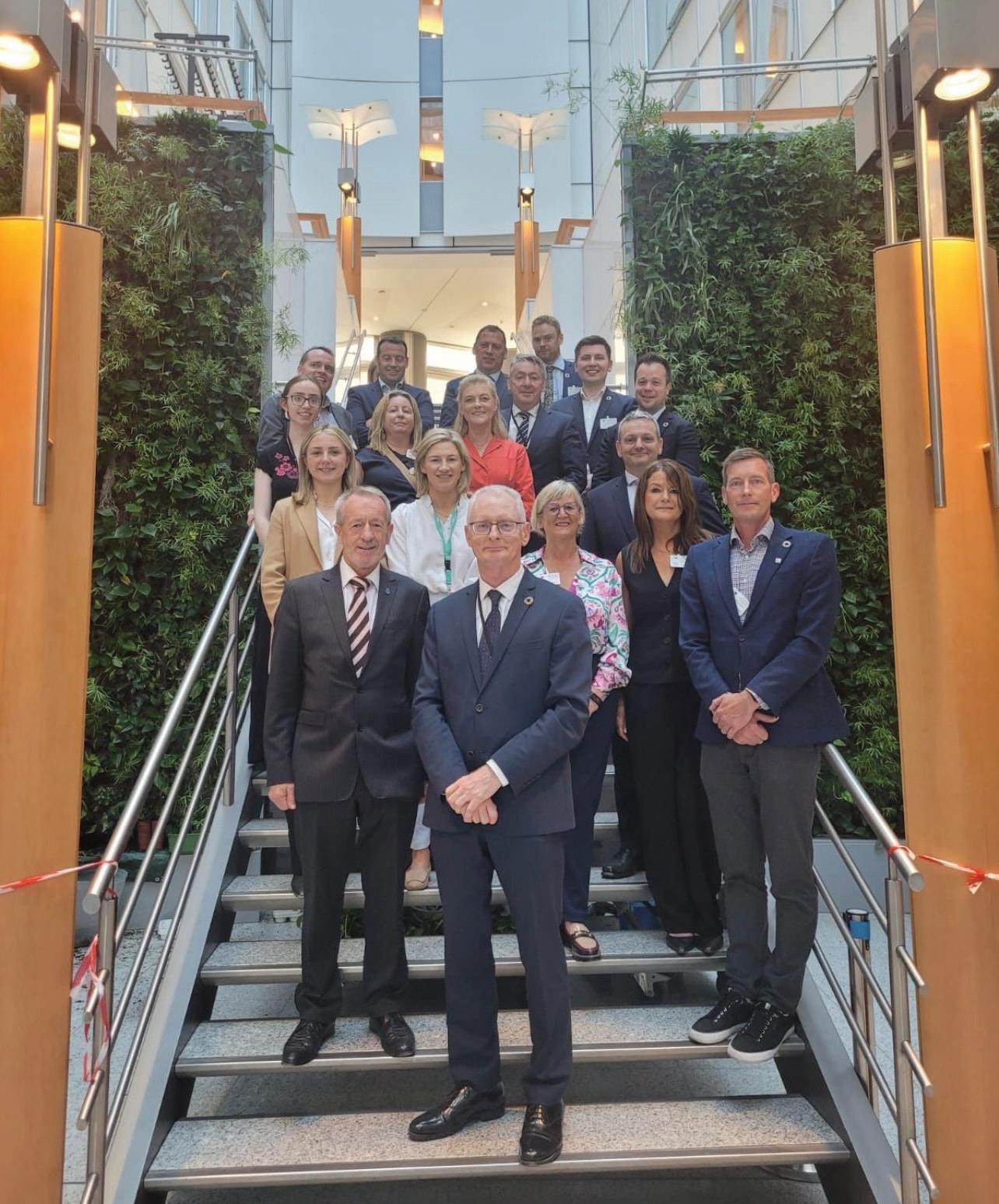
How can Irish companies enhance their competitiveness within the European Union asks Abbie Brennan, Policy and Research Associate at Chambers Ireland
Shaping policy is a core activity of the Chamber Network and engaging with the EU institutions is critical to making sure our voice is heard at all levels. In June, Chambers Ireland led a delegation to Brussels to meet with highlevel officials from the European Commission, the Permanent Representation of Ireland to the EU and Irish members of the European Parliament. The purpose of this visit was clear – to reinforce the message that competitiveness must remain the top priority for both the European Union and Ireland.
"Now more than ever we need a Union that champions innovation, supports SMEs and builds resilience – not one that lets red tape stall progress."
In today’s shifting geopolitical landscape, the focus on competitiveness is essential. Meeting with Commissioner Michael McGrath, the group discussed the implications of the Draghi and Letta reports, which outline strategic recommendations for strengthening the EU’s economic resilience. Irish companies, particularly SMEs, stand to benefit from these efforts by enhancing supply chain security, expanding access to cross-border funding, simplifying regulatory barriers and unlocking new growth opportunities in digital and green markets.
Energy security was a key area of focus. Meeting with Tadhg O’Briain, the delegation received an update on the EU’s Affordable Energy Action Plan, a crucial initiative aimed at ensuring affordable, reliable and sustainable energy across the Single Market.
Trade and market diversification were also high on the agenda. Nuno Sousa highlighted the importance of advancing the EU Free Trade agenda, which provides much-needed certainty for businesses operating across borders. Meanwhile, Paul Kruis emphasised the growing need for a coordinated EU approach to security and defence, including cyber security, as a fundamental pillar of competitiveness. He stressed that protecting essential infrastructure is not only vital for economic resilience but also for maintaining investor confidence and ensuring the uninterrupted functioning of the Single Market.
The delegation also met with officials from the Permanent Representation of Ireland to the EU, who offered valuable insights into the preparations underway for Ireland’s upcoming EU presidency. To round off the visit, Seán Kelly MEP hosted a breakfast event with Irish MEPs and Chamber representatives, where they discussed EU priorities across a whole range of topics including providing certainties for companies in the face of US tariffs, energy security and the necessity of the Unified Patent Court in providing greater intellectual property protection for more businesses.
Reflecting on the visit, the big question is – what kind of EU do we want to help shape? Our message is clear. Now more than ever we need a Union that champions innovation, supports SMEs and builds resilience – not one that lets red tape stall progress. The Chamber Network will continue to work with representatives in Brussels to ensure that competitiveness remains front and centre of the EU agenda.
Cork Chamber was named Chamber of the Year at the 2025 Chamber Awards, hosted by Chambers Ireland and proudly sponsored by Zurich

The annual awards celebrate the outstanding work of Chambers throughout the country in supporting business at local, regional and national level. Cork Chamber stood out for its high level of activity, innovative initiatives and strong engagement with its members and the wider community.
President of Chambers Ireland, Margaret Considine, praised the achievement: “Being named Chamber of the Year is testament to the scale of work being undertaken by Cork Chamber. It reflects the huge amount of talent and dedication within the Chamber and underlines how impressively they have managed and adapted their activity to meet the needs of their members.
“What truly impressed our judges was the extent of Cork Chamber’s engagement with its members. This is a team of strong communicators and relationship builders who care deeply about the businesses of Cork. The Chamber delivered a series of excellent events, projects and lobbying campaigns that undoubtedly contributed to the city and surrounding region. Overall, the quality of the applications from all Chambers in all categories showed the high level of work being done across the country.”
Joe Creegan, Head of Corporate Life and Pensions at Zurich Ireland, also shared his support: “Zurich is delighted to once again support the annual Chamber Awards. It is more important than ever to acknowledge the excellence of the Chamber network and the resilience of their members as they continue to support local economic development. We are proud to be associated with these awards and to support the important work Chambers undertake in fostering a vibrant business community of all sizes and sectors across Ireland.”

The Chamber Awards not only recognise the achievements of the Chambers Ireland network but also offer a platform to highlight successful campaigns, events and policies that contribute to the growth of chambers and businesses throughout the country.

All projects, including shortlisted projects, can be accessed here or on the link below https://chambers.ie/award-magazines/
“What truly impressed our judges was the extent of Cork Chamber’s engagement with its members. This is a team of strong communicators and relationship builders who care deeply about the businesses of Cork."
President of Chambers Ireland, Margaret Considine
Pictured (l to r): Margaret Considine, President, Chambers Ireland; Tommy Hogan, CEO, Athlone Chamber; Regina Bushell, President, Athlone Chamber; Joe Creegan, Head of Corporate Life and Pensions, Zurich Ireland; Ian Talbot, Chief Executive, Chambers Ireland

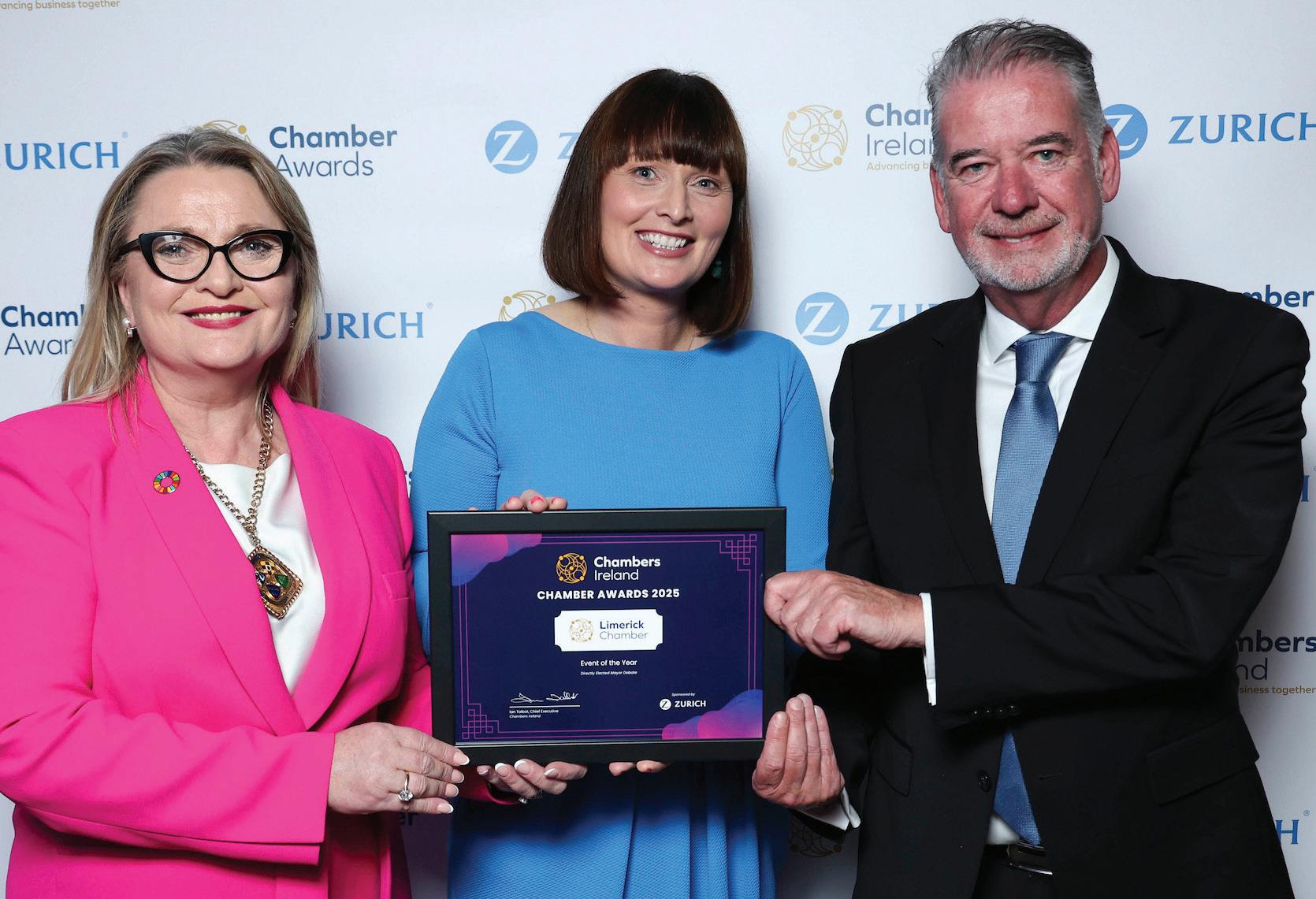
LOCAL AUTHORITY
ENGAGEMENT
County Tipperary Chamber
Clonmel Community Conversations on Substance Use
Pictured (l to r): Margaret Considine, President, Chambers Ireland; Michelle Aylward, CEO, Tipperary Chamber; Joe Creegan, Head of Corporate Life and Pensions, Zurich Ireland
Pictured (l to r): Margaret Considine, President, Chambers Ireland; Michelle Gallagher, CEO, Limerick Chamber; Joe Creegan, Head of Corporate Life and Pensions, Zurich Ireland

Building trade links with Markischer Kreis, Germany
Pictured (l to r): Margaret Considine, President, Chambers Ireland; Gerald Hurley, CEO, Waterford Chamber; Lynda Lawton, Operations Manager, Waterford Chamber; Michael Lynagh, Office Coordinator, Waterford Chamber; Joe Creegan, Head of Corporate Life and Pensions, Zurich Ireland


Pictured (l to r): Margaret Considine, President, Chambers Ireland; Lorcan Kinsella, Past President, County Wexford Chamber; Paula Roche, CEO, County Wexford Chamber; Joe Creegan, Head of Corporate Life and Pensions, Zurich Ireland
Pictured (l to r): Margaret Considine, President, Chambers Ireland; Cathal McSweeney, Director, Public and International Affairs, Cork Chamber; Aoife Moriarty, Public Affairs & Communications Executive, Cork Chamber; Joe Creegan, Head of Corporate Life and Pensions, Zurich Ireland


Castle Street
Looking to the Past for the Future
Pictured (l to r): Margaret Considine, President, Chambers Ireland; Stephen Stack, President, Tralee Chamber Alliance; Martha Farrell, Company Secretary, Tralee Chamber Alliance; Joe Creegan, Head of Corporate Life and Pensions, Zurich Ireland
Embedding Biodiversity in Business: Cork Chamber's Commitment in Action
Pictured (l to r): Margaret Considine, President, Chambers Ireland; Dr Alicia Mateos-Cárdenas, REEValue & Sustainability Lead, Cork Chamber; Naoimh Frawley, Director of People, Operations & Governance, Cork Chamber; Joe Creegan, Head of Corporate Life and Pensions, Zurich Ireland


Pictured (l to r): Margaret Considine, President, Chambers Ireland; Lorcan Kinsella, Past President, County Wexford Chamber; Paula Roche, CEO, County Wexford Chamber; Anne Dwyer, Development Officer, County Wexford Chamber; Deirdre O’Flynn, Development Officer, County Wexford Chamber; Joe Creegan, Head of Corporate Life and Pensions, Zurich Ireland




As one of Ireland’s largest independent SME funders and a family run-business, we are proud to win the title, the Financial Services Company of the Year by the Chambers Ireland InBusiness Recognition Awards.
We truly understand what it takes to build and grow an Irish business and for 20 years we have provided specialist, flexible working capital finance, supporting businesses like yours with everything from improving cashflow and investing in new equipment to trading internationally.
Whether you need funding for growth and expansion, corporate restructuring or mergers and acquisition transactions, we offer tailored solutions to meet your unique needs. Choose us as your award-winning funding partner, and we’ll fuel your business ambitions.




To partner with us call 01 297 4911 or visit bibbyfs.ie
Providing tailored funding solutions to SMEs with a people-first approach and a passion for helping businesses grow
Bibby Financial Services is proud to be named Financial Services Company of the Year by Chambers Ireland, a recognition of our unwavering commitment to Ireland’s SMEs. For over 20 years, we’ve built trusted relationships with customers and partners across the country, grounded in a people-first approach and a passion for helping businesses grow.
As Ireland’s largest independent provider of funding solutions to SMEs, we exist to remove the barriers that too often stand between SMEs and their goals. On average, Bibby Financial Services facilitates over €1 million a week in new funding limits to help small and medium businesses manage cashflow, expand their services, plan investments, refinance, or navigate buy-ins and buy-outs.
Access to finance remains a challenge for business owners. Our recent SME Business Confidence survey found that nearly half of SMEs reported increased difficulty securing funding in the past six months.
We meet businesses where they are and help them get where they want to go.
We also launched Cashflow Advance in 2024, a new topup solution that provides up to 100% of a client’s approved sales ledger. This supports crucial growth, seasonal needs, and strategic transitions like mergers, acquisitions, and restructures.
Bibby Financial Services is a people-led business committed to supporting the growth of small and medium enterprises. With a team of over 35 experts in Ireland, we provide financial solutions to businesses with an annual turnover from €750,000. As part of the Bibby Financial Services Group, we boast a total funding capacity exceeding £1 billion, making us a trusted partner for businesses seeking financial support.
At the heart of our operations are customer satisfaction and service quality. Our dedication to excellence is reflected in our Net Promoter Score of +57 and a 100% client satisfaction rate. We believe in direct communication, striving to understand each customer’s sector and ambitions

to tailor solutions that foster their growth.
Our commitment to a positive future and living by our values is embodied in Project Compass, a company-wide initiative. With the vision to be “a family business, known for creating a better future together,” Project Compass guides us through four key areas: caring for the environment, delivering great service, creating a positive experience for people, and contributing to our communities.
As a specialist financier, Bibby Financial Services plays a vital role in Ireland’s financial services ecosystem, with strategic partnerships being key to scaling our impact. Our long-standing collaboration with the Strategic Banking Corporation of Ireland (SBCI), active since 2016, has directly empowered SMEs across the entire country, enabling them to access millions in daily funding. We’re proud to be the only invoice finance provider in their liquidity scheme. In addition, our exclusive partnership with PTSB brings invoice finance services to their business customers, enhancing cashflow and fuelling growth.
Being named Financial Services Company of the Year by Chambers Ireland recognises more than performance, it celebrates our human approach, our commitment to SMEs, and our belief that finance should be a bridge, not a barrier. We’re honoured to be recognised for doing what we do best: helping ambitious businesses grow with confidence.





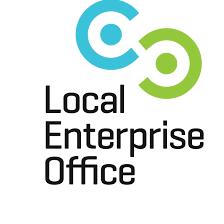

Enterprise Europe Network Ireland is playing a key role in helping SMEs connect, innovate and scale internationally according to Patrick Sweeney, National Coordinator, EEN
As Irish small and medium-sized enterprises (SMEs) look beyond domestic markets for growth opportunities, the Enterprise Europe Network (EEN) plays a key role in helping them connect, innovate and scale internationally. In a business landscape shaped by the triple transition - sustainability, digitalisation, and resilience - global collaboration is no longer optional. It is essential.
When was the EEN established in Ireland, and who are its key partners
“The Enterprise Europe Network was launched in Ireland in 2008 as part of a European Commission initiative to support SME growth. In Ireland, the Network is delivered through a strategic partnership between Enterprise Ireland, the Local Enterprise Offices (led by Donegal LEO), Dublin Chamber and Cork Chamber, ensuring a national footprint with a strong local presence.”
What is the main purpose of EEN Ireland and who is eligible to access its services
“The services provided free of charge, are open to any SME with fewer than 250 employees that is interested in expanding into new markets, improving competitiveness, or accessing innovation support. These services are impartial and confidential.
The Network is open to all sectors, from agri-food and advanced manufacturing to life sciences, renewables, and digital technology.”
Why is international collaboration so important now
“The challenges of climate transition, digital disruption, and building business resilience are too complex to solve in isolation. Irish businesses have long shown remarkable adaptability and a strong community focus. By combining those strengths with a global perspective, they can

unlock new opportunities and emerging technologies that would be impossible to achieve alone.
International partnerships are no longer a ‘nice to have’ - they are a strategic necessity.”
What types of services does EEN Ireland offer
“The Network provides advisory support across key areas: internationalisation and market access, digitalisation and
innovation, sustainability and green transition guidance, access to finance opportunities, navigating EU rules, certifications and standards.”
How does EEN Ireland help companies find international partners
“EEN Ireland manages access to Europe’s largest online database of business opportunities, with requests and offers for business, technology and research collaborations across more than 50 countries. Clients can create partnership profiles and receive tailored alerts, while matchmaking events and trade missions allow them to connect directly through pre-arranged one-to-one meetings.”
What impact has EEN Ireland achieved on the ground
“Since 2023, EEN Ireland has supported over 2,000 SMEs and facilitated more than 119 international partnerships. Client feedback has been overwhelmingly positive, with 83 per cent of businesses stating they would work with the Network again, and 79 per cent satisfied with the responsiveness of the support provided. These results speak to the real impact of purposeful global partnerships.”
EEN Ireland stands ready to support SMEs as they adapt and thrive, helping them think big, think beyond, and think together. For more information or to avail of Enterprise Europe Network services, contact een@een-ireland.ie.

Gas Networks Ireland is carrying more renewable gas.
So Ireland’s move to a cleaner energy future is happening right beneath your feet.


















Ireland’s energy landscape is changing and Gas Networks Ireland is leading the charge towards a cleaner, more sustainable future
Our Pathway to a Net Zero Carbon Network is an ambitious vision to fully decarbonise Ireland’s national gas network by 2045. This means transforming the existing €3bn, 14,725km infrastructure into two dedicated, renewable ready gas networks. One carrying biomethane and the other green hydrogen. With the potential to carry around 30 per cent biomethane and 70 per cent hydrogen, our future network will play a vital role in supporting Ireland’s climate targets, while opening up long term opportunities for energy security and export.
But decarbonisation isn’t something we do alone. It’s a shared journey and one we’re taking alongside the 725,000 homes and businesses that trust our network every day for reliable, efficient energy. Central to our strategy is supporting our customers to make their own transition, especially large energy users in hard-to-abate sectors such as manufacturing, dairy and pharmaceuticals. We are engaging strategically with large industrial and commercial customers to understand their energy needs, identify decarbonisation opportunities and provide expert guidance on integrating renewable gas into their operations. From EU Emissions Trading System (ETS) compliance to greenhouse gas reporting, we’re helping customers navigate complexity and plan for a lower carbon future.
In the transport sector, we’re building momentum through Compressed Natural Gas (CNG), a key stepping stone to net zero for HGV fleets. The opening of Ireland’s 12th public CNG station in June 2025 — a collaboration with Panda in Cappagh, Dublin — marks another milestone. This also saw the launch of Green Renewable Agricultural Zero Emissions (GRAZE), a government funded grant scheme administered by Gas Networks Ireland to support fleet operators making the switch from diesel to CNG and BioCNG.
Underpinning all of this is a strong culture of customer care and one that’s been nationally recognised. At the 2025 InBUSINESS Recognition Awards, we were proud to be named “Best in Customer Experience and
Communications”, reflecting a 94 per cent satisfaction score, a 31 per cent drop in complaints and a companywide commitment to listening, learning and delivering consistently.
Whether through digital innovation, vulnerable customer supports, or frontline empowerment, we are focused on ensuring a high quality, seamless customer experience across all channels. Because our vision for a net zero future depends not just on infrastructure, but on strong, enduring relationships with customers who are supported every step of the way.
Gas Networks Ireland operates and maintains Ireland’s national gas network, which is the cornerstone of Ireland’s energy system, securely supplying more than 30 per cent of Ireland’s total energy and over 40 per cent of the country’s electricity generation. www.gasnetworks.ie



Ray Ryan, CEO of The Noledge Group, on what sets them apart as Recognition Award winners of ICT Company of the Year
The Noledge Group picked up the award for ICT Company of the Year at the recent Recognition Awards. Ray Ryan, CEO, believes it is the company’s partnership mindset that sets them apart from competitors.
“We don’t just deliver technology - we embed ourselves in our customers’ businesses and our team becomes an extension of theirs,” he says. “We are driven by creating value for customers, whether that’s simplifying business processes, cutting costs, or driving faster growth. For us, financial management and enterprise resource planning (ERP) aren’t one-off projects - they’re part of a longerterm journey of continuous improvement. Whether it’s Sage 200, Sage Intacct, or NetSuite, we see these systems as enablers of change, helping organisations adapt, evolve, and scale quickly.”
He also credits the exceptional team he works with. “The passion, expertise, and commitment they bring to the business is incredible. High employee and customer retention rates reflect the culture we’ve built - one rooted in trust, care, and a shared focus on delivering the best outcomes. Winning ICT Company of the Year is a reflection of that team effort, and I couldn’t be prouder.”
Strategic partnerships have played a central role in the company’s growth. “Our long-standing relationships with both Sage and NetSuite are at the core of our businessthey enable us to deliver proven, scalable solutions across a wide range of sectors,” says Ryan. They also work with a network of trusted third-party providers who bring specialist capabilities in areas such as retail, manufacturing, and construction. “These collaborations allow us to find better ways of doing things and make business more straightforward for our customers,” he says.

“Looking ahead, the biggest opportunities lie in crosssector innovation: bringing ideas and solutions from one industry to another, challenging assumptions, and encouraging businesses to think differently about how they operate and grow.”
It’s this growth mindset that brings added value to clients they work with. “It starts with a deep understanding of their business - where they are now, where they want to go, and what might be holding them back. From there, we build right-first-time solutions that simplify processes, evolve quickly and easily, and enable customers to innovate.”
But the real value comes in the partnership. “We stay close, challenge when needed, and deliver insights that help businesses to make better decisions - that’s how growth happens.”
In a space where digital transformation is a constant, The Noledge Group balances innovation with customers’ needs for stability by “being proactive, not reactive” says Ryan.
“We invest heavily in keeping our teams at the forefront of product developments, industry trends, and emerging technologies so that we can continue to bring fresh thinking to our customers. Rather than following trends, we anticipate needs.
“Our customers rely on us to deliver stable, reliable solutions, and we take that responsibility seriously. We focus on practical innovation and improvements that are grounded in real business need - not hype.”


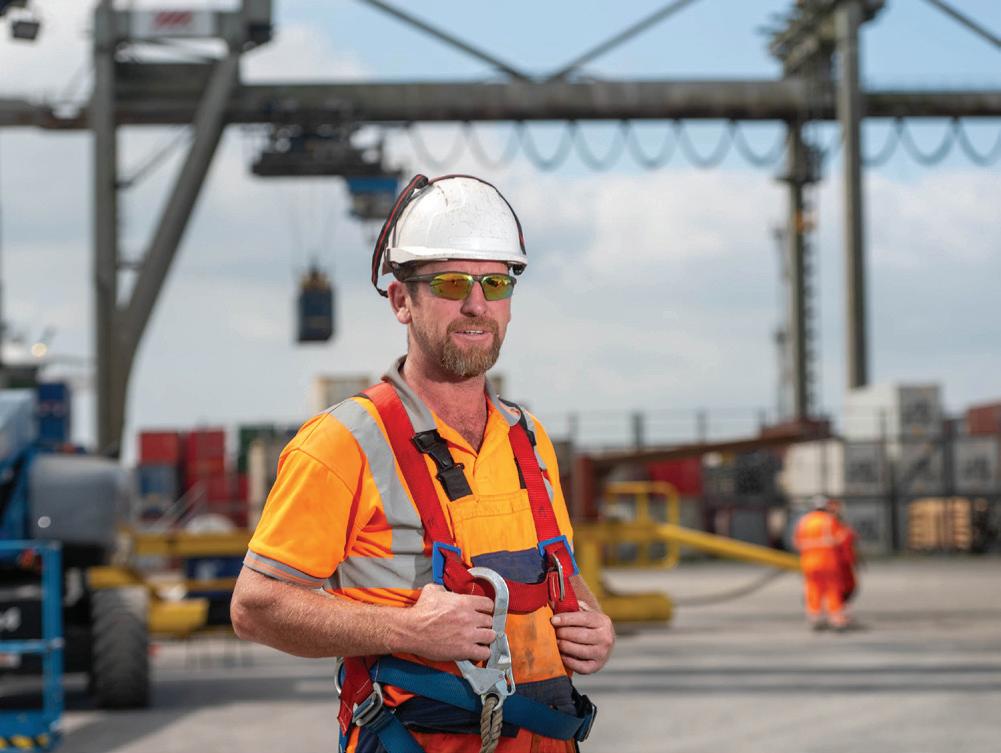


From Viking longboats to modern container ships, Waterford has always looked outward. Today, the Port continues that tradition – connecting the South East to international markets with efficient, reliable services and a focus on sustainability. The journey continues.







This year, Port of Waterford is celebrating an extraordinary milestone — its 1111th anniversary.
Established by the Vikings in 914 AD, the port laid the foundation for what would become Ireland’s oldest city. For over 800 years, the port was the economic heartbeat of Waterford and its surrounding region.
Today, the Port of Waterford has evolved to play a pivotal role in Ireland’s economic landscape, particularly in supporting the thriving agricultural sector of the South East. It serves as a strategic hub for the import of over one million tonnes of bulk ingredients annually, while also facilitating the export of highvalue dairy products — like butter, cheese and other refrigerated goods — produced by local farms and household-name brands. These exports depart twice weekly on container ships bound for Rotterdam, connecting Irish excellence to global markets. The port also supports the national drive in construction and infrastructure. It handles significant volumes of raw materials for cement production — processed on-site at a dedicated facility — as well as large shipments of steel essential for construction projects across the country.
A long-standing tradition of innovation underpins the port’s longevity. As a pioneer of containerisation in Ireland during the 1960s, the Port of Waterford’s container terminal remains a vital hub to this day. Continuous investment has enhanced its strategic connectivity, with direct access to
LOOKING TO THE FUTURE, THE PORT IS POISED TO BECOME A CENTRAL PLAYER IN IRELAND’S GREEN ENERGY TRANSITION. FOR THE PAST DECADE, IT HAS FACILITATED THE IMPORT OF COMPONENTS FOR ONSHORE WIND FARMS. NOW, WITH OFFSHORE WIND SET TO BECOME A MAJOR FORCE IN IRISH ENERGY, WATERFORD IS POSITIONING ITSELF AS A KEY
SUPPORT HUB FOR CONSTRUCTION SUPPORT, MAINTENANCE AND LOGISTICS.”

the M9 and M11 motorways and the distinction of being Ireland’s only port with rail connectivity directly into its facilities. Looking to the future, the port is poised to become a central player in Ireland’s green energy transition. For the past decade, it has facilitated the import of components for onshore wind farms. Now, with offshore wind set to become a major force in Irish energy, Waterford is positioning itself as a key support hub for construction support, maintenance, and logistics. The port’s credentials
in this area are already proven; it is currently involved in a substantial and unprecedented maintenance project of Ireland’s only offshore wind farm, the Arklow Bank. From its Viking roots to its role as a forwardlooking, green logistics engine, the Port of Waterford is a symbol of resilience, reinvention and regional pride. As it enters its second millennium, it is not just preserving a remarkable heritage; it is actively shaping a sustainable and prosperous future for the Southeast and the nation.






Ireland’s energy transition is at a crossroads. Ambitious targets have been set—but urgent action, investment, and delivery are essential to turn plans into progress
Ireland stands at a critical point in its energy journey, with legally binding net-zero goals for 2050 and 80% renewable electricity by 2030. While Ireland has shown leadership in setting targets, these remain largely aspirational.
Pinergy, in collaboration with Wood Mackenzie, recently published the ‘Energy Transition Outlook: Ireland’ report which tracks the country’s energy transition performance against our European neighbours and highlights the critical role that renewables will play in achieving these goals.
With growing energy demands, the study warns that current progress is insufficient to meet key energy targets and action is now required to address the widening investment and delivery gaps.
“Ireland’s energy transition is at a crossroads, and while our 80% renewable electricity target by 2030 is achievable, it’s under significant pressure,” said Philip Connor, Head of Energy Services at Pinergy.
“The time for deliberation is over. The next five years are critical, we must move from aspiration to tangible delivery to secure a cleaner, more resilient energy future for Ireland. A successful energy transition will not only reduce our carbon emissions and protect our environment, but it will also create new jobs, boost our economy, and enhance our energy security”.
Pinergy has identified several key areas where progress is under significant pressure:
The 80% renewable electricity target is stymied by project delivery bottlenecks, planning delays, supply chain constraints, and port infrastructure gaps. We are already projected to fall 4 GW short of the 5 GW offshore wind target for 2030.
Grid readiness is now the most urgent constraint on Ireland’s energy transition. We must accelerate grid upgrades and storage deployment to integrate rising volumes of wind and solar. According to the Pinergy Energy Transition Outlook, 4.7 GW of storage will be needed by 2030 to support variable renewables and reduce curtailment.

While EV adoption is on course to meet 2025 goals, Ireland is falling short of 2030 targets by 35%, requiring a 54% acceleration rate. Heat pump adoption is even further behind, at 68% behind 2030 targets, lagging behind other European countries. Barriers include upfront cost, installer capacity, and public awareness, indicating a growing need for expanded grants and simpler customer journeys.
The next five years will determine whether we deliver on our energy commitments or defer the cost to the next generation. The cost of delays is substantial. Ireland faces potential fines of up to €26 billion if EU climate targets are missed. Furthermore, an ageing national grid, impedes economic growth, leaving the domestic economy vulnerable. Delays represent missed opportunities for job creation, and foreign direct investment, while prolonging exposure to volatile global energy markets.
However, the energy transition also presents significant opportunities for Irish businesses in renewable energy development, grid infrastructure, energy storage, and electrification technologies. While Ireland’s energy transition is unstoppable, its success hinges on decisive coordination across government, regulators, and operators, coupled with strategic investment and accelerated delivery.
To download the full report visit www.pinergy.ie


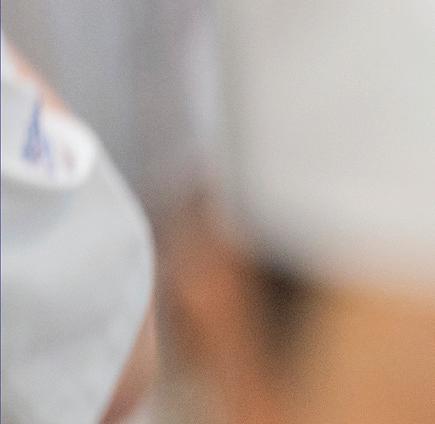










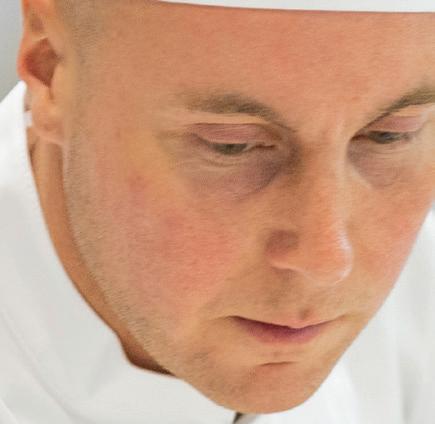




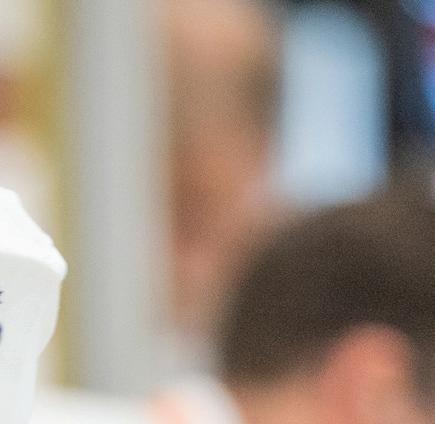






















Our chefs cra our menus primarily with locally sourced ingredients, and they are committed to reducing food waste and carbon emissions, with a target of 70% of all main meals being low carbon by 2030. Partner with Sodexo to support local suppliers, reduce carbon, and serve food with purpose.
Learn more via our QR code below.






Sustainability isn’t just a strategy at Sodexo Ireland – it’s the foundation of how we operate, deliver, and grow. As one of Ireland’s leading workplace experience and catering providers, we believe food can be a force for good – for our people, our clients, and our communities.
From serving nutritious meals that fuel productivity in offices, to championing local Irish suppliers and reducing food waste, Sodexo Ireland is leading the way when it comes to responsible sourcing and climate-conscious operations. Our approach to sustainable food supports our broader commitment to social impact, anchored in four key pillars: People, Planet, Places and Partners.
As an Origin Green-accredited organisation and proud holder of the Business Working Responsibly mark from Business in the Community Ireland, we walk the talk when it comes to ESG. By embedding sustainability into every step of our food services – from menu design to ingredient sourcing and waste management – we’re helping our clients reduce their own environmental footprint.
We work closely with small and medium-sized Irish enterprises across our supply chain, contributing positively to the local economy and fostering innovation.
Our commitment to supplier diversity ensures underrepresented and minority-owned businesses also have a seat at the table, driving long-term value for both our clients and our communities.
We know that good food powers great performance. That’s why we take a holistic, wellbeing-led approach to workplace dining. Our chefs design menus that are not only delicious, but also aligned with health and nutrition guidelines, helping employees make better choices every day. In partnership with clients, we promote plant-based and low-carbon menu options that appeal to changing tastes while supporting net zero ambitions. Every decision – from seasonal sourcing to portion control – is underpinned by our goal to halve food waste and reduce carbon emissions by 55 per cent by 2030 as part of our global Net Zero 2040 commitment.
This culture of care and innovation recently earned Sodexo Ireland the Company of the Year title at the Chambers Ireland Awards, and we were also named Overall Excellence in Facilities Management at the 2025 FM Awards. Commenting on the award, David Fox, Managing Director of Sodexo Ireland, said:
“We’re proud of the difference we make – not just in the services we deliver, but in how we deliver them. Sustainability, quality of life, and social impact are core to our DNA, and we’re committed to working with clients who share those values. This recognition reflects the passion and purpose of our people right across Ireland.”
To find out more about our sustainable food services and how we can support your workplace, visit ie.sodexo.com.


At Zurich Pensions, we believe in the power of performance.
It’s what turns good into great and it can provide peace of mind for the future.
It’s why we’ve won the Brokers Ireland Investment Excellence Award each year since 2014*, and why companies trust us with their employees’ needs.

To find out more about the Zurich Master Trust talk to your Zurich Broker Consultant or visit zurichcorporate.ie

*Awarded Investment Excellence in 2014, 2015, 2016, 2017, 2018, 2019, 2021, 2022, 2023 & 2024. No awards held in 2020.
Warning: Past performance is not a reliable guide to future performance.
Warning: The value of your investment may go down as well as up.

Warning: Benefits may be affected by changes in currency exchange rates.
Warning: If you invest in this product you may lose some or all of the money you invest.
Through consistent focus on helping customers achieve their financial goals, Zurich Life Assurance plc has almost doubled its market share in Ireland
Zurich Life Assurance
plc is one of Ireland’s largest Pension and Investment providers, employing over 700 employees.
Over the last decade Zurich has seen its market share almost double and has grown to become the second largest pension and investment provider in the Irish market. This growth has been achieved through a consistent focus on supporting and helping customers to achieve their financial goals, delivered through a programme of year-onyear incremental improvements across different strands of the business including product development, technology, marketing communications and investment management.
INNOVATION AT HEART
In an industry perceived as resisting change, Zurich consistently breaks the mould to deliver new and fresh approaches to its product development. Offering ‘easy access’ investment and savings products has helped to challenge the hold that traditional banks had on customers’ savings and deposits. This simple change, instigated by customer research, saw significantly more customers enter the savings and investment markets thereby giving customers the potential to generate better returns on their money.
Innovation and breaking the ‘it’s always done this way’ cycle is at the heart of Zurich’s operations, whether it’s developing new ‘Master Trust’ retirement solutions for corporate and SME businesses, listening to life insurance customers’ needs
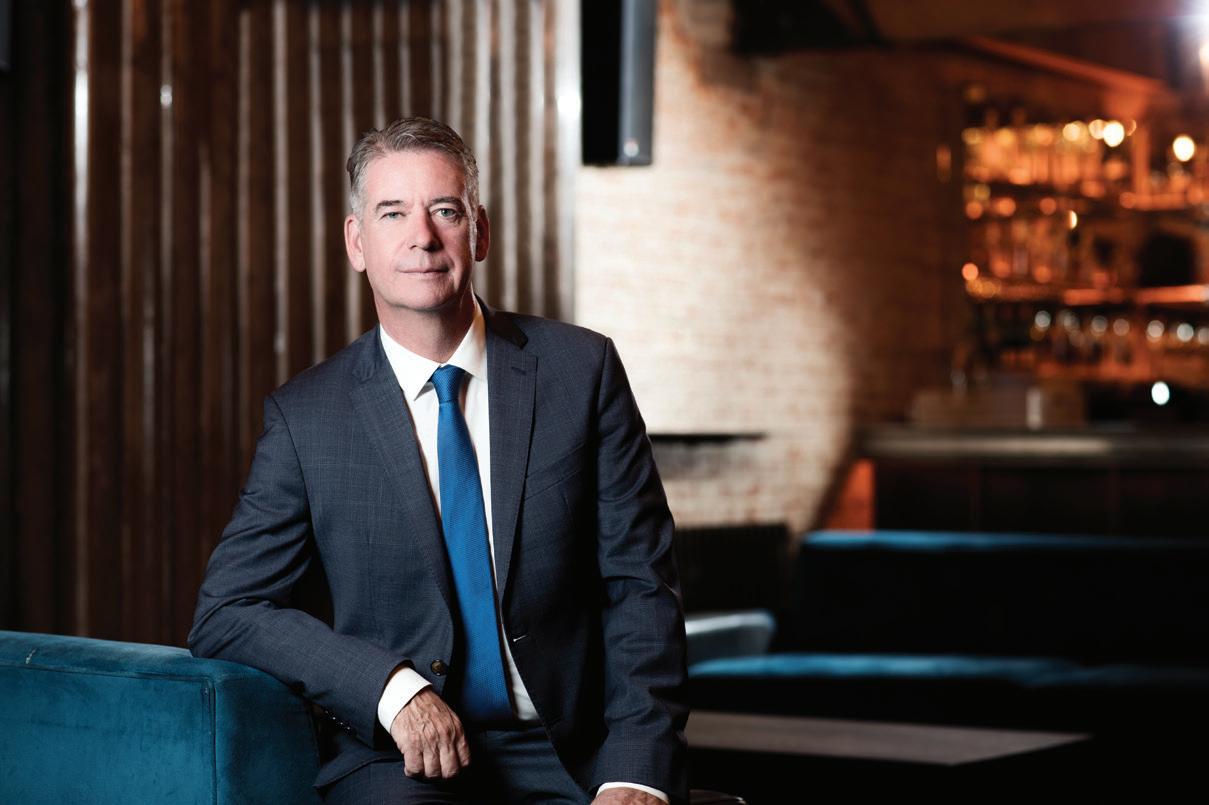
Joe Creegan, Head of Corporate Life & Pensions, Zurich
for immediate funeral support, or providing female focused cancer cover protection.
Technology and digitalisation are fundamental to the business success and over the years Zurich has consistently delivered online solutions, which it constructs in such a way that smaller advisory businesses it works with can benefit from. This agile approach to development has enabled Zurich to support many businesses who do not have the IT and marketing capacity of an organisation of Zurich’s scale. This resourcefulness has ensured that Zurich continues to build a strong reputation for product excellence while strengthening its relationship with distributors and customers. Zurich’s B2B strategy emphasises long-term strategic partnerships rather than a focus on short-term transactional wins. Likewise, when a person becomes a customer of
Zurich, they enter into a trusted relationship that could last for 40 years (or more) as they save, invest, and retire with Zurich.
As an investment manager, Zurich is conscious of the need to invest policyholder and shareholder funds responsibly. It also invests in communities, working with charitable and non-profit partners, and the Z Zurich Foundation. Education (Power2Progress), mental health (Tackle Your Feelings), health and wellbeing (Down Syndrome Ireland and Alzheimer Society of Ireland) and social innovation (Rethink Ireland), are some of the areas it focuses on.
Zurich in Ireland is part of the Zurich Insurance Group, which aspires to be one of the most responsible and impactful businesses in the world. As part of the Group Zurich in Ireland is also playing its part in achieving this goal, recognising the importance of building a brighter future for its customers, its people, and our planet.

DHL Group is set to invest €2 billion in DHL Health Logistics to boost globally integrated healthcare solutions by 2030

DHL Group has announced a strategic investment of €2 billion over the next five years to enhance its logistics capabilities in the life sciences and healthcare sector. This investment supports the Group’s “Strategy 2030” and reinforces DHL’s commitment to helping healthcare customers grow, innovate and serve patients more effectively worldwide. With 50% of the investment allocated to the Americas, 25% to Asia Pacific and 25% to the EMEA region, DHL is expanding its global footprint to deliver integrated, faster, more reliable and patient-centric logistics solutions wherever healthcare companies operate.
The investment will focus on enhancing high-quality infrastructure and technology across all logistics touchpoints – from storage, order fulfillment and distribution to global shipping and last-mile delivery –creating even more resilient, scalable and responsive supply chains for customers. A significant part of the investment will be allocated to establishing new crossdivisional GPD-certified Pharma Hubs for multi-temperature shipments lanes, expanding cold chain capacity in existing facilities, commissioning new temperature-
WE’RE BUILDING HIGH-QUALITY,
sciences and healthcare expertise under one unified umbrella. This creates a seamless, end-to-end experience for customers, simplifying the management of complex, cross-border supply chains with confidence, agility and high-quality service. The approach is designed to meet the needs of pharmaceutical, biopharma and medical customers who require agile, connected logistics solutions that go beyond traditional service lines.
“Similar to DHL Group’s purpose of ‘Connecting people, improving lives’, our strategic investment in life sciences and healthcare is driven by our customers’ mission: delivering essential, often lifesaving products to people in need,” said Oscar de Bok, CEO of DHL Supply Chain.

INTEGRATED LOGISTICS SOLUTIONS THAT ARE AS INNOVATIVE AND RELIABLE AS THE PRODUCTS OUR CUSTOMERS CREATE
controlled vehicles and enhancing both passive and active packaging solutions to ensure sustainable delivery.
As the demand grows in critical areas such as clinical trials, biopharma and cell and gene therapies, DHL is also investing in high-quality, specialised cooling infrastructure to accommodate low and ultra-low temperature ranges. Additionally, the Group will implement cutting-edge IT systems that provide end-to-end visibility, ensuring product integrity, regulatory compliance, and confidence for healthcare providers and their patients.
With its new sector brand DHL Health Logistics, the Group consolidates its life
“We’re building highquality, integrated logistics solutions that are as innovative and reliable as the products our customers create – ensuring that patients everywhere receive the right treatment, at the right time, with complete confidence.”
DHL Group has long been a trusted partner in life sciences and healthcare logistics, contributing over €5 billion in global revenue in 2024. With an additional €5 billion in projected incremental revenue by 2030, DHL Group is scaling its operations to match the fast-evolving needs of the industry and its end-users – healthcare professionals and patients alike.
Through this strategic investment, DHL Group is not only reinforcing its commitment to the life science and healthcare sector but also demonstrating a profound dedication to patient care by ensuring the efficient and reliable delivery of essential pharmaceutical products, clinical trials and cell and gene therapies. This approach positions DHL Group at the forefront of the industry, fully equipped to tackle challenges and seize opportunities in a rapidly transforming market.
Cash flow is the lifeblood of any business, enabling you to cover expenses and navigate unforeseen challenges that are particularly relevant in today’s economic uncertainty. Even profitable businesses can struggle to survive without adequate cash flow; successful businesses forecast to anticipate future needs and identify potential shortfalls.
Future-proofing your business by ensuring sufficient cash flow is key. Having access to a line of credit or an overdraft can be an important element of your working capital management, bridging the timing between paying for materials and receiving customer payments and ensuring you can manage any unexpected events or delays.
Lack of cash kills businesses, particularly in this current period of rising costs. Furthermore, you want your business to have the flexibility to seize growth opportunities. The ability to secure credit
Access to a line of credit keeps your cash flow continuous
from your bank as part of your business resilience or growth strategy can be key.
If you are having difficulty, Credit Review is here to help. We provide an independent appeal service for businesses who have had credit facilities refused, reduced, restructured/refinanced or withdrawn by AIB, BOI and PTSB for amounts up to €3m. We also operate a helpline – sometimes credit issues can be resolved without a formal appeal; something that is appreciated by both
Having difficulty getting a new business loan or restructuring your existing debt with your bank?
Established by the Minister for Finance, Credit Review is here to help.
Talk to the credit experts today on 0818 211 789 or visit creditreview.ie
banks and borrowers!
Our appeals process is flexible and responsive. Our credit experts will engage directly with you and provide comprehensive insights into the credit application/decline process.
For more information on our independent appeals process and information services, visit creditreview.ie to request a call back, or call the helpline directly on 0818 211789

SOLAS and Enterprise Ireland can help companies fast track their way to leadership excellence with targeted upskilling programmes
SOLAS is proud to announce that, since 2019, over 100,000 skills development opportunities have been availed of under Skills to Advance. Skills to Advance is a national upskilling and reskilling initiative that assists employers to develop new skills in their teams, improve processes and cost savings, and increase their competitiveness through highly subsidised training. This milestone highlights the critical role of Further Education and Training (FET) in developing the skills needed to meet the challenges facing Ireland’s business community. With global and national economic shifts, climate change, and advances in technology, local enterprises need to remain agile and adaptable.
Companies looking to drive growth and competitiveness in national and global markets require strong leadership and direction to help them overcome potential future obstacles, as well as seize new business opportunities. To help accelerate this, SOLAS, in partnership with Enterprise Ireland (EI), is now delivering a Leadership and Management Development programme to both EI
and Local Enterprise Office (LEO) client companies under Skills to Advance.
This upskilling programme is aimed at business owners, middle managers and supervisors, from businesses of all sizes, looking to develop their leadership and management skills. The programme is delivered locally by the 16 Education and Training Boards (ETBs) around Ireland. The course blends in-person and online learning and is scheduled to fit the operating needs of participating businesses.
To lay a strong foundation for leaders to futureproof their companies, the programme is designed to boost leadership skills in five key areas:
• Financial planning
• Strategic business planning
• Change management
• Team management
• Resilience and leadership style
Employees will receive in-depth training in cash flow, costing, budgeting and funding. Participants will also learn how to build a robust business strategy and how to lead teams to achieve organisational goals while navigating hybrid working, employee turnover,
and changing demands. The change management module delivers the skills needed to navigate organisational change and adapt to transforming business landscapes.
The upskilling programme is fully accredited and upon completion participants will receive an internationally recognised certificate in Leadership and Management from the Institute of Leadership and Management (ILM). Employees can choose to complete a single module, or a combination of modules for an ILM Level 3 certificate or Level 4 diploma (equivalent to a Level 5 or Level 6 on the National Framework of Qualifications).
Thanks to the Skills to Advance upskilling initiative, this programme is highly subsidised. Participating businesses can get a subsidy for up to 70 per cent of the course fee. The local ETB delivering the training will calculate the subsidies and advise companies on cost.
Companies can express interest in the Leadership and Management Development Programme by emailing skillstoadvance@solas.ie or contacting their local ETB offices today.
Carlow County Council launches countywide master composting initiative to tackle food waste; Meath County Council and Meta announce funding partnership to deliver STEAM skills; and a new €10m public pool is planned for Balbriggan in Fingal.
Plans unveiled for first phase of Cleeves Riverside Quarter in Limerick; community climate action projects funded across Cork; and contracts signed for M28 Cork to Ringaskiddy Motorway.
Sligo awarded over €370,000 to protect archaeological monuments; new Greenway planned for Sligo, Leitrim and Northern Counties; €1.39m approved for new waterfront park in Athlone; and Health and Wellbeing Information Boards installed across Mayo.
Active Cavan and Rural Recreation Plans launched; Monaghan County Council welcomes €8.4m investment towards RESTART project; Belfast city centre regeneration steps up a gear; and Rathmullan Pier in Donegal reopens after €4.5m refurbishment.








Meath County Council o icially opened three residential developments during several events in the county attended by Minister for Housing, Local Government and Heritage, James Browne TD. The developments, which cost approx €81.3m sees 231 new homes open in Navan (Farganstown), Clonee (Aylesbury), and Ashbourne (Millrace).
From left: Minister for Education and Youth, Helen McEntee TD; Minister of State for European A airs and Defence, Thomas Byrne TD; Minister for Housing, Local Government and Heritage, James Browne TD; Cathaoirleach of Meath County Council, Cllr Sharon Tolan; Chief Executive of Meath County Council, Kieran Kehoe; and Aisling Dempsey TD at Farganstown in Navan.
















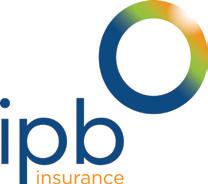
[ COUNTY CARLOW ]
Thanks to funding from the Waste Enforcement Lead Authorities under the Anti-Dumping Initiative, Carlow County Council is bringing a twopart Master Composting programme to Tidy Towns groups, allotments, residents associations, and community gardens across the county. This initiative will be led by Craig Benton, aka Dr Compost, founder of the first Master Composter programme in Seattle and co-founder of the EPA’s Stop Food Waste Programme in Ireland.
“Composting is one of the most powerful tools we have to reduce food waste and build healthy soil,” says Craig Benton, Composting Ireland. “This programme is about giving communities the knowledge and tools to take control of their organic waste and turn it into something valuable. I’m thrilled to be working with Carlow County Council to help make this happen.”
[ COUNTY MEATH ]

Meath County Council, in partnership with An Taisce and the National Transport Authority (NTA), officially opened a number of works under the Safe Routes to School initiative in Drumconrath, Co Meath. The project, which cost approx €310,000, was undertaken by the council’s Active Travel team to provide safer, healthier and more sustainable modes of travel for the pupils, parents and staff of St Peter and Paul’s National School (NS) and all residents of Drumconrath. Pictured, from left in front of a zebra crossing to link the Community Centre to the school environs, from left: a pupil of St Peter and Paul’s NS; Joanne Carroll, Principal of St Peter and Paul’s NS; Cllr Michael Gallagher (Kells Municipal District (MD)); Cllr Sarah Reilly, Cathaoirleach of the Kells MD; Andrew Bagnall, Programme Manager for Active Travel Investment in the NTA; Area Manager of the Kells MD and Meath County Council Deputy Chief Executive Dara McGowan; Susan Doorley, Infrastructure Officer for Louth, Meath, Kildare and Wicklow at An Taisce; and Mary O’Neill and Michael Gallagher Jr, Drumconrath Tidy Towns.
€28M+
to be spent on Kilkenny roads in 2025
Kilkenny County Council adopted its Roadworks Scheme for 2025, which outlines the programme of work to be delivered by the Roads Department this year at an overall investment of more than €28m. Funding to carry out these works is provided by Transport Infrastructure Ireland for national roads, and by the Department of Transport and Kilkenny County Council for regional and local roads.
Meath County Council will develop a model for STEAM Teams, which will be rolled out in 20 Co Meath national schools by the end of 2026, thanks to a donation of €299,000 from Meta. This pilot aims to bring together the whole school community of management, staff, parents and children to work collaboratively to co-create a future model for fun and sustainable engagement with STEAM (science, technology, engineering, arts and maths). This work builds on the model for parental involvement in STEAM developed by OurKidsCode, a research project based in Trinity College Dublin.
This donation from Meta, who have been part of the community in Meath since breaking ground on their Clonee Data Centre in 2016, enables the council to build on work already being delivered to support coding and other STEAM programmes in the county. In collaboration with the Department of Rural and Community Development, the council has been working with OurKidsCode to develop family coding clubs across Co Meath over the last two years, aimed at increasing the digital skills of children and parents alike. By inviting parents and children to work together in a fun and safe way, families are supported to develop projects that build coding, crafting and collaboration skills.
“This excellent initiative partners perfectly with the other previous STEAM and coding programmes in Meath, and I am very pleased in particular to see such a focus on family involvement,” says Cathaoirleach of Meath County Council Cllr Sharon Tolan. “Fostering such a collaborative spirit while increasing important digital skills will undoubtedly yield fantastic benefits for the children, parents and schools involved.”



Dublin Town has teamed up with Dublin City Council to bring a runway-inspired experience to the streets of the capital. Style in the City will take place over eight consecutive Saturdays in July and August, commencing July 5 on Henry Street from 1pm to 5pm and then rotating between Henry Street and Grafton Street each weekend, with fashion shows showcasing collections from local retailers, styling tips, beauty demos, makeovers and live DJs. “I am delighted to see Dublin City Council partner with Dublin Town and city businesses to give Dubliners the perfect excuse to shop and socialise in the city centre each weekend,” says Lord Mayor Emma Blain. For the full Summer in Dublin programme, visit Dublin.ie. Pictured: Bárbara Weschenfelder, Eileen Cardona and Grace O’Mahony on Dublin’s Millennium Bridge. Photo: Andres Poveda.
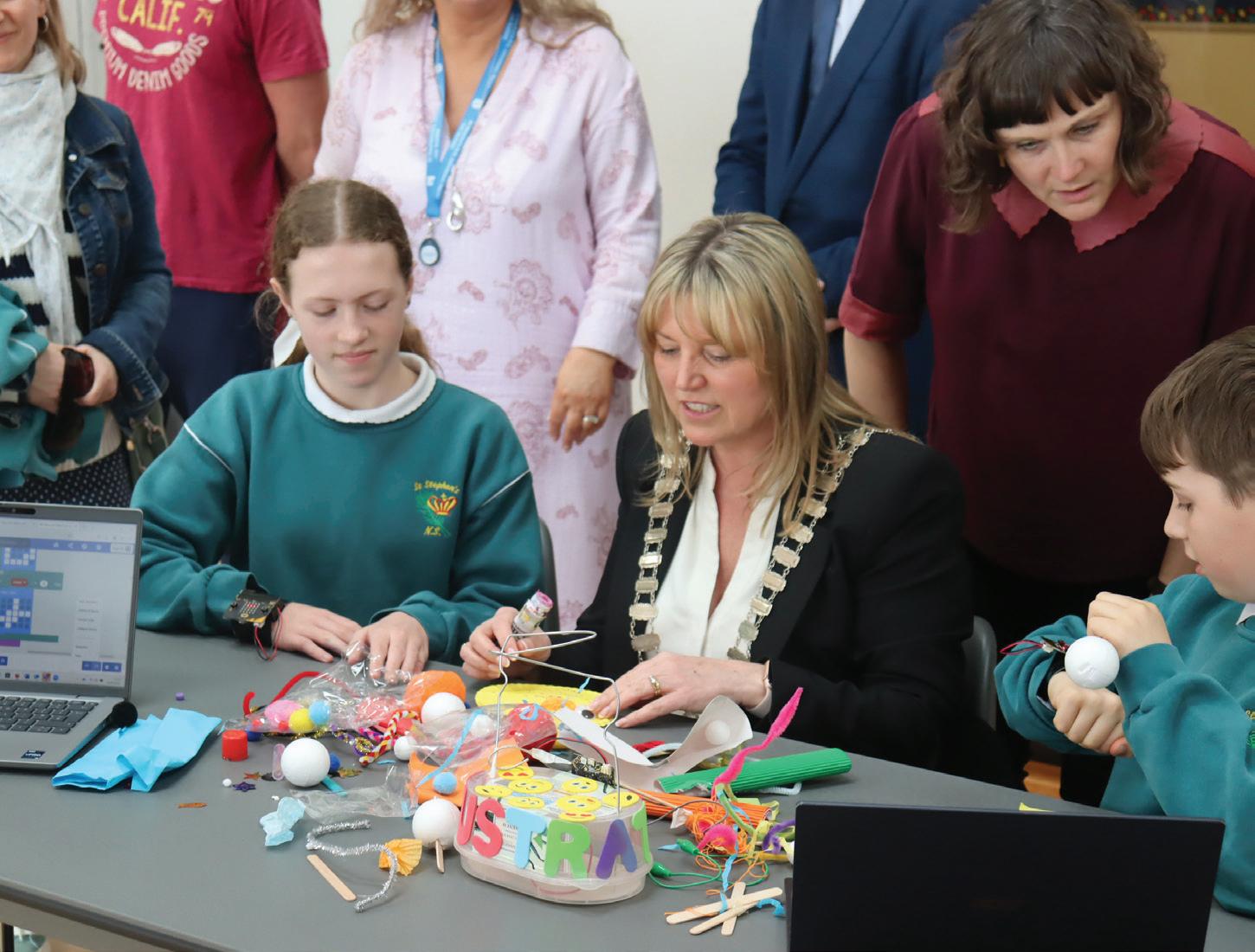
Fingal County Council announced that a new €10m public swimming pool is to be built in Balbriggan. Castlelands, one kilometre south of the town, has been chosen by the authority as the location of the six-lane, 25-metre pool. The project has moved to preliminary design and planning stages and is expected to be ready to go to planning by the end of this year. Subject to funding, construction could commence by the end of 2026.
The new facility will incorporate a changing village, reception area with café and a viewing gallery. It will be located south of the area’s Link Road, directly opposite the site of a proposed new school. An integrated design team led by UK-based company ReCreation has developed preliminary plans.
The provision of a public swimming pool was a key ask of the survey by Balbriggan.ie in 2019, aimed at shaping an order of priorities to transform the town. The findings subsequently shaped Fingal County Council’s ongoing €54-57m Our Balbriggan Rejuvenation Programme.
“Balbriggan is home to one of the youngest, fastest growing and most diverse populations in Ireland,” says Dr David Begg, Chairperson of the Our Balbriggan Leadership Group.
“This project is a symbol of the progress being made in Balbriggan – informed and shaped by the community – and which will provide a well-designed public facility for people to not only enjoy, but feel proud of.” [

[ COUNTY LIMERICK ]
Plans for the first phase of the regeneration of the 4.3-hectare Cleeves Riverside Quarter (CRQ) site in Limerick city centre have been unveiled to the public. Limerick Twenty Thirty hosted a two-day public consultation ahead of submitting the first phase CRQ ‘Residential and Public Realm Project’ planning application in September. The application includes the largest city centre residential planning application for some time in Limerick and, together with two subsequent phases, the wider CRQ project will amount to one of the most important investments for Limerick in the first half of the 21st century.
The first phase of the development comprises approx 230 homes, 270 purpose-built student rooms, 300sqm of commercial space, a crèche and significant public realm with an enriched landscape. The plans celebrate and connect the River Shannon and the on-site reservoir, as well as green spaces across the development. Connectivity and accessibility are core to the first phase plans. Phase 1 will also provide for temporary uses on the adjacent Shipyard Site and a flood resilient garden. Near-term works, starting before the end of the summer, will also see the stabilisation, consolidation and repair of the upper storey of the historic Flaxmill building.


The second phase will be the Technological University of the Shannon Campus, proposals for which are being advanced. The third and final phase of the project will see the full development of the adjacent Shipyard site.
“Cleeves Riverside Quarter is going to be a superb blend of old and new, of residential and commercial, of cultural and recreational space,” says Limerick Twenty Thirty CEO Enda Power. “When completed, it will be right up there with the very best mix-use city developments in Europe.”
[ COUNTY KERRY ]
Limerick City and County Council welcomes €605,378 in funding under the Community Recognition Fund 2024, which is aimed at supporting communities that have welcomed people arriving from Ukraine and other countries. Minister for Rural and Community Development and the Gaeltacht, Dara Calleary TD announced over €17m to deliver 212 community projects nationwide, including eight in Limerick.

The sod has officially been turned on the new €1.3m water sports facility at Fenit, Co Kerry. Developed by Fáilte Ireland in partnership with Kerry County Council, this outdoor tourism amenity aims to serve as a central hub for water-based activities and will provide year-round hot showers, changing rooms, toilets, secure storage, induction space, and equipment washdown areas. Accessibility and sustainability will be key focus points for the project, ensuring full wheelchair access and the installation of solar heating panels. This project is part of Fáilte Ireland’s Platforms for Growth Scheme, funded under the government’s Project Ireland 2040 strategy, and is one of 19 facilities to be developed across 13 counties under this scheme.

COUNTY CORK ]
Cork County Council announced that eleven community groups will share more than €240,000 in funding for climate action projects in their local area. The successful projects include a biodiversity haven in Charleville Park; converting an existing pathway to a cycleway in Macroom; a community water filling station and EV charging point in Kiskeam; and solar PV installations on community buildings across the county. The projects were selected as part of the Community Climate Action Programme for their capacity to engage communities and deliver measurable climate benefits, supporting national and local climate targets.
“These projects are a wonderful example of what local communities can achieve with the right support,” says Mayor of the County of Cork, Cllr Joe Carroll. “They reflect the energy, commitment and innovation of communities across Cork County who are playing their part in taking climate action.”
“Cork County Council is committed to



Csupporting meaningful climate action and sustainability initiatives,” adds Chief Executive of Cork County Council, Moira Murrell. “These projects along with the projects funded under the previous call demonstrate what can be achieved through partnership with local communities. We will continue to work closely with local communities to drive forward our shared climate goals.”
The Community Climate Action Programme, developed and funded by the Department of the Environment, Climate and Communications, aims to address climate change at a local level and support and empower communities to shape and build low carbon, sustainable communities to contribute to national climate and energy targets.
ork County Council has signed the contract for the construction of the M28 Cork to Ringaskiddy Motorway, marking a key milestone in the delivery of the nationally significant infrastructure project. The €206m construction contract is part of the total project budget of €456m, which includes funding for land costs, advance works, and relief roads. BAM will deliver the construction of 11km of mainline motorway from the Bloomfield Interchange to Barnahely. The works are due to get underway in the coming months and are expected to be completed by summer 2028.

The motorway, funded by the Department of Transport through Transport Infrastructure Ireland, will directly support the ongoing development of the Port of Cork’s deep-water facilities in Ringaskiddy, facilitating the relocation of port activities from Tivoli. Once complete, it will also serve to enhance accessibility to a major employment hub and facilitate safer, more e icient transport for both commercial and commuter tra ic.
The signing ceremony at Cork County Hall was attended by Taoiseach Micheál Martin, Minister for Transport Darragh O’Brien, and Minister of State with responsibility for Rural Transport Jerry Buttimer, underscoring the government’s continued commitment to supporting key transport infrastructure in the region. Works are underway on the 1.5km Ringaskiddy Relief Road, being delivered by Sorensen Civil Engineering, to support interim access to the port area.
“The M28 is a key component of Project Ireland 2040,” says Taoiseach Micheál Martin. “It will strengthen Ireland’s integration with European ports and trade corridors, supporting national competitiveness and connectivity.”

Minister for Housing, Local Government and Heritage, James Browne TD, and Minister of State for Nature, Heritage and Biodiversity, Christopher O’Sullivan TD announced the 122 projects that will be awarded €7.5m in funding under the 2025 Community Monuments Fund. These grants help owners and custodians of archaeological monuments to safeguard them into the future by enabling conservation works and repairs as well as building resilience through protecting monuments from the effects of extreme weather and climate change.
“The importance of our archaeological heritage cannot be overstated and this fund has a very real and profound impact on the custodians and communities in our cities, villages, towns and countryside,” says Minister Browne.
“Since this fund was first introduced in 2020, it has invested €25.5m in communities nationwide,” adds Minister of State O’Sullivan.

Five Sligo projects are to benefit under CMF 2025: Aghanagh Church, Ballinafad (€100,000 for phased conservation works); Moygara Castle (€100,000 for emergency stabilisation works to the southwest tower); Enniscrone Castle (€118,671 for phase 2 conservation works to complete essential structural repairs); Court Abbey, Lavagh (€30,000 for the preparation of a conservation management plan for the site); Killaspugbrone Church and Graveyard (€22,263 for the preparation of a conservation management plan for the site).
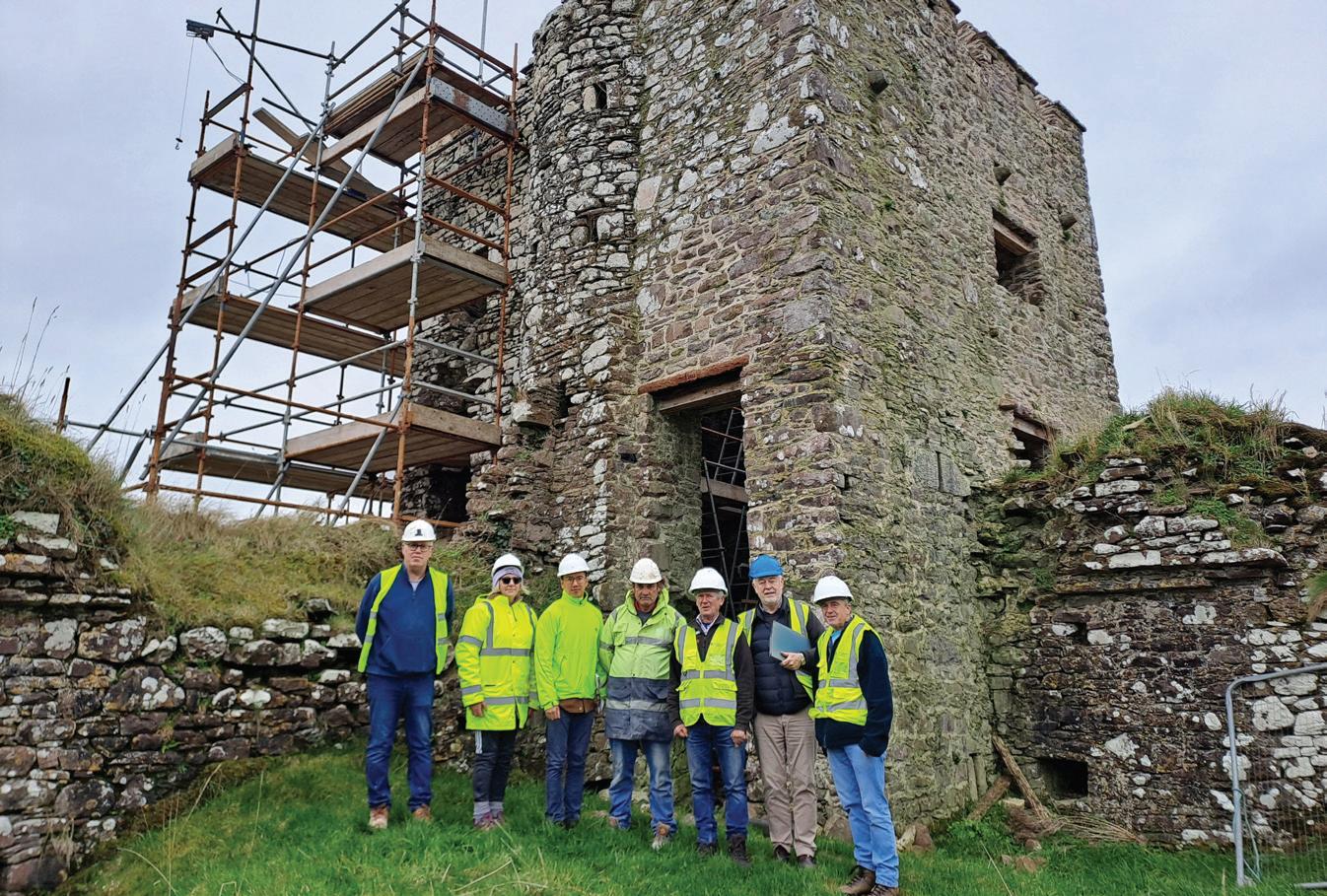
Seven projects in six communities in Leitrim received funding of €709,015 under the Community Recognition Fund as part of a wider national funding announcement of €17m to deliver 212 projects across the country. The successful Leitrim projects are located in Ballinamore, Carrick-on-Shannon, Dromahair, Drumshanbo, Manorhamilton and Mohill. Leitrim County Council has previously been successful in securing over €1.562m in funding under phase 1 and phase 2 of the Community Recognition Fund.
Leitrim County Council, in partnership with Sligo County Council, Cavan County Council, Fermanagh & Omagh District Council, under the auspices of Transport Infrastructure Ireland and the Department for Infrastructure are developing the Sligo, Leitrim, Northern Counties Railway Greenway. This project is to provide a Greenway from Sligo Town to Enniskillen, Co Fermanagh, passing through Carraroe, Ballysadare, Collooney, Ballintogher, Dromahair, Manorhamilton, Glenfarne, Blacklion, Belcoo and Letterbreen.

[ COUNTY ROSCOMMON ]
Funding of €1.39m has been approved for the development of an ambitious new waterfront park at Hodson Bay, Athlone. The project is being managed by Roscommon County Council in partnership with Waterways Ireland. The funding will support the development of the multifaceted project on the Hodson Bay waterfront area through design, environmental evaluation, economic analysis and a planning consent phase. Subject to planning consent being secured, Roscommon County Council and Waterways Ireland will investigate all funding opportunities to progress the project elements to construction, the initial high level estimated value of which is €30m. The organisations are providing combined match funding of €0.32m with the balance of €1.07m funding provided by Fáilte Ireland under the EU Just Transition Fund Regenerative Tourism and Placemaking Scheme (2023–2026).
The proposed development comprises four main elements, namely the promenade development, design of the marina development and to improve
[ COUNTY MAYO ]

and extend the existing marina to be capable of hosting approximately 50 new berths. The plan also makes provision for enhanced facilities for water activities such as boating and swimming and allows for a revised access strategy for the redeveloped Hodson Bay area to promote sustainable and inclusive use, creating a link at Hodson Bay with the proposed new Lough Ree Greenway. Civic Engineers Ltd have been appointed as lead consultants on the project.
Mayo County Council, in collaboration with Mental Health Ireland, is launching a new series of Health and Wellbeing Information Boards across community spaces throughout the county. Designed to promote positive mental health and improve access to supports, the boards will be located in venues such as community centres, family resource centres, art centres and sport clubs. Each board provides local and national mental health and wellbeing supports, along with wellbeing advice based on Mental Health Ireland’s “Five Ways to Wellbeing”. QR codes will link users to further digital resources and self-help tools. This initiative aims to make mental health information more visible and accessible, encouraging communities to engage with support services in familiar, everyday settings.
Joanne Grehan, Director of Services for Mayo County Council says, “These boards are more than signage, they are visible,
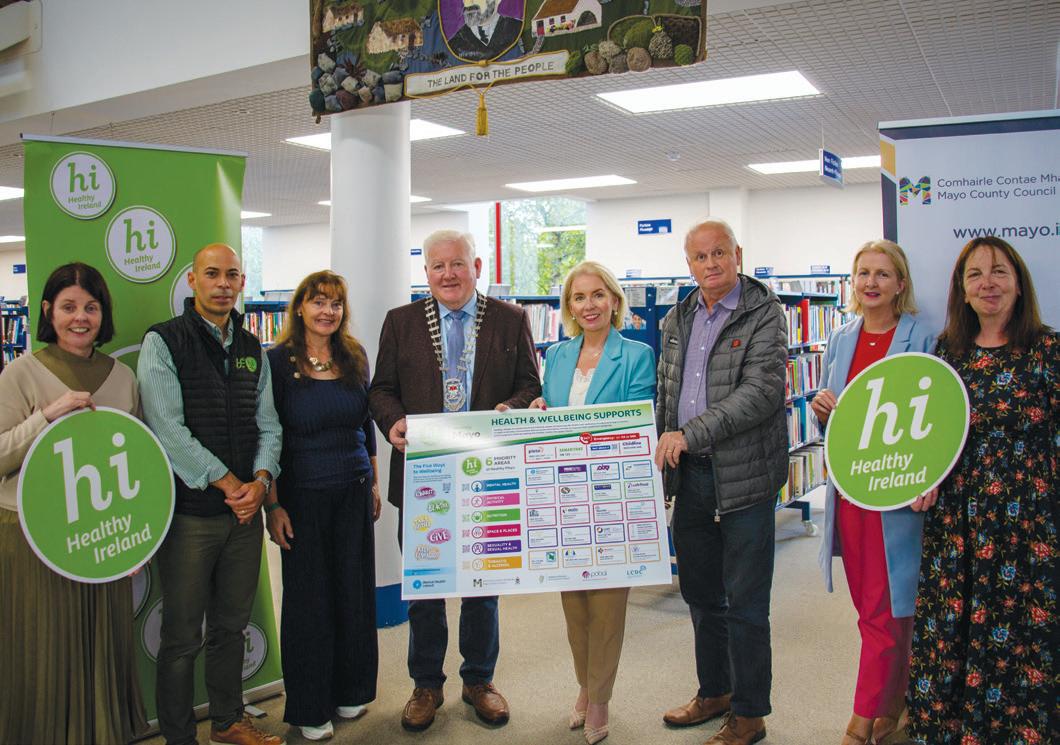
everyday reminders that support is available and that mental health and wellbeing matters.”
Teresa Keane, Mental Health Ireland Development Officer for Mayo and Roscommon adds, “Working alongside Mayo County Council and with community support, we designed these boards to be inclusive, accessible, and genuinely helpful to everyone.”

COUNTY CAVAN ]

Cavan County Council has launched two important new documents charting the future development of sports, recreation and activity in the county. Cathaoirleach of Cavan County Council Cllr TP O’Reilly was joined by fellow elected members, council staff, and key stakeholders in the sporting and active recreation sectors to launch the Cavan Outdoor Recreation Plan 2025–2030 and Active Cavan – A Local Sports Plan for Cavan 2025–2030 – a national pilot programme with three other local authorities, which sets out an ambitious but achievable vision: that every person in Cavan has the opportunity to be more active, more often. The plan is guided by three strategic themes that will drive the Cavan Local Sports Plan efforts: Active People and Communities, Active Spaces and Places, and Active Communications and Partnerships.
“What makes this plan truly unique is that it is a whole-of-council approach, meaning that sections from planning to housing, climate action to community development, will all have a role in promoting an ‘Active Cavan,’” says Cavan County Council Director of Services Brendan Jennings.
Cavan’s Outdoor Recreation Plan was also launched and has been developed in accordance with the national outdoor recreation strategy, Embracing Ireland’s Outdoors 2023–2027, and adopts a collaborative, cross-sector approach, bringing together stakeholders to ensure the sustainable development and management of outdoor recreation.
Monaghan County Council welcomes the investment of €8.4m towards the RESTART project (an acronym for Rural Economic & Social Transformation And Resilience Transition Together) under Investment Area 4.2 – Rural Regeneration and Social Inclusion – of the PEACEPLUS programme, managed by the Special EU Programmes Body. The project will see significant strategic investment in the towns of Newtownbutler, Clones and Belturbet.

Plans to boost Belfast city centre regeneration have stepped up a gear, thanks to Belfast City Council securing investment from the Department for Infrastructure and Department for Communities. The Department for Infrastructure has invested £600k in the council’s Under the Bridges project and Sailortown Bridge, as well as £500k to support the rollout of e-bikes in the Belfast Bikes network through Greenways and Active Travel Enabling funding.
The council’s Under The Bridges project in partnership with Belfast Harbour is set to enhance connectivity between the city centre and the Sailortown/City Quays area; introducing new public realm, active travel infrastructure and developing underutilised spaces under the M3 bridges for innovative outdoor leisure uses, following consultation with community representatives and local stakeholders. The funding will also develop the planned Sailortown-Queen’s Island Bridge to RIBA Stage 2 – the Concept Design phase where the architectural team develops initial ideas and concepts for the project.
Subject to capital funding being secured, an iconic cross harbour cycle and walking swing bridge will complete the Harbour Loop and provide important connections between Sailortown and north Belfast to Queen’s Island, as well as an active travel connection to the newly completed York Street Train Station.
These projects will help to achieve the Belfast Waterfront Framework’s vision of a connected, vibrant corridor linking to and with key destinations, neighbourhood communities and the city centre by offering safe and green public spaces to socialise, infrastructure for active travel and exercise, improved connectivity and easier access to jobs and services.


Rathmullan Pier was officially reopened by Minister of State at the Department of Tourism, Culture, Arts, Gaeltacht, Sport and Media, Charlie McConalogue TD together with Cathaoirleach of Donegal County Council, Cllr Niamh Kennedy. This major capital refurbishment project was delivered over a nine-month period at a cost of over €4.5m.
Rathmullan Pier is located on the west of Lough Swilly. The pierhead, which was constructed in 1957, is accessed by a 120-metre-long viaduct built in 1934. A condition report confirmed that the pier and particularly the approach viaduct section needed repair. The Department of Agriculture, Food and the Marine (DAFM) under the Brexit Adjustment Local Authority Marine Infrastructure Scheme, provided €0.6m towards the works and further funding of €3.7m was provided by the DAFM, co-funded by Donegal County Council.

Pier following major capital refurbishment works. Photo: Clive Wasson. Charlie McConalogue TD, Minister of State at the Department of Arts, Media, Communications, Culture and Sport cuts the ribbon at the reopening of the Rathmullan Pier in the presence of Cllr Niamh Kennedy, Cathaoirleach of Donegal County Council, Cllr Gerry McMonagle, Mayor of Letterkenny-Milford MD, elected members, council officials, department officials and guests. Photo: Clive Wasson.

Donegal County Council (DCC) completed the contract for the design and build of nine social houses at Radharc na Trá Breige (Phase 4), Malin, Co Donegal. Moneydarragh Construction Ltd will undertake this development with an expected completion date of July 2026. This development will provide high-quality, sustainable homes for nine families in the extended Malin area. Front row, from left: Patsy Lafferty (Director of Service, Housing Corporate and Cultural Services, DCC), John G McLaughlin (Chief Executive, DCC), Contractor Barry Folan (Moneydarragh Construction Ltd), Cllr Niamh Kennedy (Cathaoirleach, DCC). Standing, from left: Cllr Paul Canning, Cllr Joy Beard, Cllr Albert Doherty, Cllr Fionán Bradley, Cllr Jack Murray, Cllr Ali Farren, Cllr Martin McDermott, Peter Bridgeman (Corner Stone Architecture), Peter Boyle (John McCay Architect), Eamonn Mahon, Project Manager (A/Senior Executive Engineer, DCC), Seosamh Mahon (Clerk of Works, DCC), Claire Burke (Senior Executive Architect, DCC), Michael Hannigan (Corner Stone Architecture), and Una Cresswell (Area Manager, DCC).
















































Suppo r t loc a l to l i ft us a l l




All Ri s e All Ri s e


Ch am p i o n G r ee n . i e







































The back-to-school rush is on – time to reset, refocus and dive into the latest reads on leadership, AI and innovation to stay sharp and ahead in today’s fast-evolving business landscape

By Neri Karra Sillaman

by Will Guidara
Will Guidara was just 26 when he took over Eleven Madison Park, a struggling two-star brasserie. Eleven years later, it was crowned the best restaurant in the world. The secret? Bold reinvention, seamless front-and-backof-house collaboration and unforgettable, over-the-top hospitality. From organising a surprise sledding trip for guests to transforming a dining room into a beach escape, Guidara redefined what service could be. His approach extended to sta culture, promoting thoughtful feedback, deep empathy and a sense of ownership at every level. Today, any business can embrace hospitality – and turn everyday moments into extraordinary ones. Through vivid stories and lessons from industry icons, Guidara shows how to find the magic, purpose and joy in our work.


Audio books to make the most of the M50 backlog

BY PARMY OLSEN, READ BY LISA FLANAGAN
In November 2022, everything changed. Just weeks after ChatGPT launched, it became clear that both our lives and careers were entering uncharted territory. Supremacy, from award-winning journalist Parmy Olson, is the gripping account of the high-stakes race to dominate generative AI. At the centre are tech giants Microsoft and Google, locked in fierce competition to leverage OpenAI and DeepMind – two pioneering AI labs – for unprecedented power and profit. With a cast of outsized figures including Elon Musk, Sam Altman, Demis Hassabis, Larry Page, Sergey Brin and Peter Thiel, Supremacy explores a world driven by ambition, secrecy and speed. It’s a story of breakneck innovation and the most transformative invention in human history – where warnings are ignored, risks sidelined and the race to control the future takes precedence over everything else.
An inspiring exploration of immigrant entrepreneurship and the transformative power of purpose-driven business. Drawing from her own journey – from refugee to successful luxury brand founder – Sillaman highlights stories of individuals who turned adversity into opportunity. The book o ers practical insights on resilience, innovation and ethical leadership, emphasising the value of staying true to one’s values in business. With a unique blend of personal narrative and strategic advice, Pioneers is both a celebration of entrepreneurial spirit and a guide for anyone seeking to create meaningful impact through their work, especially in a rapidly changing global economy.

NEXUS
By Yuval Noah Harari
Harari delves into the intersection of technology, power and the future of humanity. Building on themes from Sapiens and Homo Deus, Harari explores how AI, biotechnology and data-driven systems are reshaping global power structures. With his signature clarity, he examines the moral, political and existential questions these changes provoke, urging readers to confront the choices that will define the next chapter of human history.

THE COURAGE TO BE DISLIKED
By Ichiro Kishimi and Fumitake Koga
Framed as a dialogue between a philosopher and a young man, this book challenges beliefs about happiness, trauma and approval. It empowers readers to let go of past limitations, embrace responsibility and live authentically – without needing validation from others. A bold, thought-provoking guide to self-acceptance and growth.






















Your business could thrive with real transformation. We’ll help it take flight.
Transformation is essential for success, and we commit to making it happen. Our team can change your business for the better; leveraging our deep industry knowledge and hands-on expertise. From design right through to delivery, it’s work that’s connected, practical and built to deliver.
There’s More to Grant Thornton. Talk to our Consulting Team today.